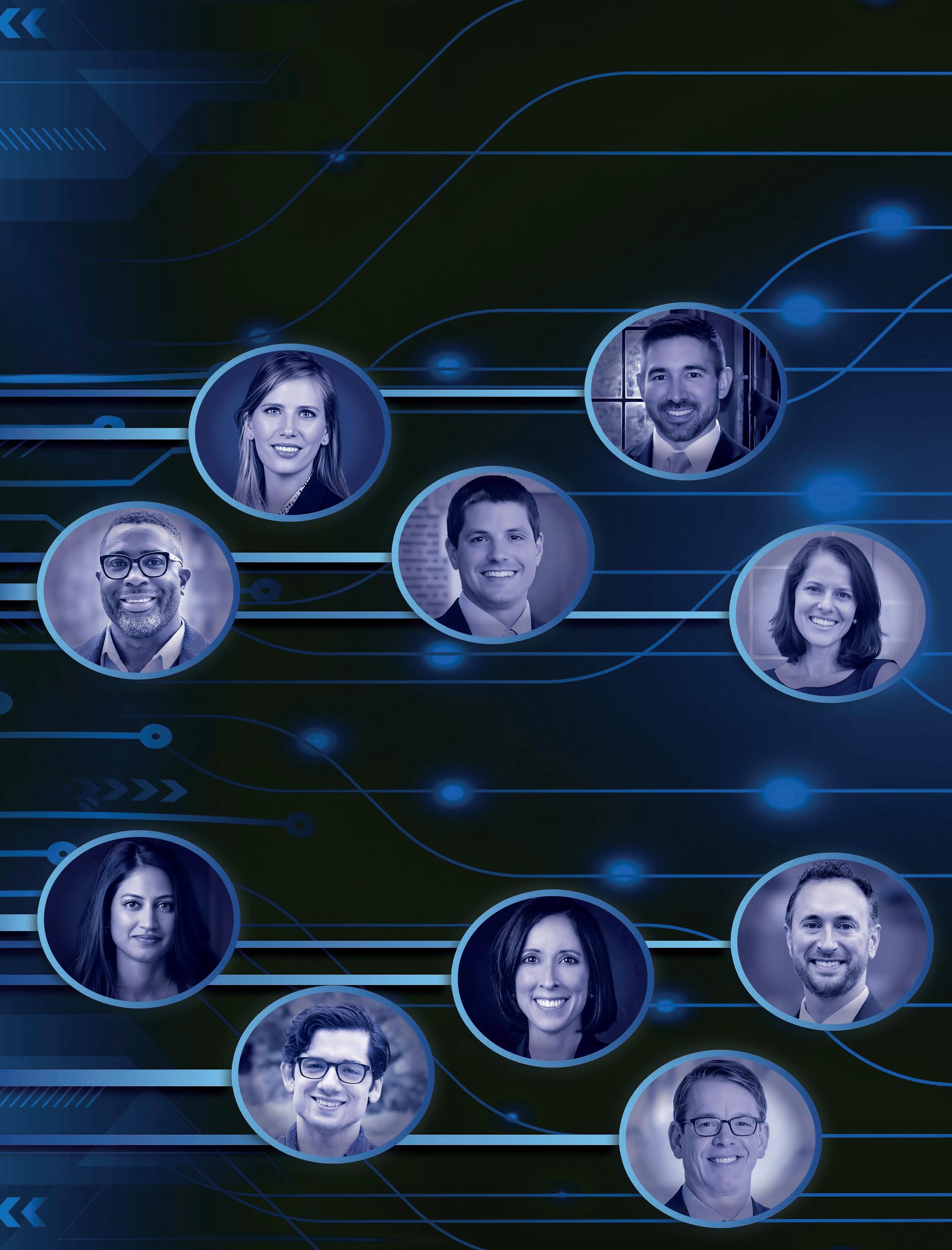

Educating FOR THE future
A Supreme Anniversary
On the 75th anniversary of GW Law’s flagship Van Vleck Moot Court Competition, we take a deep dive into the innerworkings and rich history of the esteemed oral advocacy contest that prepares legal leaders of the future.
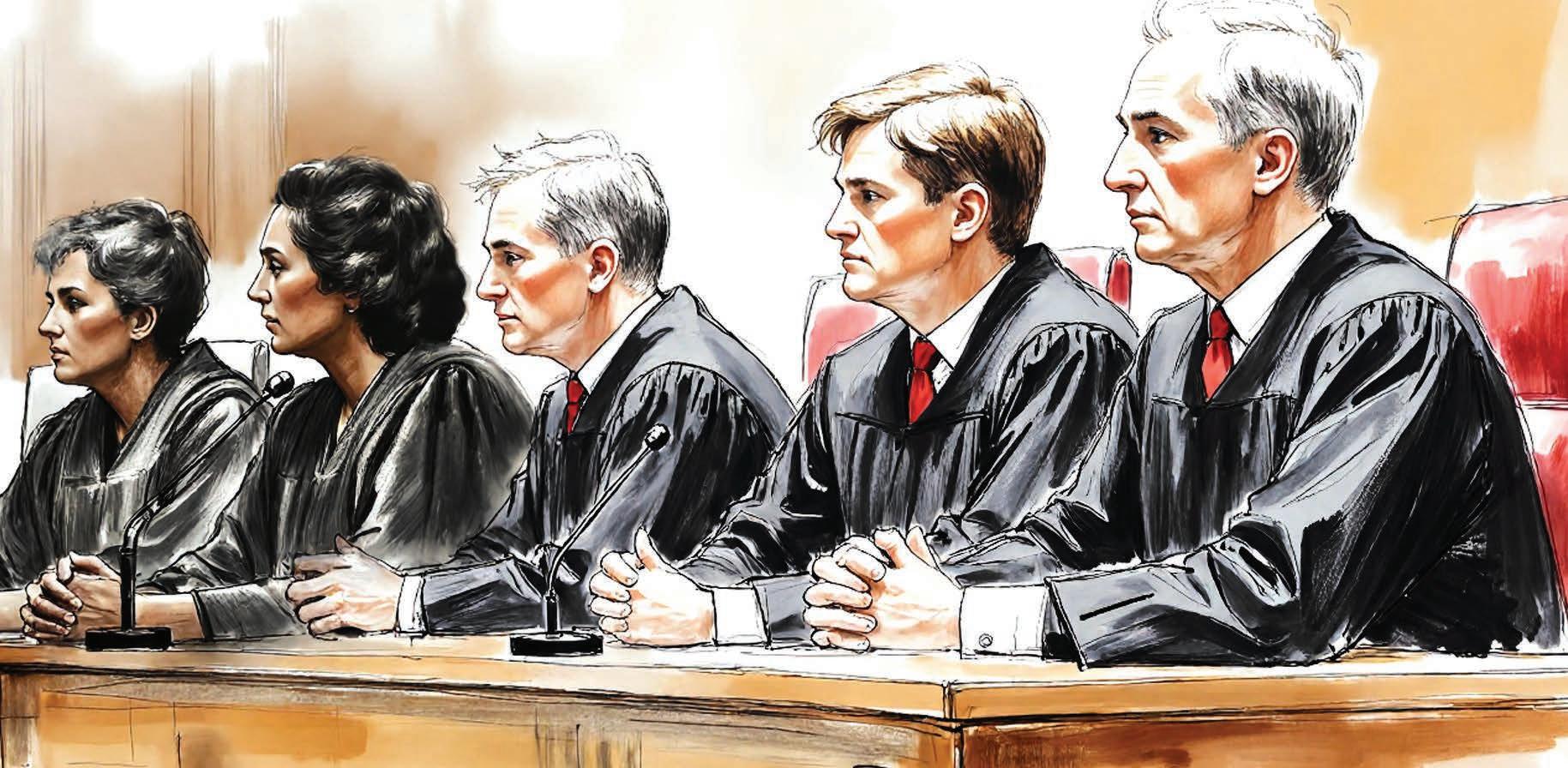
16
Educating for the Future
We introduce you to four trailblazing faculty members who are advancing scholarship, learning, and advocacy in emerging areas of the law— making a powerful impact both inside and outside the classroom.
22
Defining the Environmental Law Era
GW’s renowned Environmental and Energy Law program is expanding— bringing on accomplished new faculty members, shaping environmental law and policy, and elevating student scholarship.

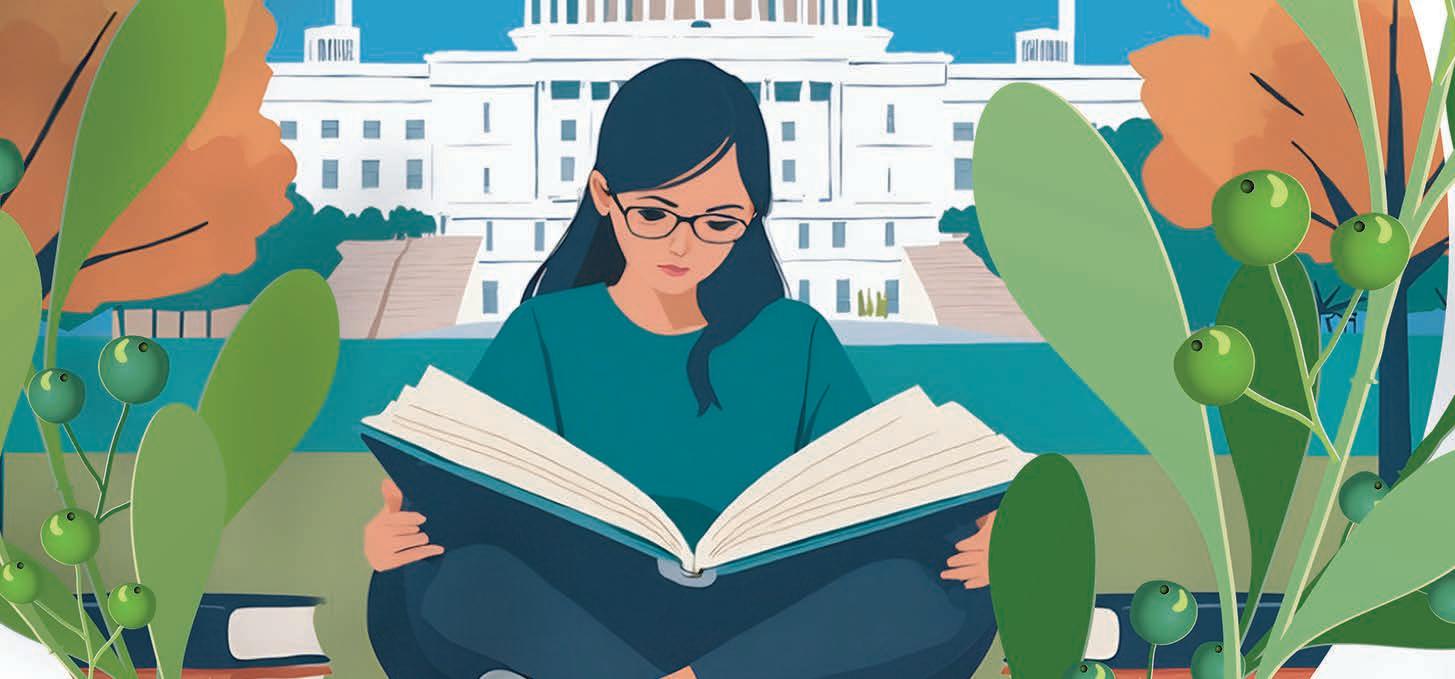
28
Double Impact
Meet some of the generous donors behind the success of GW Law’s 2025 Scholarship Endowment Match who are increasing access to the transformative power of a GW Law education and creating lasting legacies.

EDITOR IN CHIEF:
Jamie L. Freedman, MA ‘96
CONTRIBUTING WRITERS:
Mary A. Dempsey
Sarah Kellogg
Libby Stanford
Greg Varner
DEAN AND HAROLD H. GREENE
PROFESSOR OF LAW:
Dayna Bowen Matthew
DIRECTOR OF STRATEGIC COMMUNICATIONS AND MARKETING:
Rachel Hamrick
DESIGN & PRODUCTION:
Moiré Marketing Partners
CONTRIBUTING PHOTOGRAPHERS:
William Atkins
Abdul El-Tayef
Abby Greenawalt
RJ Paulk
GW LAW magazine was awarded the MarCom Platinum award from the Association of Marketing & Communication Professionals.

GW LAW MAGAZINE IS PUBLISHED BY: The George Washington University Law School 2000 H Street, N.W. Washington, D.C. 20052 202-994-6288 magazine@law.gwu.edu
PLEASE SEND CHANGE OF ADDRESS NOTICES TO: 2000 H Street Burns 203 Washington, D.C. 20052 or alumni@law.gwu.edu
GW Law magazine is mailed free of charge to GW Law alumni and friends of the university. Opinions expressed in these pages are those of the individuals and do not necessarily reflect official positions of the university. The George Washington University is an equal opportunity/affirmative action institution.
© 2025 The George Washington University

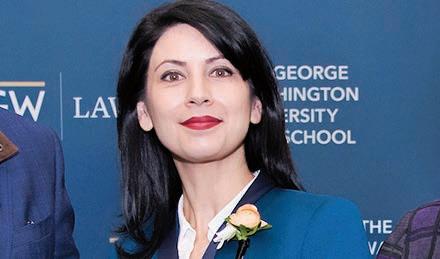

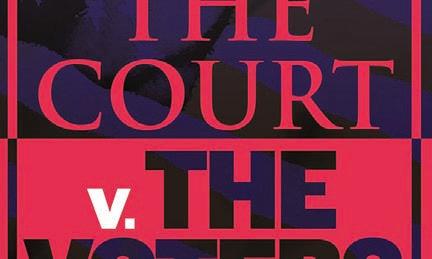
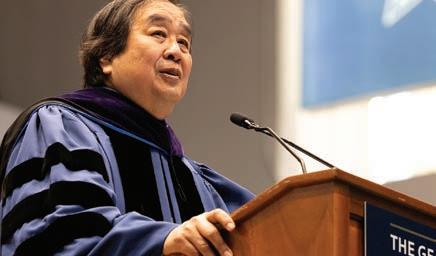
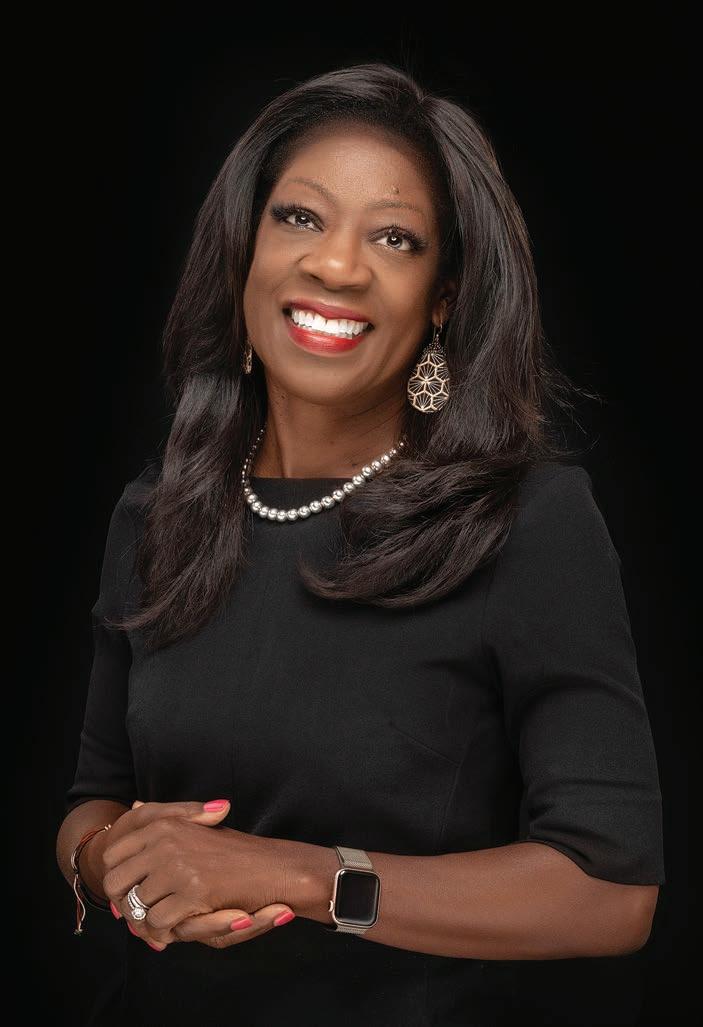
WE HAVE SEEN RAPID CHANGES IN RECENT MONTHS IN THE LAW, LEGAL EDUCATION, AND THE ENTIRE LEGAL LANDSCAPE.
A MESSAGE FROM THE DEAN
EDUCATING FOR THE FUTURE
DEAR FRIENDS OF GW LAW,
THE THEME OF OUR SUMMER 2025 EDITION OF GW LAW MAGAZINE IS “Educating for the Future.” From the exciting new scholars on our cover who are joining our faculty this fall, to our unparalleled scholarly leadership in emerging disciplines, our law school is poised and ready to equip students for the future with a sharp focus on excellence, innovation, and impact.
The future of legal practice and education is dynamic. We have seen rapid changes in recent months in the law, legal education, and the entire legal landscape. We are working to prepare GW Law students to continue to thrive in the face of these changes. For example, our faculty and staff are innovating to help them understand and use artificial intelligence, compete in shifting global markets, and adjust to an evolving political environment.
As of early June, President Donald Trump had issued 157 executive orders since taking office in January, resulting in at least 328 lawsuits against his administration, with new challenges being filed daily. These present some of the many ways in which the ground beneath us is shifting, but the GW Law community remains at the center of emerging areas of the law, influencing the top issues of the day and preparing the legal leaders of the future.
In this issue, “Educating for the Future” takes a close look at four groundbreaking faculty members on the frontlines of emerging disciplines who are making a powerful impact on the future of the law both inside and outside the classroom.
“A Supreme Anniversary” shines a bright spotlight on GW Law’s flagship Van Vleck Constitutional Law Moot Court Competition, which celebrated its 75th anniversary this year with U.S. Supreme Court Justice Ketanji Brown Jackson on the bench. One of the most esteemed and enduring moot court competitions in the country, Van Vleck prepares students at the highest levels for thriving legal careers.
In “Defining the Environmental Law Era,” we update you on the exciting growth of our Environmental and Energy Law program. As our world grapples with environmental changes, GW Law faculty and students are at the forefront of the conversation, shaping how the legal profession addresses some of the most controversial and challenging issues of our day.
I hope you leave this issue energized for the future of GW Law. Enjoy the magazine, and please keep in touch.
SINCERELY,

DAYNA BOWEN MATTHEW Dean and Harold H. Greene Professor of Law
SHAPIRO SYMPOSIUM
Environmental Impact of Foreign Investment law briefs
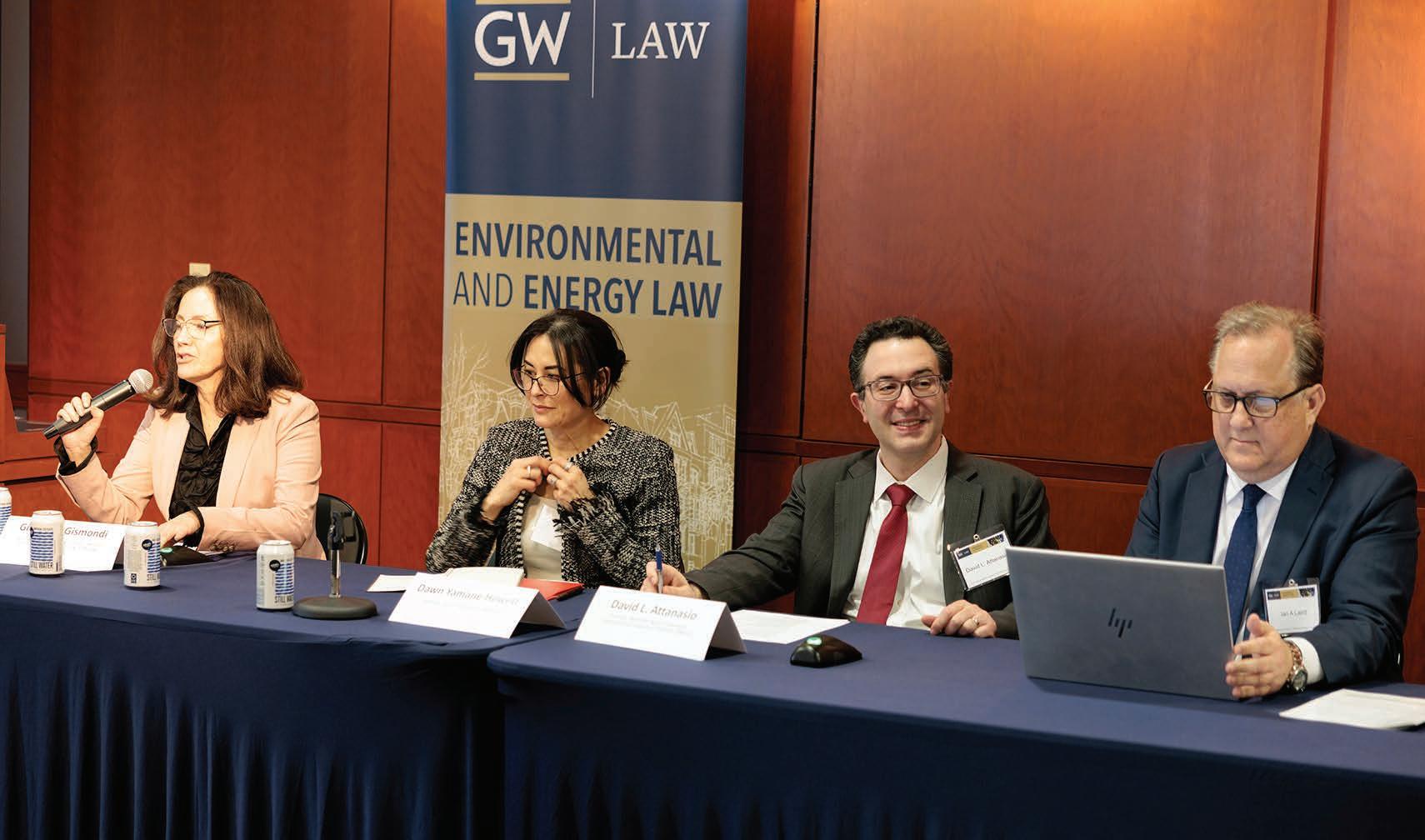
LEGAL EXPERTS FROM ACROSS THE globe took part in GW Law’s annual J.B. and Maurice C. Shapiro Environmental Law Symposium, which focused on foreign investment’s impact on the environment.
The March 20 symposium, titled “Foreign Investment and the Environment: Local Communities, Human Rights, and Dispute Resolution,” featured a keynote lecture by S. James Anaya, the University Distinguished Professor and Nicholas Doman Professor of International Law at the University of Colorado Law School.
Four panels explored a range of investment-related issues, including indigenous rights, cultural heritage, corporate social responsibility, international investment law, access to environmental information, and international projects with multiple stakeholders.
Also discussed were emerging trends that seek to integrate environmental values into arbitration between states and foreign investors and the complex relationship
between environmental regulation and international investment arbitration.
“This year’s Shapiro Symposium featured leading experts from around the nation and the world to address the intersection of foreign investment, human rights, and environmental protection in the context of arbitration between foreign investors and host states,” said Assistant Dean for Environmental Law Studies Randall Abate. “The event was a tremendous success.”
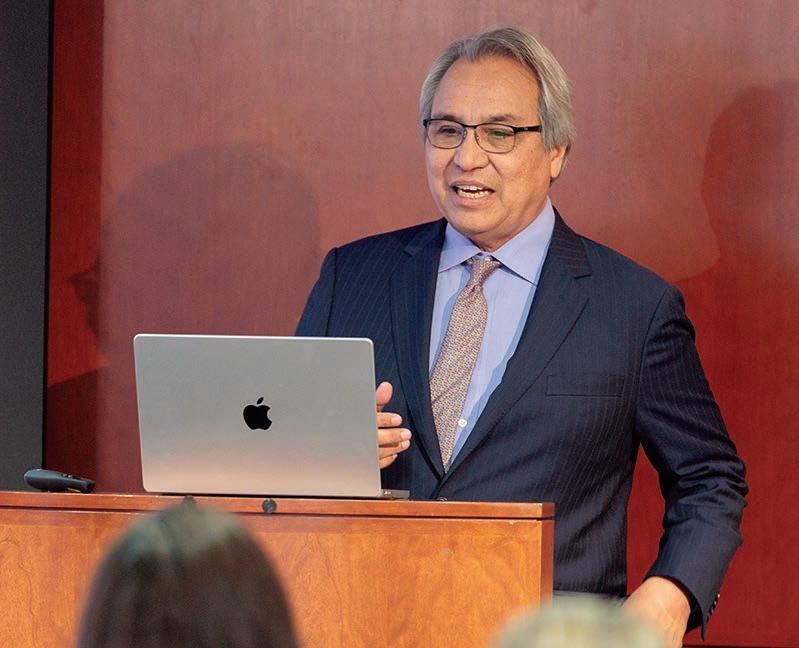
GW JOURNAL LAUNCHES ANNUAL SYMPOSIUM ON AI AND SURVEILLANCE
AN IMPRESSIVE LINE-UP OF scholars from across the country came together with GW Law professors Daniel Solove, Kate Weisburd, Spencer Overton, Alicia Solow-Niederman, and Dean Dayna Bowen Matthew at a symposium to examine the future of AI and surveillance. The event was organized by the George Washington Journal of Law & Technology (GW JOLT), the flagship student-run technology journal at GW Law.
“This year’s symposium … could not be timelier,” said Dean Matthew. “Surveillance is occurring in our society on an unprecedented scale. Data about our activities are collected when we use social media, interact with chatbots, visit websites, or even walk in public spaces. Governments and private organizations are leveraging advances in AI technologies to use this data to make predictions and decisions that can affect our privacy, livelihood, and even our freedom.”
SURVEILLANCE IS OCCURRING IN OUR SOCIETY ON AN UNPRECEDENTED SCALE. DATA ABOUT OUR ACTIVITIES ARE COLLECTED WHEN WE USE SOCIAL MEDIA, INTERACT WITH CHATBOTS, VISIT WEBSITES, OR EVEN WALK IN PUBLIC SPACES.
– Dean Dayna Bowen Matthew
The Feb. 21 gathering, the inaugural symposium in what is planned to be an annual event, looked into critical issues shaping the current and future landscape of AI law, legal scholarship, and public policy. Attendees joined three panel sessions: The Challenges of AI, Mass Surveillance, and Searches and Other Criminal Law Impacts.
GW JOLT is an independent, online publication of legal scholarship. It is affiliated with the GW Center for Law and Technology, a center of excellence in education and thought leadership focused on intellectual property, privacy, AI, and technology law.
Giovanna Gismondi (left) moderated the dispute resolution panel featuring expert panelists (l to r) Dawn Yamane Hewett, David Attanasio, and Ian Laird.
Keynote speaker S. James Anaya
Cybersecurity Law Program Ranked Best in Country
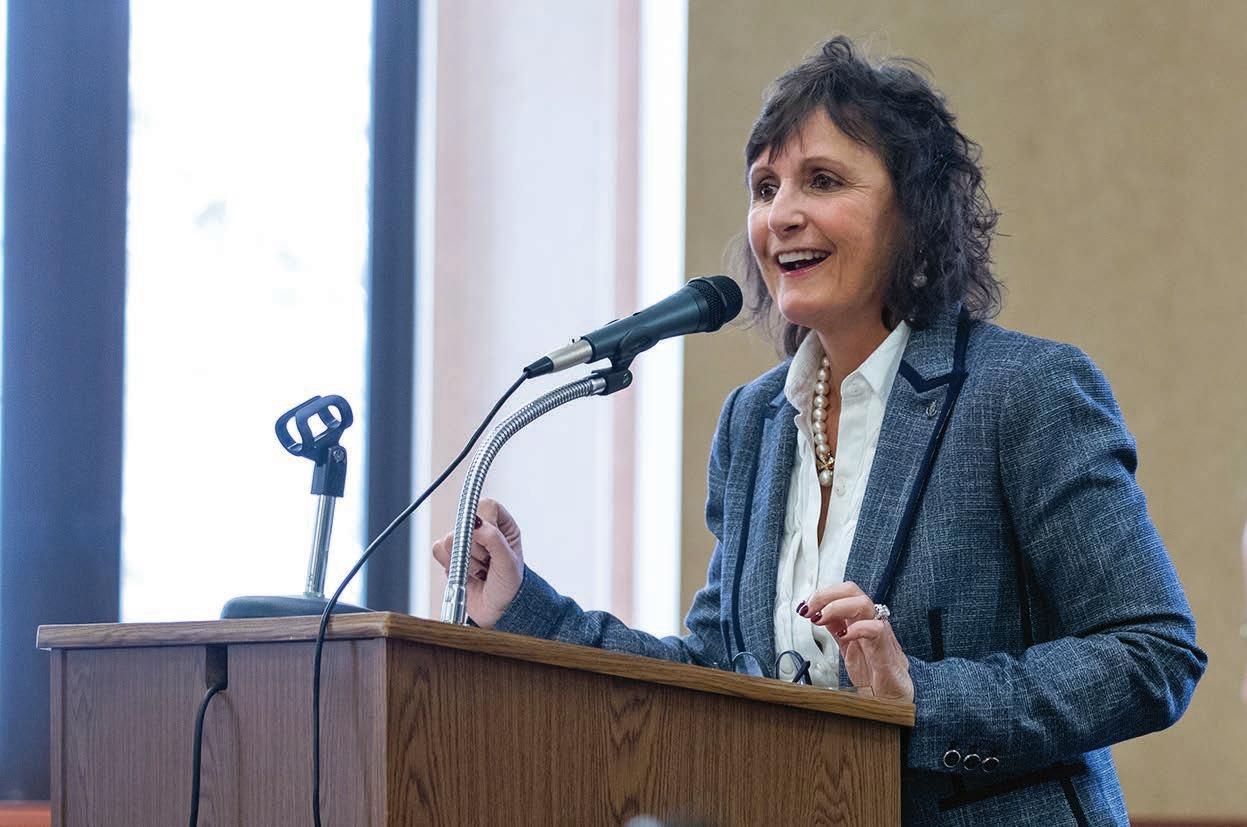
Associate Dean Lisa Schenck directs GW Law’s cutting-edge National Security and Cybersecurity LLM program.
GW LAW’S NATIONAL SECURITY and Cybersecurity Law LLM Program was ranked the number one cybersecurity law program in the country for 2025 by Cybersecurity Guide. The program, directed by Associate Dean Lisa Schenck, addresses critical issues in the rapidly expanding field and is taught by scholars and practitioners at the vanguard of national security and cybersecurity law.
IN AN ERA MARKED BY UNPRECEDENTED CYBER THREATS AND EVOLVING NATIONAL SECURITY RISKS, THE LEGAL EXPERTISE STUDENTS DEVELOP THROUGH THIS PROGRAM IS INDISPENSABLE.
– Lisa Schenck
“We are very pleased by our ranking in the influential Cybersecurity Guide,” said Schenck. “In an era marked by unprecedented cyber threats and evolving national security risks, the legal expertise students develop through this program is indispensable. Combining cutting-edge course offerings, highly qualified students, superb teaching, and pathbreaking academic research and scholarship truly makes our National Security and Cybersecurity LLM degree an exceptional program.”
GW Law is one of 25 law schools that offer the National Security and Cybersecurity Law LLM Program, according to Cybersecurity Guide. The program offers more than 20 courses, including courses on artificial intelligence law and policy, information privacy law, internet law, telecommunications, foreign access to U.S. technology, counterintelligence, intelligence, disinformation, blockchain, and consumer privacy and
data protection, among others. Students learn from a distinguished faculty who have made significant contributions to research in the areas of cybersecurity, national security, intelligence law, and technology law.
“The program is especially beneficial for LLM students who are already working as attorneys,” said Liz Boggs, LLM ’24, and an alumna of the program. Boggs is approaching 15 years of active-duty service in the Army Jag Corps in which she currently serves in a national security legal advisory position. She attended the cybersecurity program part time, allowing her to report to work during the day and take classes at night.
“As a career military attorney, I can emphatically say that GW Law’s National Security Law and Cybersecurity program provided me with a solid education basis to understand the ever-evolving nature of
MARY ANNE FRANKS INSTALLED AS ENDOWED PROFESSOR
MARY ANNE FRANKS WAS FORMALLY installed as the inaugural Eugene L. and Barbara A. Bernard Professor of Intellectual Property, Technology and Civil Rights Law on April 24. An internationally recognized expert at the intersection of free speech, civil rights, and technology, Franks joined the GW Law faculty in 2023
“Dr. Franks says that she was drawn to GW because it ‘sees itself as a place where people can learn and do good in the world and try to revolutionize the law to make it fairer and more just,” said Dean Dayna Bowen Matthew, who served as the emcee at the investiture ceremony. “Her scholarship and expertise are central to the public discourse and represent the very best of what independent higher education contributes to society.”
Franks is the president and legislative and tech policy director of the Cyber Civil Rights Initiative (CCRI), a nonprofit formed to combat online abuse and
cybersecurity and the need for continuous legal and regulatory adaptation to keep pace,” Boggs said.
The LLM degree is one of several cybersecurity law degree programs offered at GW Law. The law school also has a National Security and Cybersecurity Law Master of Studies in Law (MSL)—a law degree for non-JD degree holders who have practical experience in the fields of national security, law enforcement, defense, cybersecurity, or intelligence. GW Law also offers an MSL in Government Procurement and Cybersecurity Law. LLM and MSL students may complete their degree programs online, on campus, or a combination of both while taking courses as full-time or part-time students. GW Law also offers a concentration in National Security and Cybersecurity Law for JD students.
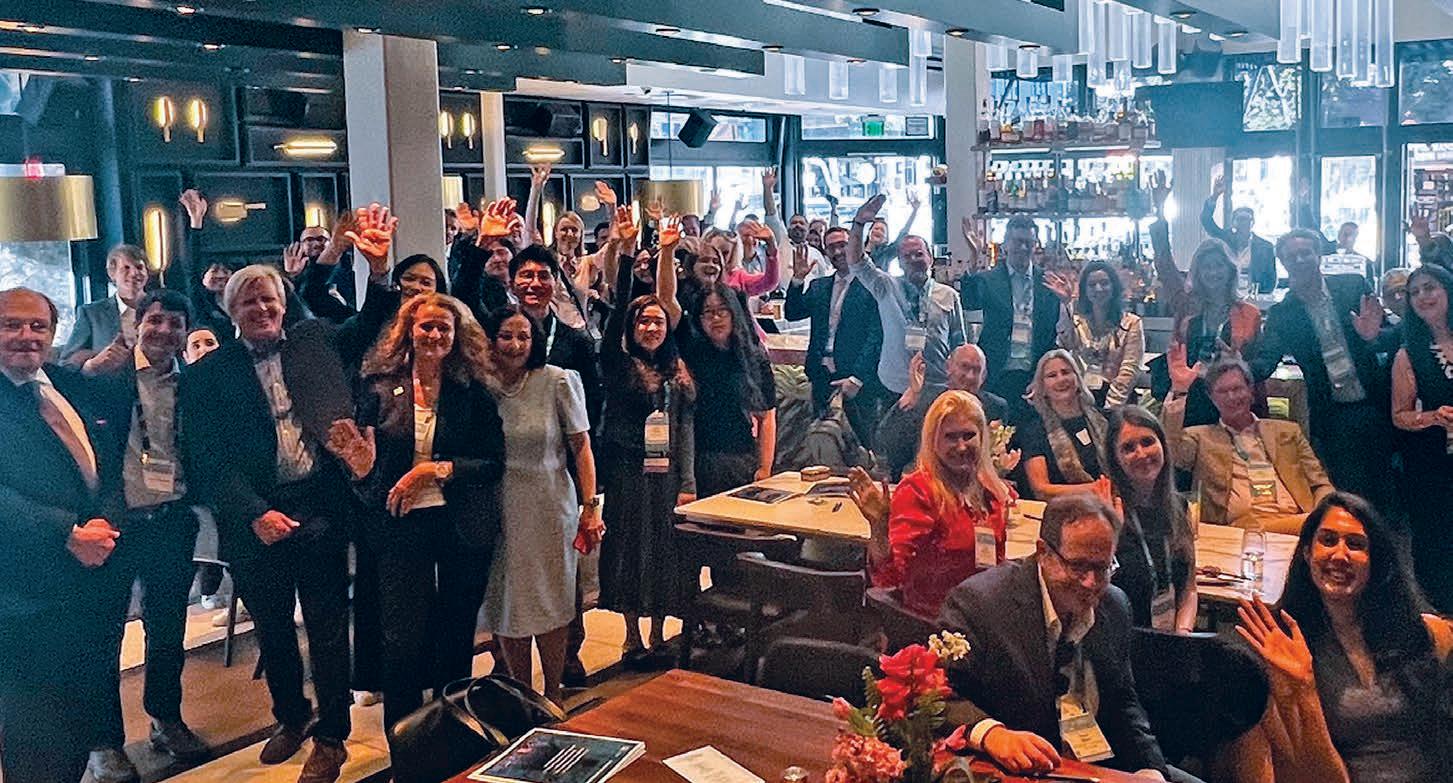
GW LAW IN SAN DIEGO
Ninety graduates of GW Law and the Munich Intellectual Property Center (MIPLC) gathered for an alumni reception at the International Trademark Association (INTA) Annual Meeting in San Diego in May. The memorable event was hosted by Professor Robert Brauneis, Assistant Dean Shehernaz Joshi, and Advancement’s Toby Davidow, and co-sponsored by Zhongyi (Jonnie) Huang, JD ‘19, Francisco Valverde, MIPLC ‘16, and Tianqin (Sean) Zhao, JD ‘23
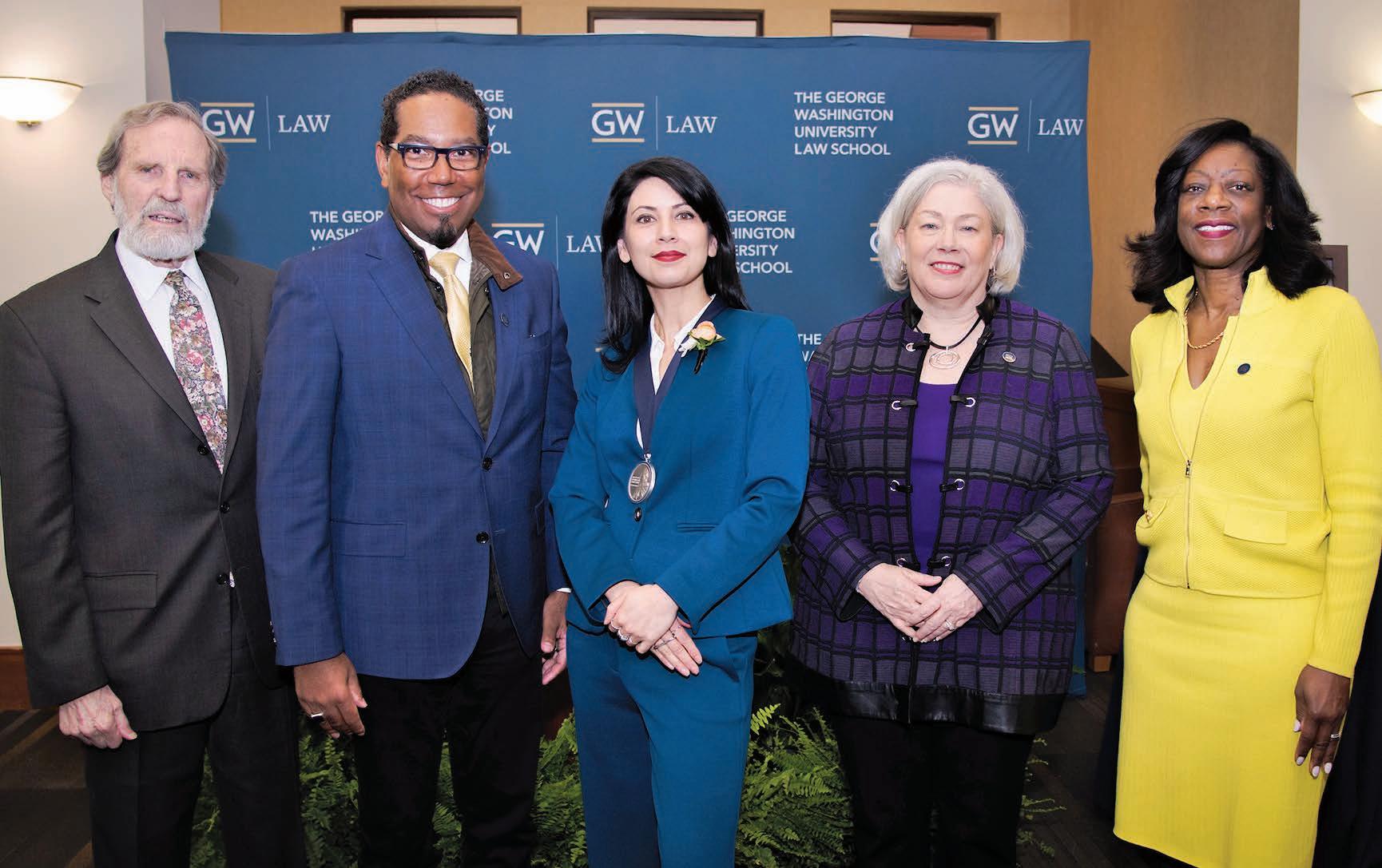
discrimination. In 2013, Matthew noted, Franks drafted the first model criminal statute on the nonconsensual distribution of intimate imagery, sometimes called revenge porn. Her model has served as a template for multiple state and federal laws.
An award-winning author, Franks’ first book, Cult of the Constitution: Our Deadly Devotion to Guns and Free Speech (Stanford University Press, 2019), received
several honors. Her second book, Fearless Speech (Bold Type Books, 2024), published late last year, has also received praise and was even recommended by Prince Harry in an interview with New York Times columnist Andrew Ross Sorkin.
In addition to her books, Franks is the author of more than 50 highly cited law review articles, as well as many book chapters and essays. She has testified before Congress six times and was a
THE CEREMONY WAS A REMINDER OF THE POWER OF HIGHER EDUCATION TO HONOR THE PAST, TO ELEVATE THE PRESENT, AND TO SHAPE A BETTER FUTURE.
– Ellen M. Granberg
lead author on 12 amicus briefs in the past decade, four of them to the U.S. Supreme Court.
GW President Ellen M. Granberg said the ceremony was “a reminder of the power of higher education to honor the past, to elevate the present, and to shape a better future.”
“Today’s installation comes at a moment when the world is acutely aware of the importance of legal education and the rule of law, of having trusted experts, rigorous research and institutions that respond to the challenges of our time with integrity and insight,” Granberg said. “The focus of this endowed professorship reflects that urgency.”
The endowed professorship was made possible by a generous bequest from the estate of Eugene L. Bernard, a 1951 graduate of GW Law, and his wife, Barbara.
Celebrating Professor Mary Anne Franks (center) at her installation ceremony are (l to r) Associate Dean Alan B. Morrison, Provost Christopher A. Bracey, President Ellen M. Granberg, and Dean Dayna Bowen Matthew.
GW LAW STUDENTATTORNEYS TRY FEDERAL CASE
GW
Murphy Addresses United Nations on Genocide Prevention
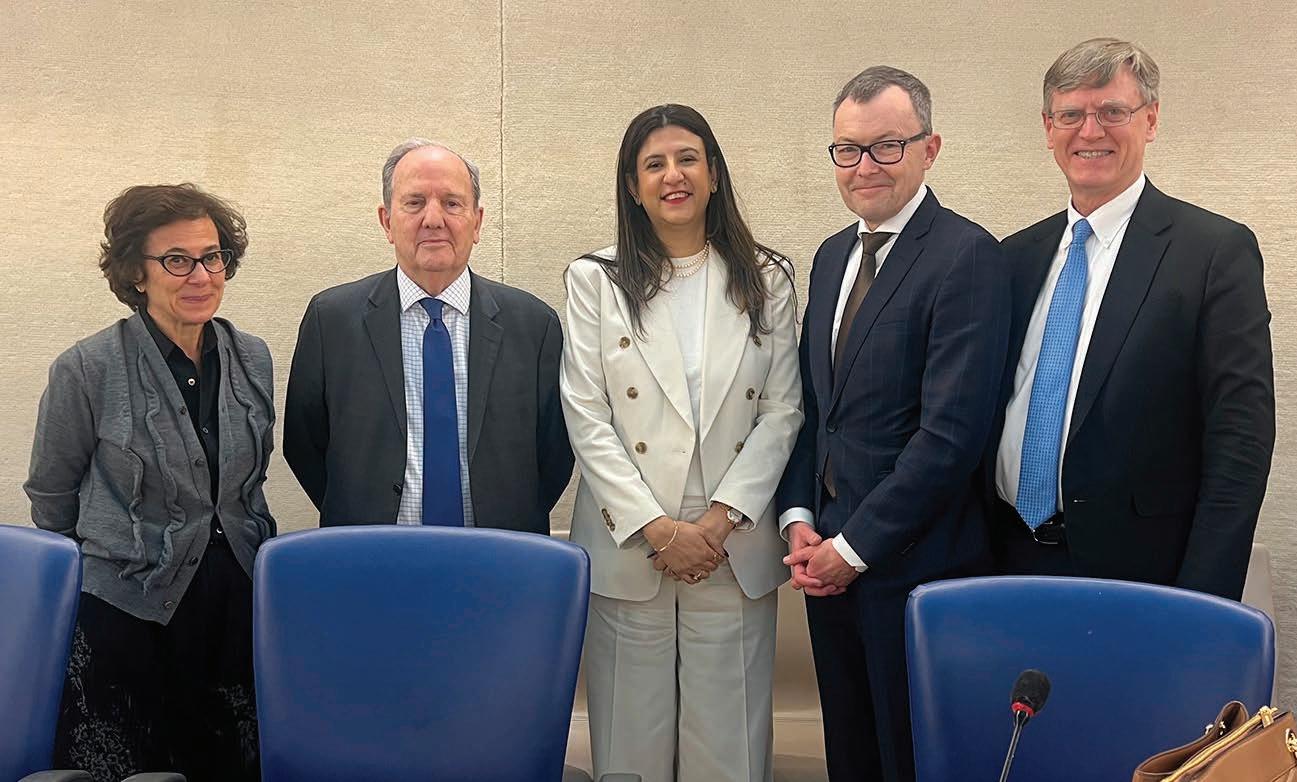
SPEAKING BEFORE THE UNITED Nations Human Rights Council, GW Law Professor Sean D. Murphy detailed steps governments should take to adopt national laws and policies that establish domestic awareness of genocide, crimes against humanity, and other atrocities.
In the March 5 presentation in Geneva, Switzerland, Murphy discussed ways to educate government officials on their obligation to prevent and punish these
IT WAS HEARTENING TO SEE THE TREMENDOUS INTEREST BY STATES IN FINDING WAYS TO PREVENT GENOCIDE. AND IT WAS AN HONOR TO BE ASKED TO PRESENT TO THE COUNCIL ON THIS TOPIC.
– Sean D. Murphy
international crimes. The strategies include training programs for police, military, militia, and other personnel. In response to questions from the floor, Murphy also suggested that governments should consider appropriate regulations for monitoring social media, hate speech, and even corporate activity that could lead to the commission of atrocities.
“It was heartening to see the tremendous interest by states in finding ways to prevent genocide,” said Murphy, the Manatt/ Ahn Professor of International Law. “And it was an honor to be asked to present to the council on this topic, which I studied when drafting articles for a new convention on prevention and punishment of crimes against humanity.”
The U.N. General Assembly decided in December to move forward with diplomatic negotiations on such a convention, which will be based on Murphy’s work as special rapporteur for the U.N. International Law Commission.
LAW’S ACCESS TO JUSTICE CLINIC (Prisoner Civil Rights Division), directed by Professor Stephen A. Saltzburg with the support of Professorial Lecturer in Law Jonathan Gitlen, had the unique experience of going to trial in a prisoner rights case last semester.
In the Spring 2025 semester case, a team of student-attorneys, led by Saltzburg and Gitlen, represented a former prisoner in Abingdon, Va., who filed a lawsuit in federal court in the Western District of Virginia claiming that his constitutional rights were violated by the use of excessive force and deliberate indifference to his medical needs. The
NOT MANY STUDENTS TRY A FEDERAL CASE IN LAW SCHOOL, AND ALMOST NO STUDENTS TRY A CASE TO A FEDERAL JURY. BUT THESE STUDENTS DID...
– Stephen A. Saltzburg
court appointed Saltzburg as pro bono counsel to represent the plaintiff, admitted Gitlen pro hac vice, and admitted three third-year law students under the court’s third-year practice rule.
While all 20 GW Law clinics provide students with experiential learning opportunities in which they do real work representing real clients, it is rare for those opportunities to lead to trial within the semester-long clinic. The students in the prisoner rights clinic were especially lucky to receive real trial experience before an outstanding jurist, Senior Federal District Judge Michael F. Urbanski.
Eight student-attorneys and their professors traveled to Virginia for the trial after rigorously researching the case, preparing evidence and argument, and liaising with the client. They took on the case from beginning to end, from jury selection to closing. After two days of deliberations, the jury returned the verdict in favor of the defense.
“The judge, after the trial, was incredibly impressed,” said student-attorney
Professor Sean Murphy (far right), with (r to l) Jürg Lauber, Savita Pawnday, Juan Méndez, and Nada Al-Nashif, after addressing the United Nations Human Rights Council in Geneva on genocide prevention
Nina A. Bundy, JD ’25. “He came up to us afterward, shook our hands, and expressed how taken he was with our performances and how he felt like we did much better as law school students than he would have done, which was a huge compliment.”
Both Professors Saltzburg and Gitlen were incredibly proud of the students.
“They performed better than most lawyers, were better prepared, and impressed both the judge and opposing counsel,” said Saltzburg. “Not many students try a federal case in law school, and almost no students try a case to a federal jury. But these students did and in the process established for all to see that GW law students are remarkably well prepared to take their place in the legal community and make a contribution to justice wherever it is needed — in Abingdon, in D.C., in the U.S., and beyond.”
The student-attorneys said the trial experience was invaluable for their growth both as lawyers and as people.
“The opportunity to get to support the people who actually (go to court), to help
THE OPPORTUNITY TO GET TO SUPPORT THE PEOPLE WHO ACTUALLY (GO TO COURT), TO HELP THEM, TO WITNESS PROFESSOR SALTZBURG, WHO IS TRULY A MASTER OF HIS CRAFT, WAS INVALUABLE.
– Sam Girioni
them, to witness Professor Saltzburg, who is truly a master of his craft, was invaluable,” said student-attorney Sam Girioni (Class of ‘26).
GW’s clinical law program, which celebrated its 54th anniversary this year, has rapidly expanded since Dean Dayna Bowen Matthew arrived in 2020, launching 12 clinics in the past four years alone. The clinics serve more than 400 clients and litigants each year and provide hands-on education for 264 students each year who cumulatively provide approximately 50,000 hours of free legal assistance to the community.

SOLOVE EXCEEDS HALF A MILLION DOWNLOADS ON SSRN
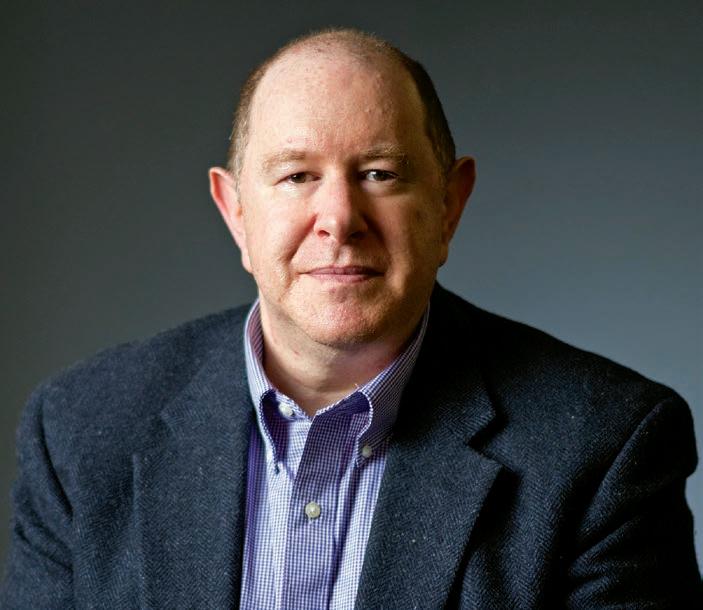
PROFESSOR DANIEL SOLOVE—ONE of the world’s leading experts on privacy law—holds the No. 1 spot on the top law authors page for the Social Science Research Network (SSRN). He is also among the top 10 researchers in more than 65 disciplines whose work is downloaded from the repository for academic papers in law, economics, humanities, life sciences, health sciences, and other social sciences.
In February, Solove was listed among the Top 100 Legal Scholars of 2024 in an annual ranking of legal scholarship by Rob Wiley and Melanie Knapp at the George Mason University Law Library.
Solove has chalked up more than a half million downloads on SSRN this year. Only one other law professor in the country, Cass Sunstein of Harvard Law School, has reached that download milestone on SSRN.
“It’s just really exciting and gratifying to hit this mark because it means people are interested in my work,” said Solove, the Eugene L. and Barbara A. Bernard Professor of Intellectual Property and Technology Law and faculty co-director of the GW Center for Law and Technology, a hub for thought leadership, interdisciplinary scholarship, and international discourse. The center offers one of the world’s most extensive curricula in IP, privacy, AI, and technology law.
At the start of the year, GW Law was ranked No. 5 in the SSRN rankings of 750 law schools worldwide for downloads in the previous 12 months, behind Harvard, Stanford, New York University, and Yale. SSRN hosts papers from more than 2 million researchers.
Dan Solove
Professor Stephen A. Saltzburg (center), Adjunct Professor Jonathan Gitlen, and their team of eight GW Law student-attorney clinicians represented a client at a federal trial in Virginia.

A Supreme Anniversary
BY MARY A. DEMPSEY
ILLUSTRATION BY SAMUEL FEINBERG
For three quarters of a century, GW Law’s annual Van Vleck Constitutional Law Moot Court Competition—one of the most esteemed and enduring in the country—has stood out among competitions testing law students’ appellate advocacy skills. In the final round of Van Vleck, students argue before a panel of sitting federal judges, including, sometimes, justices of the U.S. Supreme Court.
Now, as the competition marks its 75th year, that extraordinary tradition is on track to become a more regular fixture. In January, to close the 2024-25 finals, Justice Ketanji Brown Jackson anchored the Van Vleck bench, and the law school has secured commitments from two other justices to judge the finals in the next two years.
“Starting with this coming competition, we hope to have a Supreme Court justice judge the finals of every competition,” said Dean Dayna Bowen Matthew. “Most lawyers never get to stand up and speak before the Supreme Court. I’ll never argue before the Supreme Court. Yet, over a three-year period, we will have 12 students who will have done so. This will be the first time in the school’s history that Van Vleck will host three justices in a row.
“On display will be our students’ intellectual sophistication, the excellence of their writing skills, the professionalism of their oratory skills, and the way our students support one another,” she added.
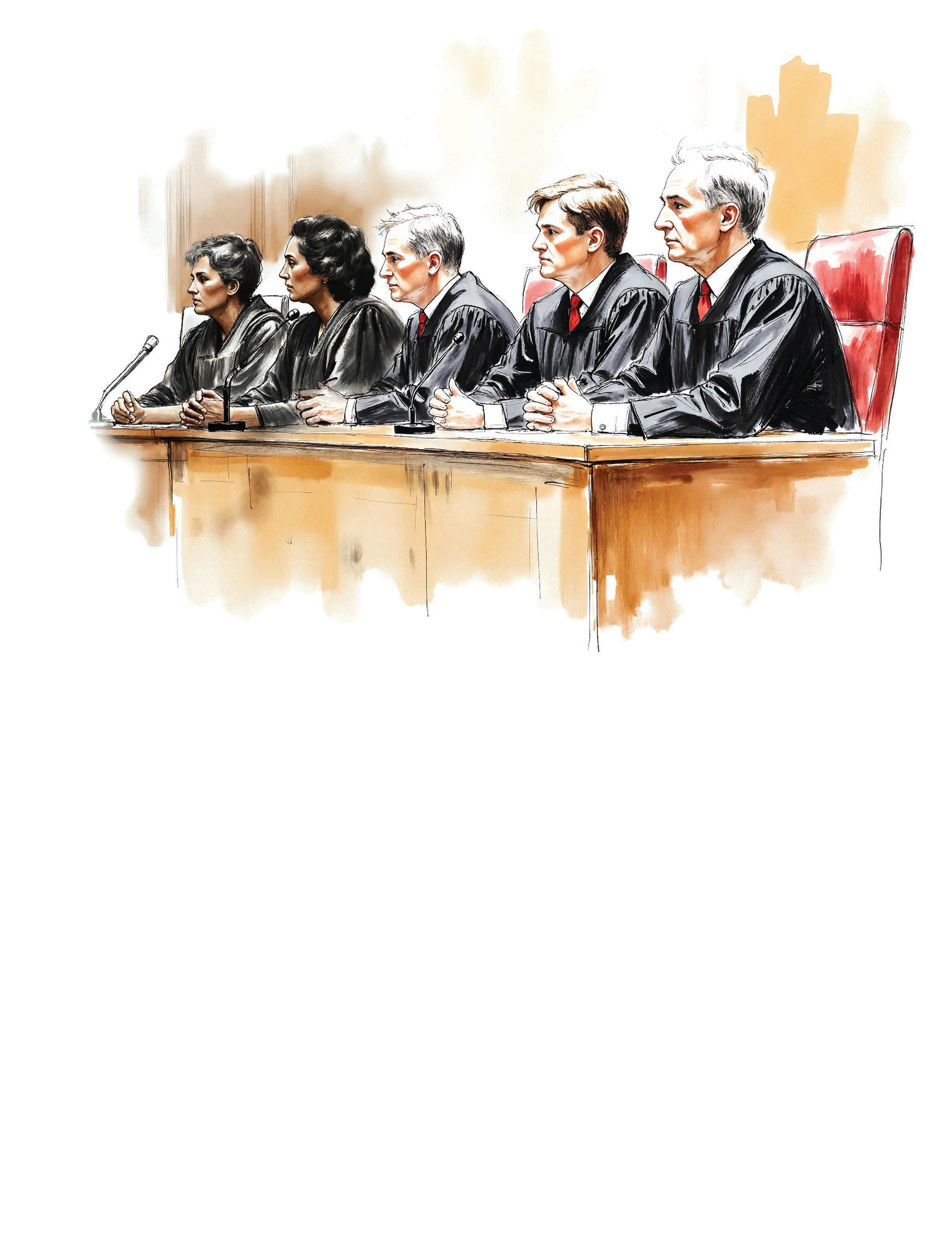
The dean said she is not at liberty to reveal which justices will take part in the 2026 and 2027 Van Vleck finals.
Justices of the Supreme Court have long been linked with the annual competition, an advantage that grows out of the faculty’s deep connections to the federal bench. Prior to Justice Jackson’s appearance in January, John Roberts, Samuel Alito, Elena Kagan, Antonin Scalia, and Sonia Sotomayor judged the competitions as sitting justices. A second planned appearance by Chief Justice Roberts in 2020 was called off at the last minute when he was required to preside over the impeachment trial of Donald Trump in the U.S. Senate.
Amy Coney Barrett, Brett Kavanagh, and Sonia Sotomayor also served as judges before they were named to the high court, sparking a joke inside GW Law that the competition is popular among justices, present and future.
“In the 24 years I have been involved with Van Vleck, there have been a lot of iterations but there is one consistency, the unique GW experience of being in D.C. The presence of the Supreme Court justices really highlights that,” said David Johnson, GW Law’s assistant dean for advocacy programs. “Other law schools may have a justice bless a building or give a graduation speech, [but] there’s no learning going on with that. At the Van Vleck competition, GW Law students argue before legal intellectuals, three sitting federal judges. One may be a justice of the Supreme Court.”
“Engaging with them is our commitment to our students. And it distinguishes GW Law,” he continued. “I’ve overseen about a third of the Van Vlecks—this is my big life’s work—and I am proud to serve GW in this capacity.”

Distinguished Connections
GW LAW FACULTY MEMBERS ARE OFTEN INSTRUmental in persuading the justices and federal judges to take part in the Van Vleck finals. Bradford Clark, the William Cranch Research Professor of Law, clerked for Justice Scalia on the Supreme Court, and he also served as a special master appointed by the Supreme Court to assist in the resolution of an original action between states. He was key in bringing Justice Kagan and the chief justice, as well as several federal judges, to Van Vleck.
Arranging the appearance of a justice can be a lengthy process— the lead time to get on a justice’s schedule is usually at least two years. Van Vleck’s reputation as a well-organized competition with excellent student advocates helps. GW Law faculty have also successfully tapped their connections to the federal bench, and alumni who sit on the federal bench or on state supreme courts often make Van Vleck appearances.
Sometimes serendipity also plays a part. Dean Matthew extended the invitation to one justice between courses at a formal dinner and he accepted on the spot. Justice Jackson decided to judge
SHE [JUSTICE JACKSON] WAS ENTHUSIASTIC ABOUT SEEING THE FRUITS OF THE STUDENTS’ LABORS AFTER THEY WORKED SO MANY MONTHS ON THIS COMPETITION.
- Laurie Kohn
Van Vleck after a conversation with GW Law Senior Associate Dean Laurie Kohn, who is also the Jacob Burns Foundation associate dean for clinical affairs. The two women were long-time members of the same group of mothers who car-pooled each other’s children and helped one another out in multiple other ways, a relationship that Justice Jackson wrote about in her memoir, Lovely One
“Shortly after Justice Jackson took her seat on the U.S. Supreme Court, she and I spoke about her commitment to our local academic community,” Kohn said. “We discussed what would be the most appropriate and satisfying way to do that at GW. We talked about different options and Van Vleck was the one that was most exciting for her.
“She was enthusiastic about seeing the fruits of the students’ labors after they worked so many months on this competition. She was also excited about the opportunity to work with other judges on the panel, including GW law grads,” Kohn added.
Paul Schiff Berman, the Walter S. Cox Professor of Law, said faculty connections to the federal bench are not only useful in attracting judges to campus but they benefit students in a farreaching way. Berman clerked for Justice Ruth Bader Ginsburg and Chief Judge Harry T. Edwards of the U.S. Court of Appeals for the District of Columbia Circuit.
“Professors who have clerked for judges or justices can bring to the classroom a sense of how judges look at cases and how judges look at the world,” Berman said. “People tend to think of judges as politicians in robes voting for the Republican side or the Democratic side, but most judges do not look at the world that way. And to have
U.S. Supreme Court Justice Ketanji Brown Jackson anchored the bench for the 75th anniversary of the Van Vleck Competition.
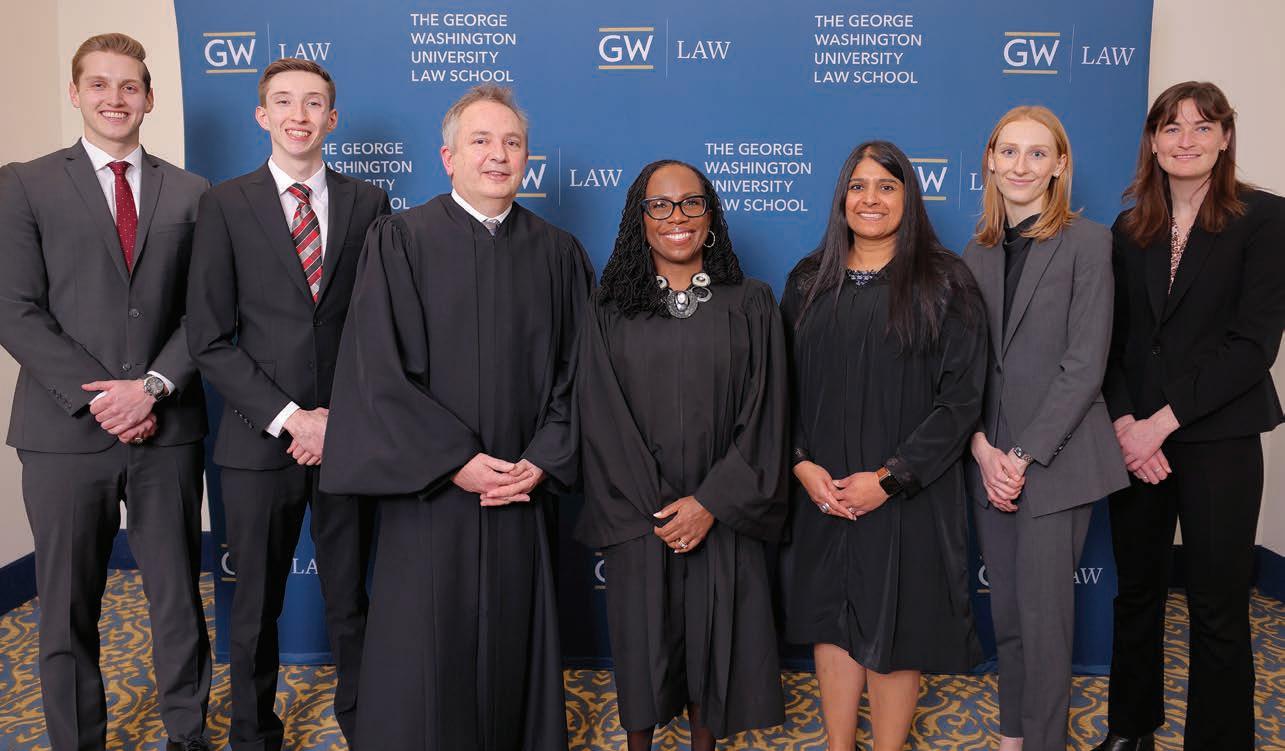
professors who have seen from personal experience what it means to decide cases based on legal argumentation, rather than political preference, makes a big difference in the classroom.”
In addition, Berman said professors can speak to the value of clerkships based on their own personal experience, motivating students to apply for judicial internships during law school and clerkships after graduation.
In considering judges for a Van Vleck final, Clark said a justice is always asked first.
“And when we have our justice lined up, we put on our thinking caps and think what other judges would make sense,” Clark explained. “Justice Scalia came to moot court twice while he was on
THE CRUX OF THE COMPETITION
THE STUDENTS ARGUING BEFORE A PANEL OF FEDERAL judges in the finals of the Van Vleck Moot Court Competition draw the crowds, but there is an earlier—and equally important—element of the competition that also involves students: The Problem.
Alan Morrison, the Lerner Family Associate Dean for Public Interest and Public Service Law, supervises two students each year in drafting the problem, a fictional U.S. Supreme Court case that is the focus of the competition. The problem covers two constitutional issues. At times the fictitious cases have been harbingers of actual cases that later appeared before the high court.
“Sometimes I come up with the problem from watching what is going on in the court system and looking for issues that are open and interesting to students,” said Morrison, who has overseen the creation of the problem for the last 15 years.
In the three months before GW Law opens up registration for the Van Vleck Moot Court Competition each year, Morrison and two 3Ls selected from the school’s Moot Court Board—a student-run honorary society—immerse themselves in drafting the problem.
“I start by having the students do some basic research on the claims. Sometimes I tell them where to go to find information and sometimes they start on their own,” Morrison said. “We have to create everything. We usually don’t take existing statutes.”
The students, who often tackle the problem while juggling their summer jobs, receive academic credit for the work. They invent statutes and structure the case to ensure that the courts involved have proper jurisdiction, that the case issue hasn’t become moot and that there are no other potential glitches.
“Most are civil cases, and there usually is not a lot of real facts, just enough to make it interesting,” Morrison said. He said the work on the problem is, in a way, almost harder than the work of the competitors.
“I think that’s true,” said GW Law alumnus Jonathan Maier, who worked on the problem for the 2011-12 Van Vleck competition. “Writing the problem is a more serious role and exercise than arguing [in the competition]. Intellectually, it’s
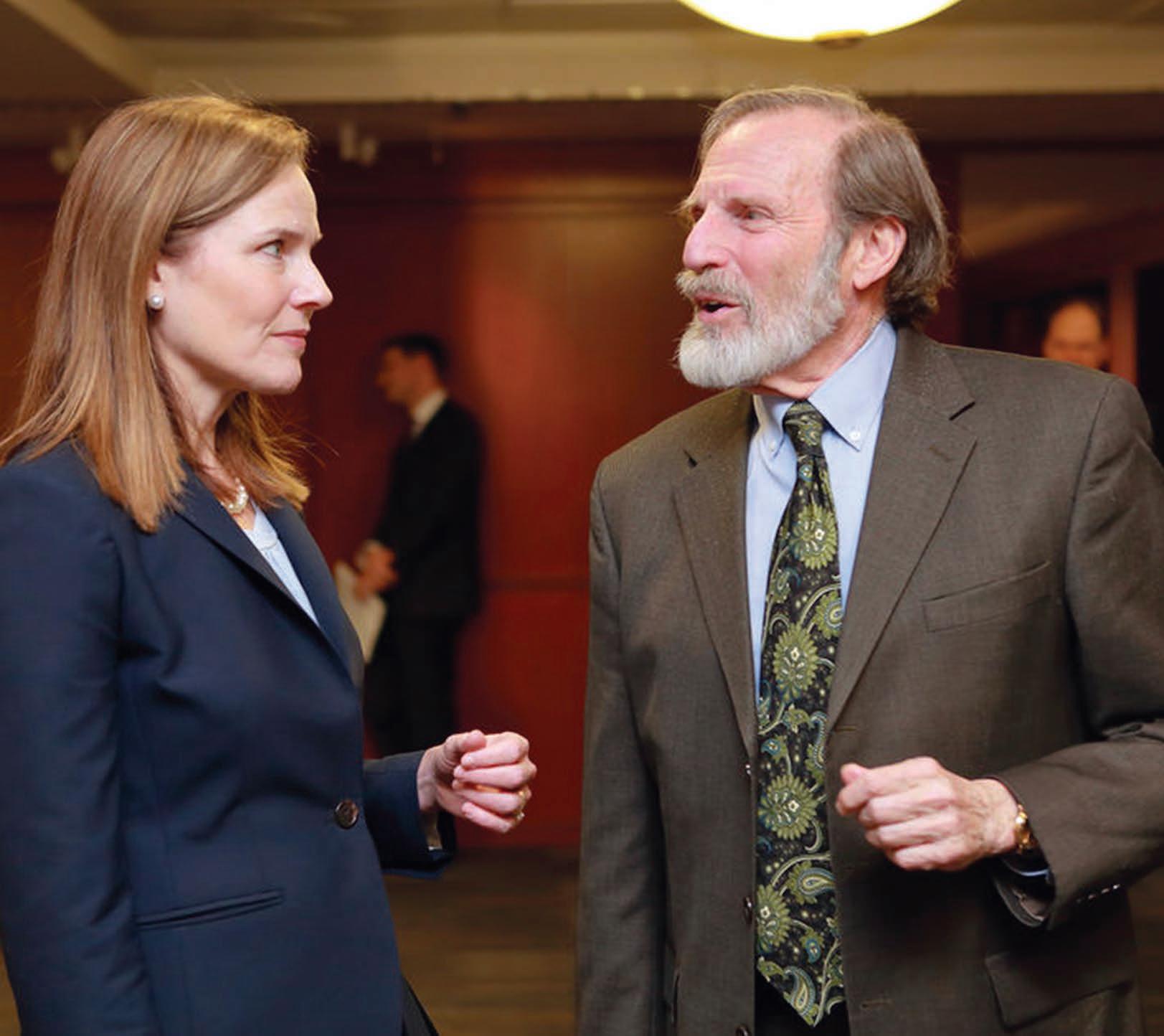
easier to be given a problem and then figure out your best arguments than to do the research and writing and thinkingthrough of a legal case.”
After the students finish writing the problem, they write a short summary of the case and its issues—a bench memo. They also prepare a series of questions for the first rounds of judges, who may not be steeped in the issues at play.
The experience adds valuable tools to students’ wheelhouses as they embark upon their legal careers. “I always tell students when they interview for a job to talk about something different. Students who work on the problem can say, ‘I had to create a Supreme Court case’ and then talk about the issues,” Morrison said.
Associate Justice Amy Coney Barrett, pictured with Associate Dean Alan Morrison, served as a Van Vleck judge prior to her appointment to the U.S. Supreme Court.
The judges and finalists of the 2025 Van Vleck Competition
WE ALWAYS HOPE THAT JUSTICES AND JUDGES VISITING CAMPUS FOR VAN VLECK WILL EVENTUALLY HIRE A GW GRADUATE IN THE FUTURE.
- Bradford Clark
the bench. One of the times, we invited [U.S. Court of Appeals for the Sixth Circuit Judge] Jeff Sutton, one of his former law clerks to sit with him. We thought that would make him feel welcome and ensure that he had a good time.”
At that January 2009 Van Vleck final, Justice Scalia and Judge Sutton were joined by Marsha Berzon, a senior judge of the U.S. Court of Appeals for the Ninth Circuit, as the third judge. In her appearance at Van Vleck, Justice Jackson was joined by
Chief Judge of the U.S. Court of Appeals for the First Circuit David J. Barron and Judge Roopali H. Desai of the Ninth Circuit, both of whom spoke favorably of their clerks who went to GW. Justice Jackson and Judge Barron, the son of former GW Law Dean Jerome Barron, both had clerked for Stephen Breyer.
Kohn noted that while some members of the federal bench who serve as Van Vleck judges may step forward because they are interested in giving back as GW Law alumni, “so many of the judges just have a true commitment to training the next generation of lawyers, as evidenced by their engagement in training and mentoring law clerks.”
There is a double benefit to having federal judges take part in the Van Vleck competition, which is named for the longest-serving dean in the history of GW Law. Students get to have contact with members of the federal bench, and the judges get to see how GW students hold up under questioning. After the Van Vleck competition, Justice Jackson told Dean Matthew that she would let others know about her experience at GW.
STEPPINGSTONE TO LOVE AND THRIVING LAW CAREERS
FOR THE 2007-08 VAN VLECK MOOT COURT COMPEtition, 3L Melissa Colangelo and 2L Jeremy Glen found themselves with the same problem: their chosen partners were unable at the last minute to take part in the competition.
“Melissa and I didn’t know each other but we had a mutual friend who had been one of the Van Vleck winners the year before. He recommended that we do the competition together,” Glen said.
Colangelo, who had aspired to be part of an all-female team, was skeptical.
“I thought, ‘Oh, c’mon. He’s a 2L,” she joked. “But if someone puts you on the same email, you have to meet them, so I went to the Uptowner. Jeremy and I met, started talking about the Red Sox and how we liked hiking in Colorado. We ended up saying, ‘Let’s do this.’
“When I walked out the door later, my life had changed.”
For five months, they prepared for a fictitious case of a physician-assisted suicide that addressed issues of free speech and the constitutionality of a state-sanctioned suicide prevention act. The Van Vleck finals unfolded before Judge Janice Rogers Brown of the U.S. Court of Appeals for the District of
JEREMY AND I MET, STARTED TALKING ABOUT THE RED SOX AND HOW WE LIKED HIKING IN COLORADO. WE ENDED UP SAYING, ‘LET’S DO THIS.’ WHEN I WALKED OUT THE DOOR LATER, MY LIFE HAD CHANGED.
- Melissa Colangelo
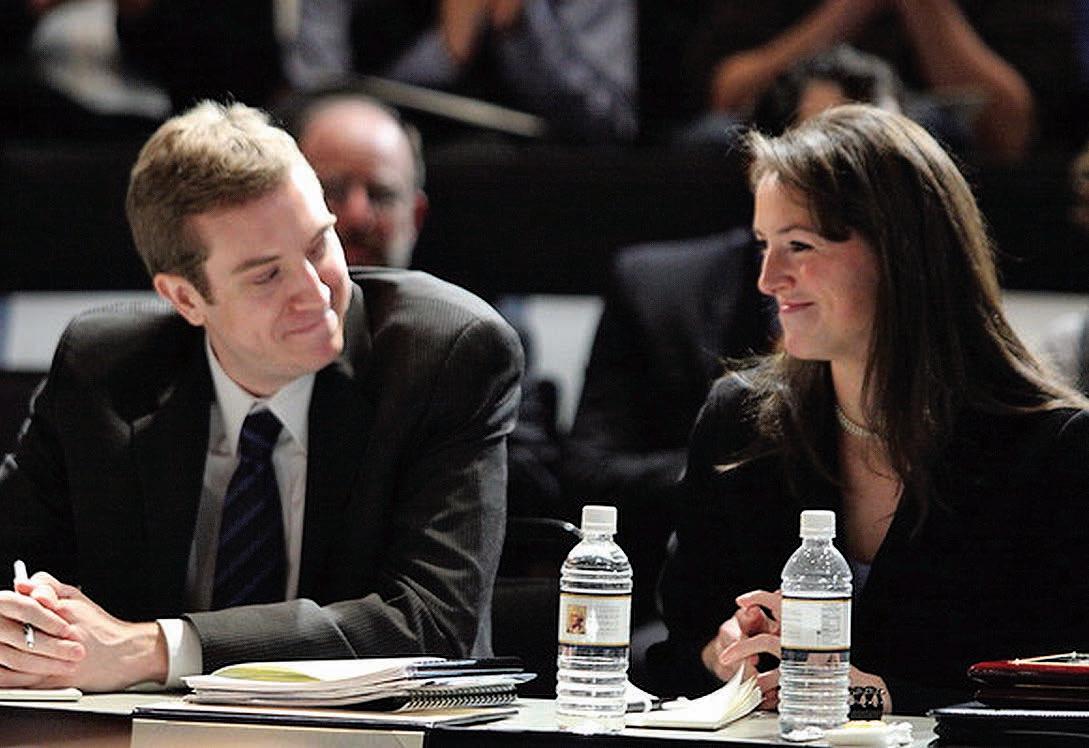
Columbia Circuit, Ninth Circuit Court Judge Stephen Reinhardt, and U.S. Circuit Court Judge Randall Rader, a GW Law alumnus.
Petitioner team Colangelo and Glen defeated respondent team Michael Hissam and Bonnie Vanzler. Colangelo was recognized as the best oral advocate while Vanzler was named author of the best brief.
Now married with two sons, Colangelo and Glen acknowledge that the hours together practicing for the competition “made the magic happen.” They say this referring to their romance, but they also note that the skills they used for Van Vleck are the same ones they tap in their careers today.
2007-08 champions Jeremy Glen and Melissa Colangelo found both victory and love on the Van Vleck stage.
“We always hope that justices and judges visiting campus for Van Vleck will eventually hire a GW graduate in the future,” Clark said.
He cited the example of Jonathan Bond, JD ’08, whose team won the 2006 -07 Van Vleck final before Justice Alito. Bond, now a partner at Gibson Dunn, later clerked for Justice Scalia. In private practice and as an assistant to the solicitor general, Bond has argued 10 cases before the Supreme Court, Clark said.
While Justice Alito was on campus for the moot court competition, Clark made a point of introducing Ryan Watson, JD ’07, to the justice. Watson was Clark’s research assistant at the top of his class and had already secured a prestigious clerkship on the United States Court of Appeals for the D.C. Circuit. Two years later, Justice Alito hired Watson as one of his law clerks.
Students in the Van Vleck finals not only have the honor of arguing in front of a Supreme Court justice, but they receive feedback and, typically, they and their families get to meet the justice privately. And, of course, it’s something to add to their resumés.
Although the justices must read the brief and prepare
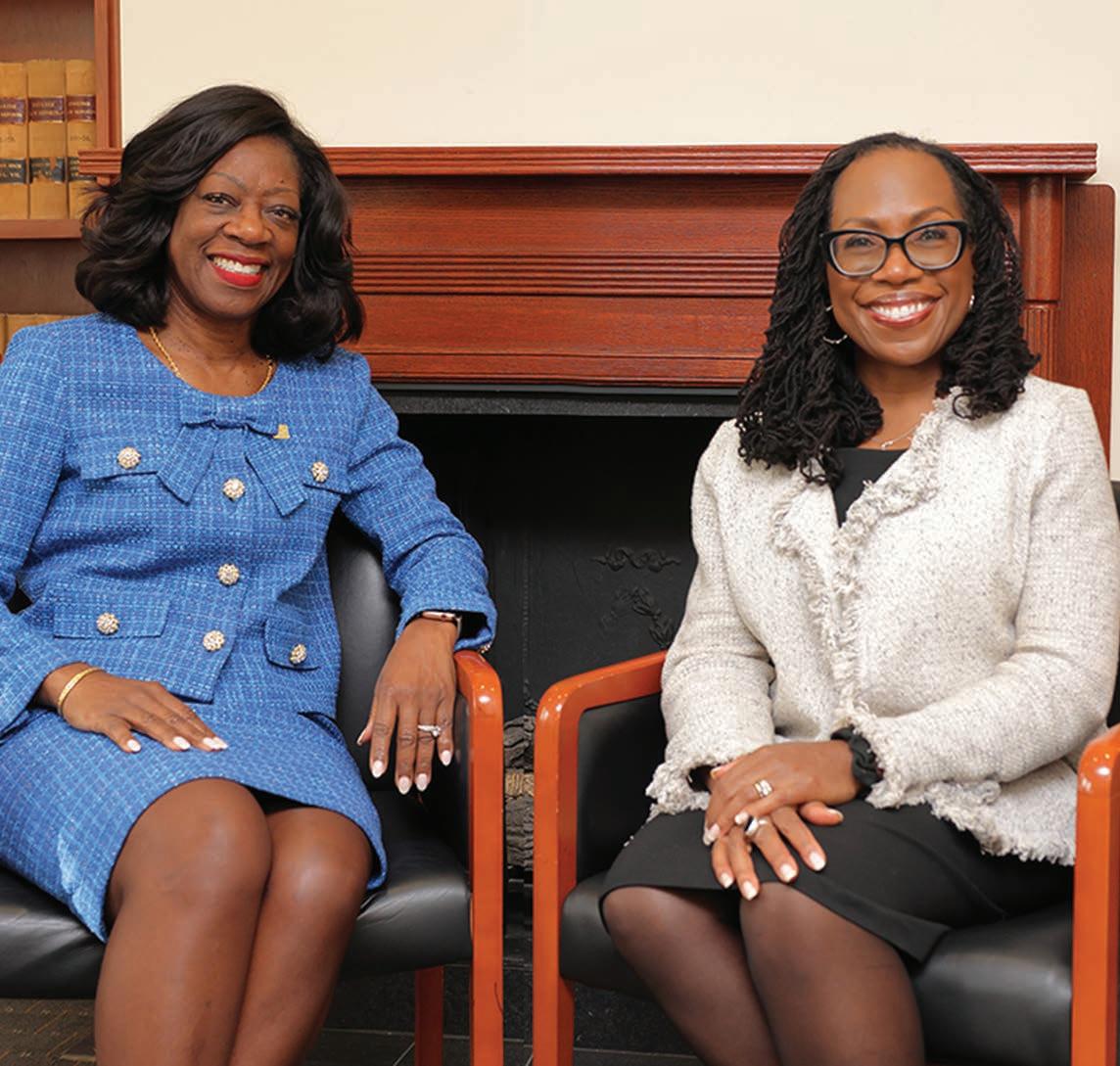
As appellate director at the nonprofit Children’s Law Center in D.C., Colangelo has argued about a dozen times before the D.C. Court of Appeals, where she clerked after law school. Glen is of counsel at Steptoe LLP, specializing in complex commercial litigation.
Colangelo came to GW Law knowing she wanted a law career focused on vulnerable children and families. Prior to taking part in the Van Vleck Moot Court Competition, she was on a team that made it to the finals of the Domenick L. Gabrielli National Family Law Moot Court Competition. Before law school, she spent three years as a high school history teacher.
Glen’s journey to GW Law—and Van Vleck—was a bit more serendipitous. He studied music and biology before applying for law school, “not knowing what I wanted to do.” As an admitted student, he received an email noting that the Van Vleck competition final—that year with Chief Justice Roberts— would be broadcast on CSPAN.
“I had no idea what the competition even was, but I watched it and was enthralled,” Glen recalled. “From that moment, there was no doubt in my mind that I wanted to do the competition, although I still had no idea what was really involved. I decided that before even beginning law school and had the great fortune to reach that goal with Melissa.”
Glen and Colangelo said there “were a lot of nerves” in the weeks leading up to their Van Vleck finals but on the day they stood before the judges, they felt calm.
“When we won, it felt magical,” Colangelo said. “At the reception afterward, we joked that the next time we’d have our picture taken that much and greet so many people would be at our wedding. And in 2010, it was.”
questions—against the backdrop of their already busy schedules— GW Law’s location means they do not have to travel. The Van Vleck finals are always scheduled when the court is sitting so the justices are in town.
The Van Vleck competition is a for-credit elective course open to 2Ls, 3Ls, and 4Ls. It caps at 124 students, a level that is often reached when it is known that a Supreme Court justice will take part in the judging. Johnson said the competition faithfully mirrors the experience of being a lawyer, except that no real clients are involved.
The heart of the competition is focused on a case—The Problem—that raises two constitutional law issues. For about a decade, Alan Morrison, the Lerner Family Associate Dean for Public Interest and Public Service Law, has supervised two students each year in drafting the fictional U.S. Supreme Court case. Morrison, who co-founded the Public Citizen Litigation Group with Ralph Nader in 1972, argued 20 cases in the Supreme Court.
The Problem is made public in the second week of the semester and student teams have about a month to write and submit their briefs. During the 2024-25 competition, Johnson put into place a volunteer team of attorneys, many of them alumni, to serve as adjunct professor coaches for teams. The coaching will now remain a permanent part of Van Vleck.
Students are not required to consult with coaches—the most recent Van Vleck was won by a team that bypassed coaching—but Johnson said 70 percent of student teams opted for the extra learning opportunity and experiential learning credit on their academic record. Coaches can talk to students about their arguments or offer basic instructions on the law, but they are not allowed to see the briefs before they are submitted.
On a Saturday in early November of each year, two preliminary rounds begin. Students who wrote a brief for the petitioner go up against students who wrote a brief for the respondent. Each member
Dean Dayna Bowen Matthew and Associate Justice Ketanji Brown Jackson
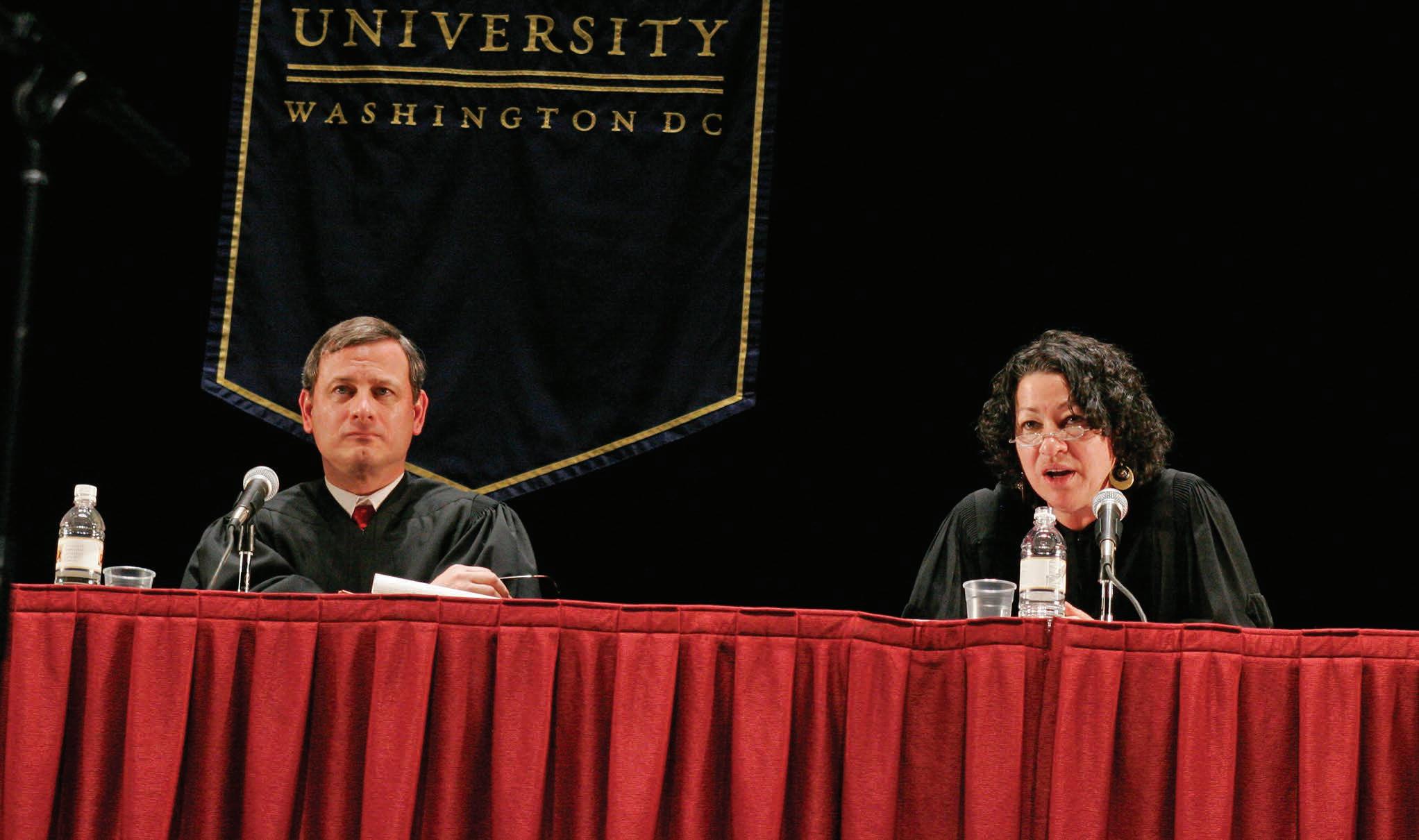

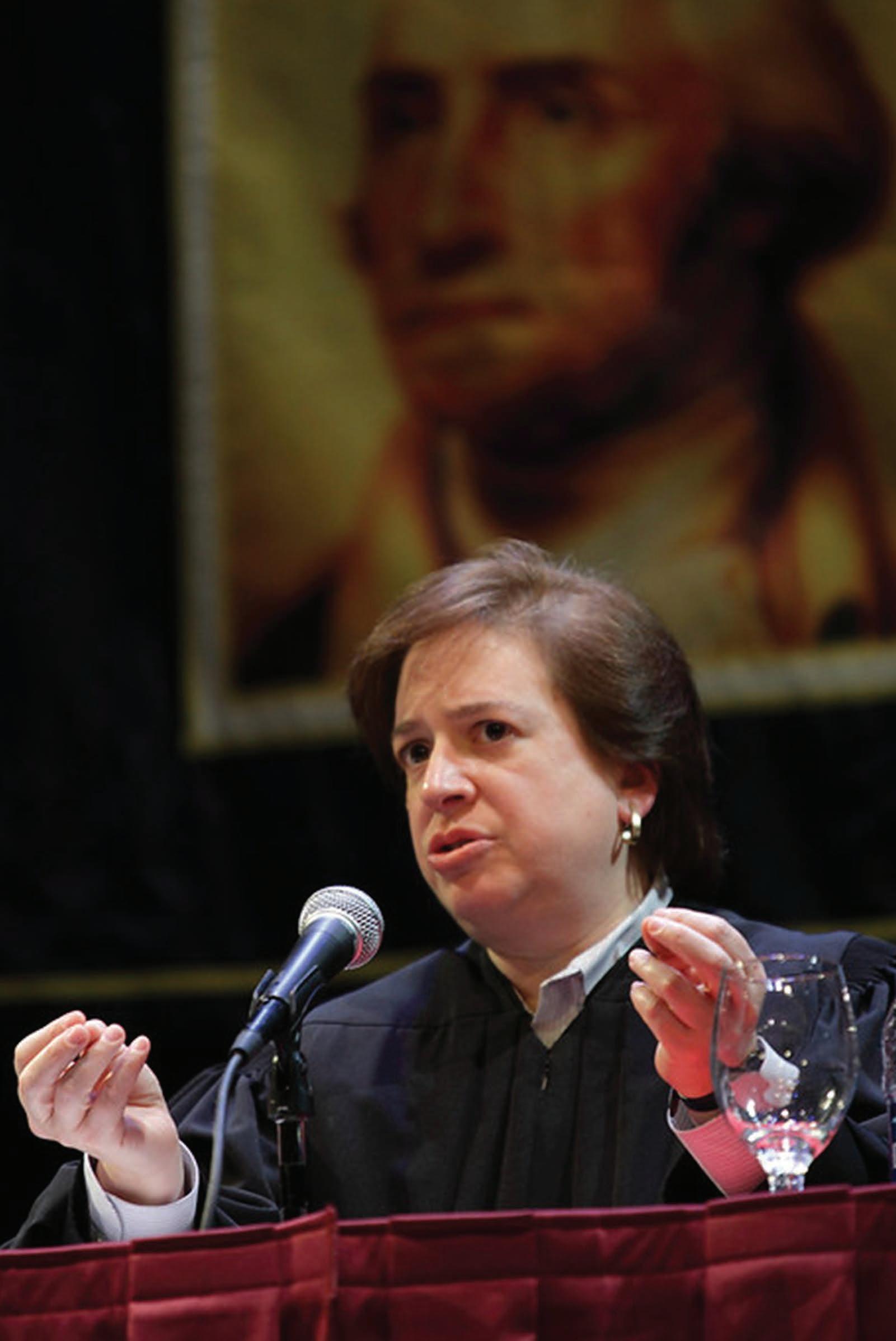
(Clockwise) Chief Justice of the United States John Roberts, Jr., and Associate Justices Sonia Sotomayor, Elena Kagan, and Samuel Alito, Jr., are some of the sitting U.S. Supreme Court justices who have presided over GW Law’s Van Vleck finals in recent years.
of the two teams has 15 minutes to present. The hour-long format mimics the time limits for arguments before the U.S. Supreme Court.
“In the preliminary rounds, we’ve got students spread out throughout the law school and being judged in as many as 31 classrooms by 93 judges. These are 2Ls and 3Ls, many of them doing this for the first time. They’re nervous,” Johnson said. “You may have a speech prepared, but two minutes into it you get interrupted with questions, the same as an attorney does in the Supreme Court.
“You can see the case differently every time you go through a round. Students are competing with each other, but they’re also learning from one another. They’re taking things that they’ve heard in opposing arguments that can help them,” Johnson added
The judges, consisting of alumni, coaches, and volunteer attorneys, provide feedback. Student scores determine their grades. The next day, the first advancement round of the Sweet 16 culminates in the quarter-finals. Two weeks later the semi-finals take place.
“All advancement rounds are kill or be killed,” Johnson said. “There are three attorney judges, and they are simply deciding who is the best advocate. In moot court, you are not necessarily
I CAN’T REMEMBER ANYTHING BUT EXCELLENCE BY THE FINALS. THE STUDENTS ARE SO EXCITED AND SO PREPARED. THEY ARE DOING WHAT REAL LAWYERS DO.
- David Johnson
being rewarded for being a silver-tongued devil, you are not being rewarded for the merit of your argument. You are being rewarded for putting time into your case.”
Johnson said as student teams survive each round, they get better “by leaps and bounds.”
“I can’t remember anything but excellence by the finals. The students are so excited and so prepared. They are doing what real lawyers do,” said Johnson. “And even if they are scared of the panel sitting before them, they know the case. They do not know the law better than the judges but they know their case better.”
The Van Vleck finals are a full-scale production, often held in Lisner Auditorium, with its more than 1,300-seat capacity. In February 2008, when Chief Justice Roberts and then-Second Circuit Court of Appeals Judges Sonia Sotomayor and Guido Calabresi presided over the finals, the competition was simulcast on C-SPAN.
The feeling in the room during the finals is electric. There can only be one winning team—bringing home the lawyering lesson that you don’t win all your cases (although students can take the Van Vleck course more than once). The winners receive the Jacob Burns Award, which includes plaques and monetary prizes, over graduation weekend.
“We’re preparing legal leaders for the future. A lot of our graduating law students now have the opportunity not only to visit the Supreme Court and listen to arguments, but they can prepare for Van Vleck or apply for our new clinic that addresses issues before the Supreme Court,” said Dean Matthew. “Our school sits at the top echelons of the judicial food chain. Our students are being prepared at the highest levels.”
FROM VAN VLECK TO TODAY’S HEADLINES
JONATHAN MAIER LOVED ARGUING ABOUT CONSTITUtional law issues when he participated on the winning team in the 2010-11 Van Vleck Moot Court Competition. He has carried that enthusiasm into his career, where he works on cases involving constitutional law and other important issues that draw national headlines.
One of the most recent resulted in U.S. District Judge Christopher Cooper ruling in March that Elon Musk’s Department of Government Efficiency (DOGE) had to respond to a records request from Citizens for Responsibility and Ethics in Washington (CREW), where Maier is a senior litigation counsel, because DOGE is likely subject to open records laws.
I THINK ANY EXPERIENTIAL CLASSES THAT LAW STUDENTS CAN TAKE WHILE THEY ARE IN LAW SCHOOL… HELP YOU LEARN THE FULL RANGE OF WHAT IT TAKES TO BE AN ATTORNEY.
- Jonathan Maier
During a hearing, Maier described Musk’s team as a “black box agency that’s designed and dedicated to drastically cutting federal spending at virtually any cost.” CREW also expressed concern about reports that DOGE deleted or failed to archive encrypted text messages and had used personal email accounts to transmit information in violation of federal law.
Maier described Van Vleck, which is taught as an academic course, as one of the pivotal learning opportunities he experienced at GW Law.
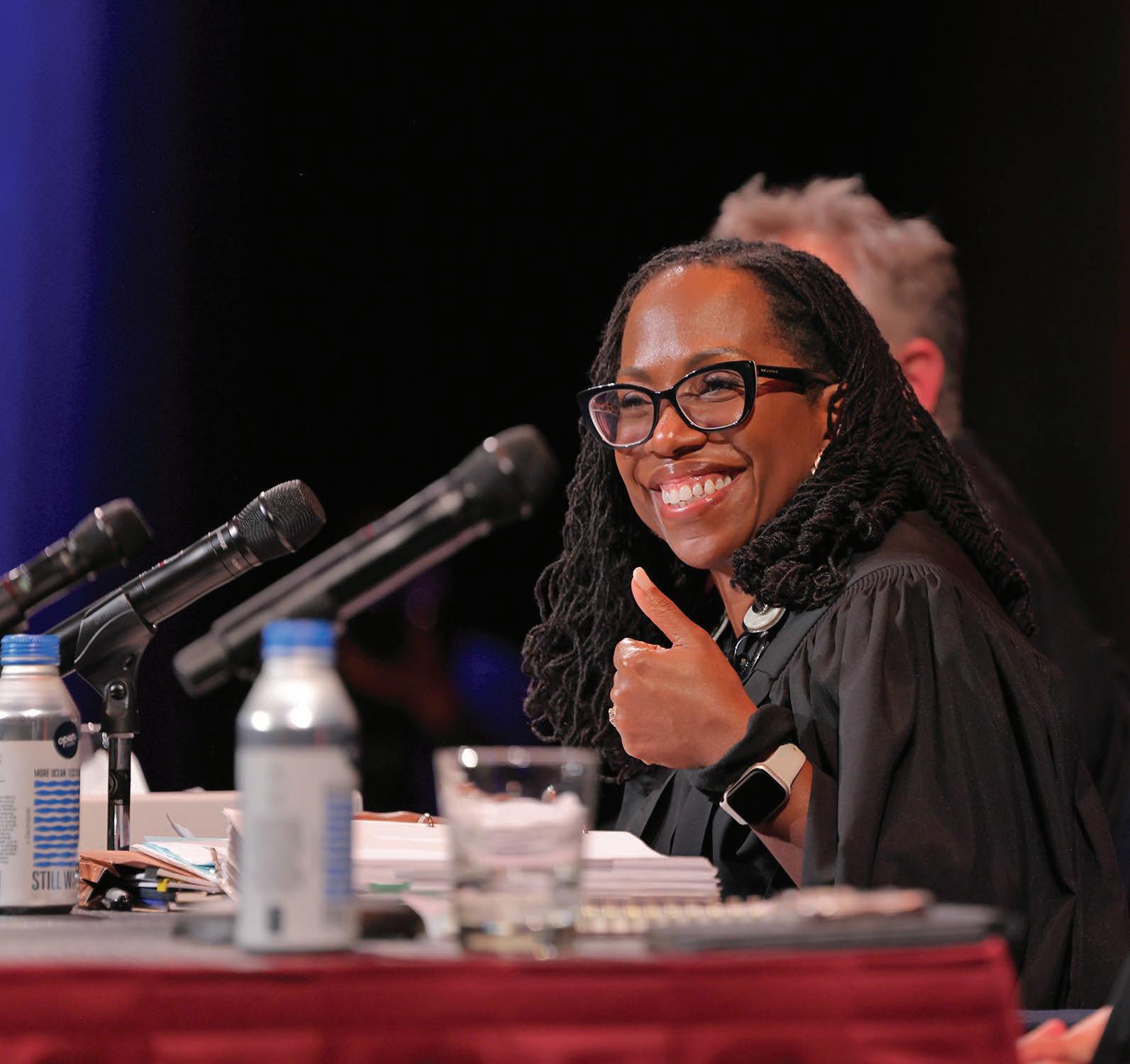
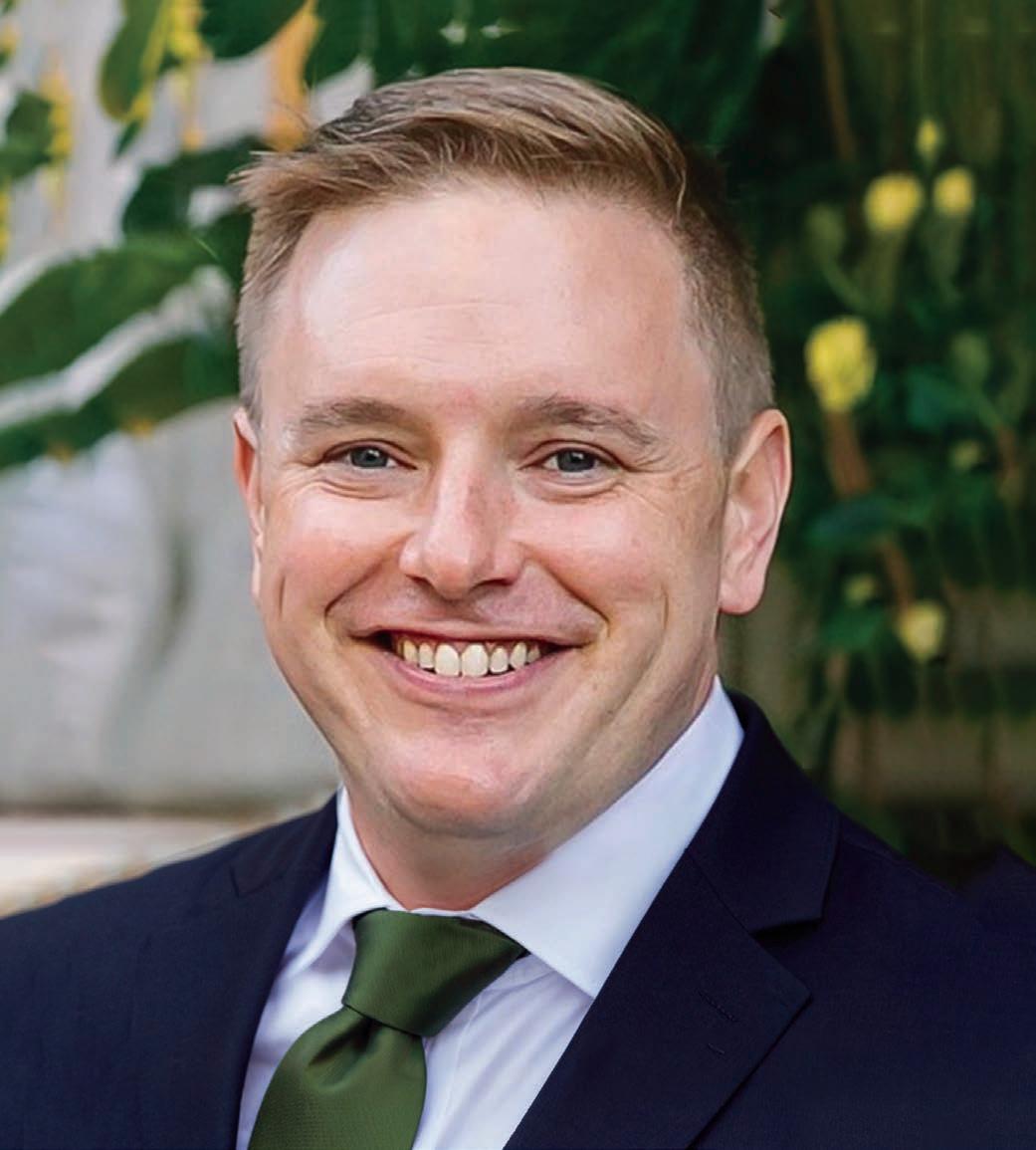
“I think any experiential classes that law students can take while they are in law school, especially if they’re going to be a practicing attorney or practicing litigator … help you learn the full range of what it takes to be an attorney,” said Maier.
Today, as an adjunct at GW Law and a moot court competition coach, he is quick to tell students that Van Vleck also helps them figure out what they might like doing within the field of law.
Maier was a 2L when he teamed up with his friend Sean Sherman to win a Van Vleck competition that started out with 112 students. The case involved a California film production company that lost most of its work in the fictitious state of New Columbia after a production tax credit program favored in-state companies. The film company challenged the constitutionality of the tax credit.
“We took a lot of things away from the competition,” Maier said. “It was a big confidence booster to go through that experience as a 2L…You needed the right work ethic and we competed with people who were ahead of us in school. It taught me the importance of putting in the work.
“And I think it definitely helped when applying for jobs. Mock trial, moot court, and competitions in general show applicants who are challenging themselves,” he added.
He said he added a touch of his own during Van Vleck argument—a habit he continues to use.
“I said something that made one of the judges laugh. It taught me to take advantage of opportunities to be lighthearted and stay conversational. It is something I still do today,” he said.
Justice Jackson
Jonathan Maier

Educating for the Future
by Mary A. Dempsey
EVEN BEFORE IT CONFERRED ITS FIRST law degrees, the George Washington University was a trailblazer in adapting and applying legal principles to issues shaping the future. We took the lead in patent law in the early years of the nation, carved out a nationally ranked reputation for international, comparative, and foreign relations law, and pushed to the forefront in intellectual property law. More recently, we set down pillars on the frontlines of health law and national security law.
“When our society began to grapple with wealth inequality, with individual rights, GW Law was there. When it came to environmental protection, energy, and sustainability, GW Law was there,” said Dean Dayna Bowen Matthew. “Our law school has always been engaged in evolving and emerging areas of the law and we continue that legacy of educating with an eye on the future.”
Today, GW Law is extending that tradition through faculty who are advancing scholarship, learning, and advocacy into areas as diverse as artificial intelligence, data privacy,

reproductive technology, genome mapping, and a business arena that is bumping heads with global security.
In addition to repositioning its classes and academic programs, the school also continues to offer exceptional experiential learning opportunities. Its first clinic in appellate advocacy is differentiating itself—and leveraging GW Law’s location—by preparing students to address the most fundamental constitutional issues before the nation’s highest court.
“Our faculty is not only teaching and writing, but they are helping to shape the way our country and the world think about new frontiers of science, how our transnational economies operate, what questions are being asked about the present challenges of our society and the fields in which answers are needed,” the dean said.
The faculty’s powerful impact—inside and outside the classroom—has continued to provide a platform that distinguishes the university. GW Law magazine looks at four faculty members who are preparing students for the legal needs of an evolving society.
illustration by scoTTEK
TEACHING INTERNATIONAL BUSINESS LAW IN A DISRUPTED WORLD
WILLIAM DODGE, THE LOBINGIER PROFESSOR OF
Comparative Law and Jurisprudence, is closely watching the case in which the state of Missouri secured a $24 billion default judgment against nine Chinese defendants, including the government of China, for hoarding personal protection equipment during the COVID-19 pandemic.
Missouri maintained China had violated U.S. and state antitrust laws. The Foreign Immunity Sovereignty Act was raised. At issue now is whether Missouri will ever see payment.
The case is an outgrowth of the hyper-speed recalibration underway at the intersection of international business and law. That is the arena where Dodge’s preeminent expertise in international litigation, international business transactions, and international arbitration is deepening GW Law’s frontrunner reputation in business law education.
“We’re in a time of unbelievable change right now. We have moved from an era of laissez faire and free trade, which you can date to WTO negotiations in early ’90s, to government taking a much more active role in regulating international business in the interest of national security,” said Dodge. “Everything is being viewed though a lens of national security.”
He pointed to the Biden administration’s controls on exports of computer chips made in Asia, largely to slow China’s development of artificial intelligence and advanced computing. And he noted that the Trump administration, by “tearing up the traditional rules of international trade,” is sparking a geopolitical realignment that could exclude the United States.
Where there is disruption, broken business contracts and international business disputes follow. Dodge noted that the Missouri case has also conjured up references to “lawfare,” or the use of legal systems as an instrument of war.
“A U.S. state using the U.S. legal system to try to go after another system, in this case China, is a new phenomenon. I think it’s a drastic overstatement to call it lawfare, but legal actions can be used to obtain some kind of political or diplomatic advantage internationally,” Dodge said. “There will be further attempts
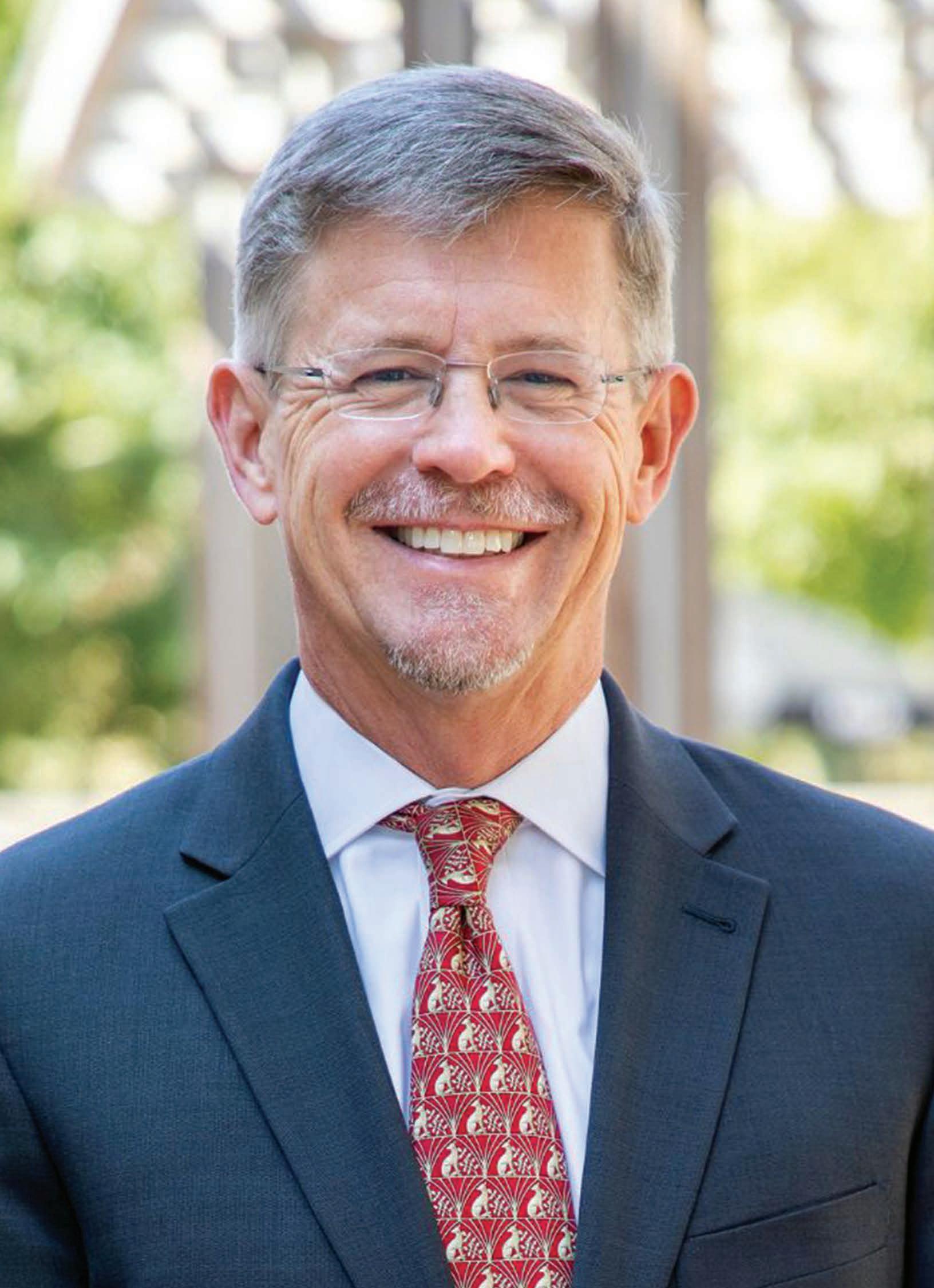
like this. The question is whether they will be shut down by the Supreme Court.”
In a global society where the engine is business, Dodge writes about international litigation for top law journals—including the Columbia Law Review, the Duke Law Journal, the Harvard Law Review, the Michigan Law Review, and the Yale Law Journal—and he is the founding editor and a contributor to the Transnational Litigation blog. He is also co-author of the casebook Transnational Business Problems, co-author of Transnational Litigation in a Nutshell, and co-editor of International Law in the U.S. Supreme Court: Continuity and Change
WE’RE IN A TIME OF UNBELIEVABLE CHANGE RIGHT NOW.... EVERYTHING IS BEING VIEWED THOUGH A LENS OF NATIONAL SECURITY.
- William Dodge
His recruitment to GW Law last year, after nearly three decades teaching at the UC Davis School of Law and UC Law San Francisco, puts Dodge at the very pulse point where business law is being reframed.
“Regulation has become much more central for people who do international transactions, and in D.C. you really feel the regulatory environment. It’s exciting to be teaching blocks away from where these decisions are being made or to be on panels with or have conversations with the people who are making them,” he said.
William Dodge
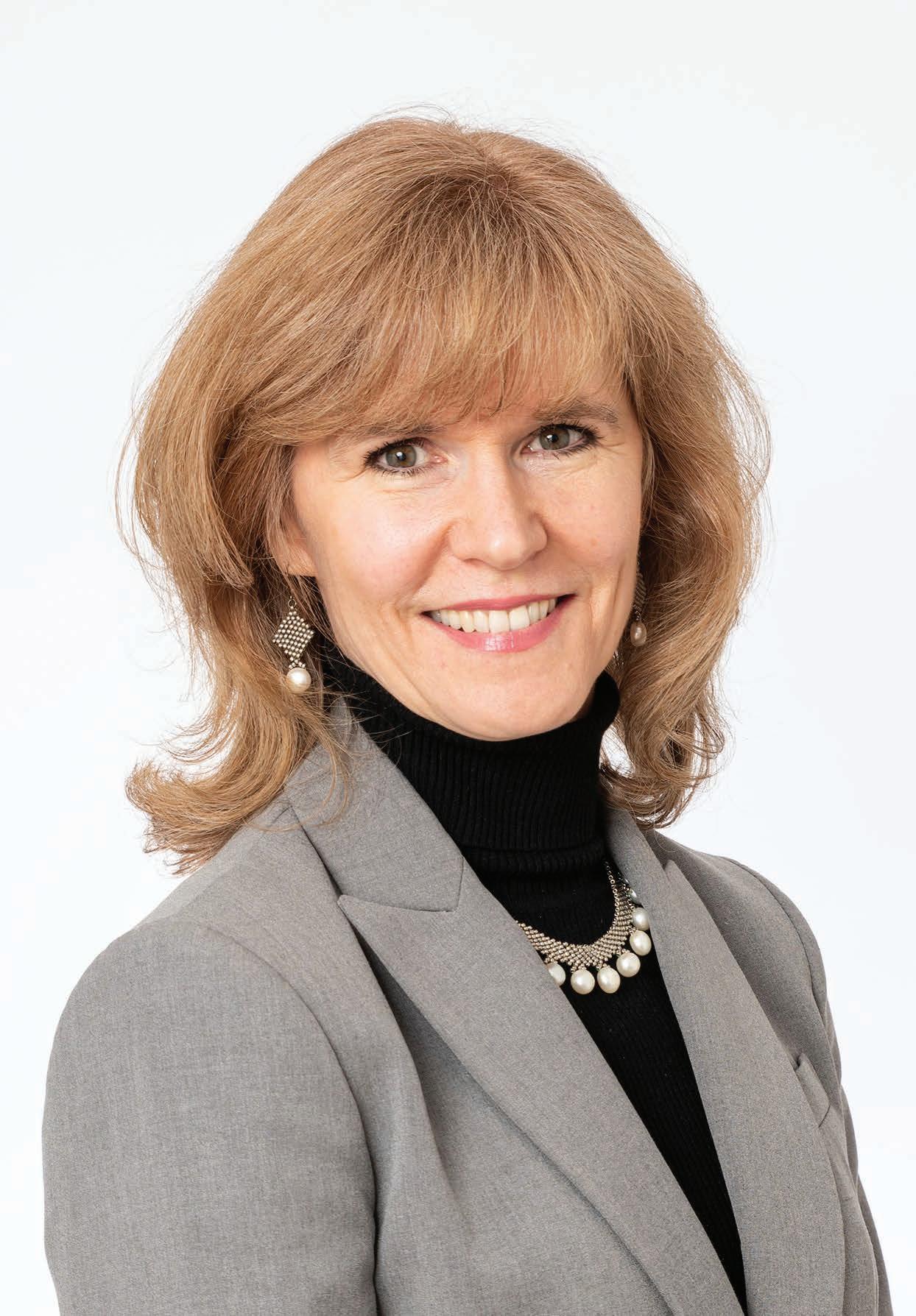
ON THE CUTTING EDGE OF SCIENCE
PROFESSOR OF LAW SONIA SUTER, THE KAHAN Family Research Professor, is engaged in work on the cutting-edge of scientific discovery. Her focus? The revolution in the way humans reproduce—and the social and legal implications.
Suter follows existing reproductive technologies, including those for which new uses are being advanced. One example is genetic testing on embryos before they are implanted in uteruses. She also tracks emerging developments that are technically possible but not yet used in clinical settings, such as gene editing of human embryos. And she watches scientific developments on the precipice, practices that sound like science fiction, most notably in vitro gametogenesis (IVG) in which human eggs and sperm can be created in a lab with any one person’s genes.
“We don’t have a whole lot of regulation in the United States of reproductive technology, which is ironic given the heavy regulation of reproductive rights,” said Suter, who is co-director of the Health Law Program. “These are technologies that raise ethical and legal questions. Should we be regulating in this space and, if so, how should we? What should this regulation look like?”
In her classroom, she sees growing interest in this area of the
law, noting that “some of my students are IVF babies, so they are thinking about these issues in personal ways.”
She said it is not just about whether and how regulation is applied but also which entities have authority—and how that dovetails with existing rules and laws touching reproductive health. At play are federal and state laws, the tort system, contractual law, and even selfregulation by the industry and its professionals. Privacy and equity are also concerns.
Suter, who also holds the title of Henry St. George Tucker III Dean’s Research Professor of Law, acknowledges that it is difficult to get ahead of the science and create a prescient legal framework on a fast-evolving landscape.
IVG is one of the most striking—and controversial—technologies under discussion. She has been writing about it for nearly a decade, parsing the legal questions around its astonishing capabilities. Technically, IVG enables the creation of eggs or sperm from a person’s non-reproductive cell, such as a skin cell. The technology could enable same sex couples to reproduce together. It could make in vitro fertilization easier.
“You could even use IVG to reproduce alone,” Suter said. “It wouldn’t be cloning if I produce a sperm and egg from myself. It would be like incest on steroids. Of course, the big question is whether this can actually be done. Just because there is evidence it works for mice doesn’t mean it can work for humans.”
One of the biggest legal struggles in Suter’s area concerns the status of embryos and the so-called personhood movement. In a case involving frozen embryos destroyed in an accident at a fertility clinic, the Alabama Supreme Court ruled last year that the embryos can be considered children under state law.
“The Alabama case involved people planning to get pregnant whose embryos were destroyed. They were harmed in some way. I think they are entitled to some compensation, but I don’t think it’s a child,” Suter said. “The law doesn’t have a good set of rules or even language to address issues like this.”
While it can be difficult to weigh the myriad legal questions swirling around reproductive technologies, Suter said there is also a sense that legal scholarship in this arena is “going to be important down the road.”
“Do we want to be leaders in the technology and offer a careful way of pursuing it, or do we want it to develop in other countries that may not do it so ethically?” she said.
WE DON’T HAVE A WHOLE LOT OF REGULATION IN THE UNITED STATES OF REPRODUCTIVE TECHNOLOGY, WHICH IS IRONIC GIVEN THE HEAVY REGULATION OF REPRODUCTIVE RIGHTS.
- Sonia Suter
Sonia Suter
THERE ARE JUST A HANDFUL OF LAW SCHOOLS IN THE COUNTRY THINKING SYSTEMICALLY ABOUT THIS AREA.
I THINK WE’RE ON THE CUTTING EDGE FOR LAUNCHING A CENTER OF EXCELLENCE FOR LAW AND TECHNOLOGY.
- Alicia Solow-Niederman
AT THE FOREFRONT OF AI, DATA PRIVACY, AND THE LAW
PROFESSOR ALICIA SOLOW-NIEDERMAN WORKS IN uncharted territory. When she talks about privacy rights, the associate professor may be discussing information collected through fitness wearables, cochlear implants, or other innovations that captures neural and cognitive data. Or she may be addressing privacy protection in an age marked by ChatGPT, open-source AI models, and generative AI. Or, if you ask the right questions, you may even get to pick her brain about robot judges.
The multidisciplinary terrain where Solow-Niederman teaches encompasses artificial intelligence and the law, information privacy law, and regulation of emerging technologies. It may be one of the most exciting and challenging legal frontiers today, and her expertise—and that of other faculty members—is putting GW Law at its vanguard.
“If we have a chip that can be embedded in your brain so you can hear for the first time, this is an amazing medical advance. But who owns that data? How do we ensure that your thoughts wouldn’t be sold and used?” she asked. “How do we tap into tremendous scientific and health advances, but do so in a way that is privacy protective and guarantees individual autonomy?”
Solow-Niederman’s scholarship explores the regulation of technologies in a way that considers social, economic, and political power. In looking at algorithmic accountability, data governance, and information privacy, she evaluates how digital technologies challenge existing regulatory approaches and the underlying law.
In developing her AI Law and Policy class, she wanted a course that did not require any technical background but would, rather, help students build technology literacy. She highlights GW Law’s Privacy, Data Security, and Technology Law JD concentration, noting that there is a growing need for legal expertise in the area.
“There’s going to be continued demand. There’s no shortage of
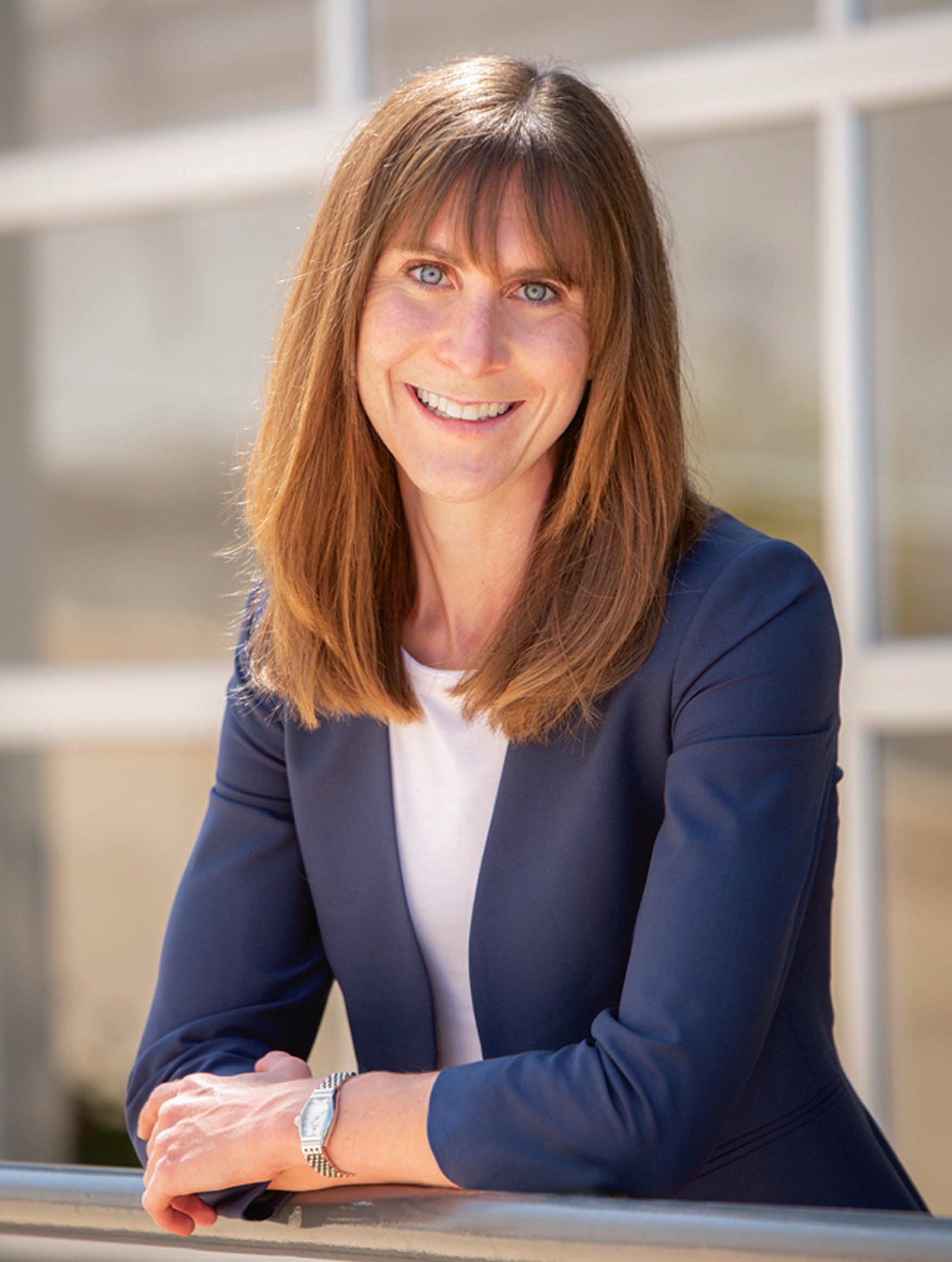
Alicia Solow-Niederman
opportunities in this field,” she said. “Because it’s so new, there are great opportunities for junior practitioners.”
The scholarship of Solow-Niederman and other GW faculty members anchors the GW Center for Law and Technology, launched in October 2024, which puts forward education, scholarship, events, and dialogue on intellectual property, privacy, data security, and technology law.
“There are just a handful of law schools in the country thinking systemically about this area,” said Solow-Niederman. “I think we’re on the cutting edge for launching a center of excellence for law and technology.”
Her goal is to empower students to better understand what AI and emerging technology do and to look through the lens of the law and regulation in envisioning the high-stakes impact of these advancements.
“The key theme is trying to get students to realize that technology isn’t something we have to accept uncritically,” she said. “We should think about how we want technology to be in the world and how we want to regulate it. This means thinking about who is helped and who is hurt.
“Law can allow us to move toward the world we want, using technology for good,” she added.
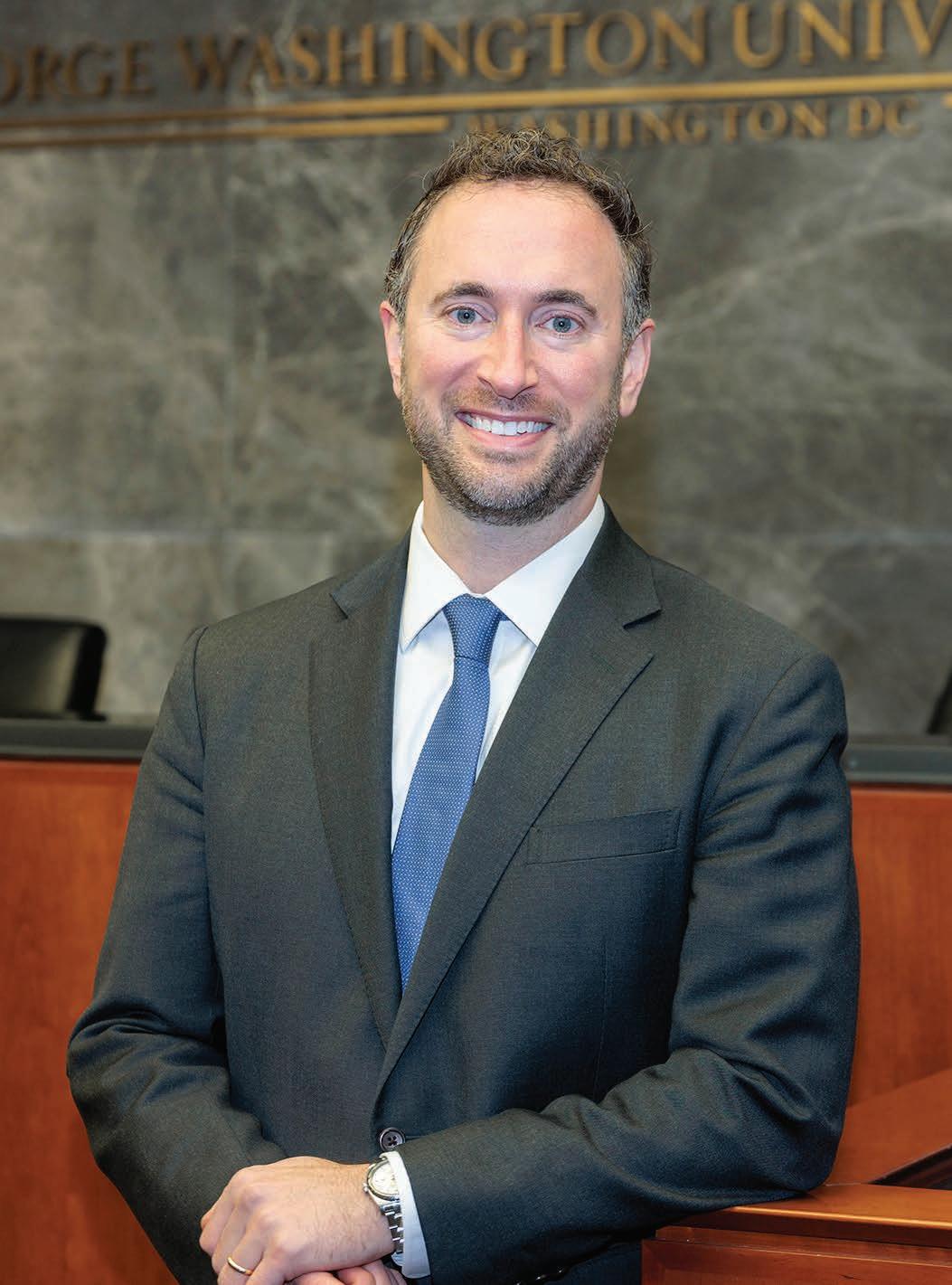
NEW APPELLATE CLINIC OFFERS SUPREME OPPORTUNITIES
GW LAW STUDENTS IN THE 2024-25 ACADEMIC YEAR not only authored amicus briefs for two important federal courts of appeals cases, but they represented clients in filing two amicus briefs before the U.S. Supreme Court. The briefs came out of the students’ work in the law school’s newest clinic, the Administrative Law, Issues, and Appeals Clinic.
“I designed and established a traditional appellate clinic that specializes in administrative law and public law issues on nationally significant questions,” said Associate Dean Aram Gavoor, who directs the new clinic. “These are issues in the domain of public law, focusing on the power of the president, Congress, or the federal courts. We also file comments in the federal rulemaking process directly with agencies.”
The school’s newest clinic may be small, with only six students each term in its initial run, but its ambitious aim, combined with GW’s geographic location, offers students an extraordinary learning opportunity.
“If a student has experience working on a U.S. Supreme Court matter or a federal appeals court matter, it will professionally advantage that student in perpetuity,” Gavoor said.
IF A STUDENT HAS EXPERIENCE WORKING ON A U.S. SUPREME COURT MATTER OR A FEDERAL APPEALS COURT MATTER, IT WILL PROFESSIONALLY ADVANTAGE THAT STUDENT IN PERPETUITY.
- Aram Gavoor
In carrying GW Law to the next level, Dean Dayna Matthew said Gavoor builds on the strength of the school’s faculty in appellate law. “Through the clinic, we are educating students in the way they can pursue the most fundamental constitutional rights, the very rights that are at the center of the most heated and essential debates of our time,” the dean said.
In Boniface v. Viliena, 12-1411 (1st Cir.), the clinic’s brief and its proposition were discussed in oral argument before Justice Stephen Breyer, who was sitting on designation to the U.S. Court of Appeals for the First Circuit. The case was initiated by Haitian victims of torture and extrajudicial killing who seek justice in U.S. federal court against their perpetrator, a former mayor in Haiti. The case involves interpretation of the Torture Victim Protection Act.
In the second case, Grand Trunk v. Transportation Security Administration, 24 -2109 ( 7th Cir.), the students’ amicus brief supports the railroad industries’ challenge to the emergency guidance process that the TSA took in mandating cybersecurity regulations.
“The students’ names are on these briefs. This is an example of GW Law, based in D.C., projecting out its appellate capabilities nationally in the federal courts of appeal on issues of national significance,” said Gavoor, whose expertise lies in constitutional law, administrative law, federal courts, and constitutional theory. “Some other law schools have appellate and Supreme Court clinics, but what makes our clinic unique is the public law and procedure issues that we can engage on before any federal appellate court, the U.S. Supreme Court, or any federal agency.
“We can reach out and touch any case nationally that is on appeal before a federal court.”
Students in the clinic have also been involved in two U.S. Supreme Court cases, one involving the certification of a class in a class action lawsuit, Laboratory Corporation of America Holdings v. Davis, 24-304 (Sup. Ct.), representing the National Federation of Independent Business, and the other addressing obstacles per se prisoners face in meeting deadlines for appeals documents that must be sent via mail. In that case, Parrish v. United States, 24-275 (Sup. Ct.), the students were representing the Roderick and Solange MacArthur Justice Center.
The reason GW Law has the technical ability for this type of experiential learning? Gavoor brings 15 years of experience from the U.S. Department of Justice, and he is admitted to and has argued before a majority of the federal appeals courts and approximately one-third of the 94 federal district courts. Gavoor described his relationship with the law school as “contributing to a learning community that helps to shape the law.”
“My work is future oriented, where the law is heading as a country, the direction that we are going,” he said.
Aram Gavoor
DEFINING THE MODERN ENVIRONMENTAL LAW ERA
BY LIBBY STANFORD
ILLUSTRATION BY JENIFHER MARINO
FOR OVER 50 YEARS, GW LAW’S ENVIRONMENTAL and Energy Law program has been at the forefront of education and scholarship in the environmental law field. Over the past decade, its influence and impact has grown exponentially—expanding to include energy law and positioning faculty as leading voices in the modern environmental era. Now, the program is shaping the future of environmental law policy, while tackling some of the most pressing issues of our time.
This year, the Environmental and Energy Law program brought in three new faculty members, supported Professors Emily Hammond and Robert Glicksman as they shaped environmental policy, and supervised and supported students in publishing and presenting their scholarship and research around the nation and the world. As the globe grapples with rising sea levels, record hot summers, and habitat destruction, GW Law’s Environmental and Energy Law program is providing the solutions for a brighter future.

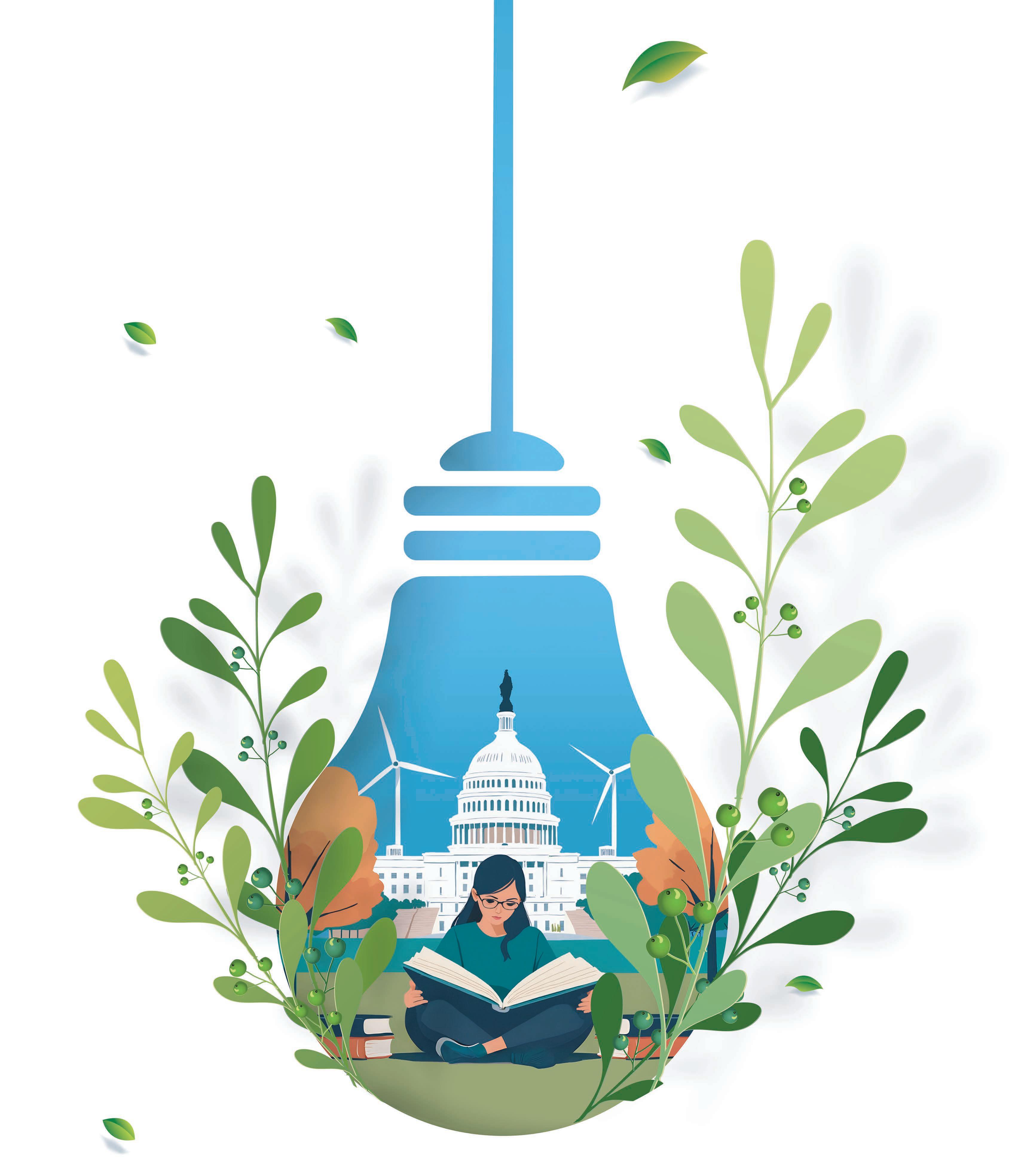
NEW FACULTY MEMBERS BRING EXPERTISE AND EXPERIENCE
The Environmental and Energy Law program welcomed three new faculty members this year: Sara Bronin, Caroline Cecot, and David Uhlmann. They each bring a wealth of experience and expertise that will continue to advance the excellence and impact of the program now and well into the future..
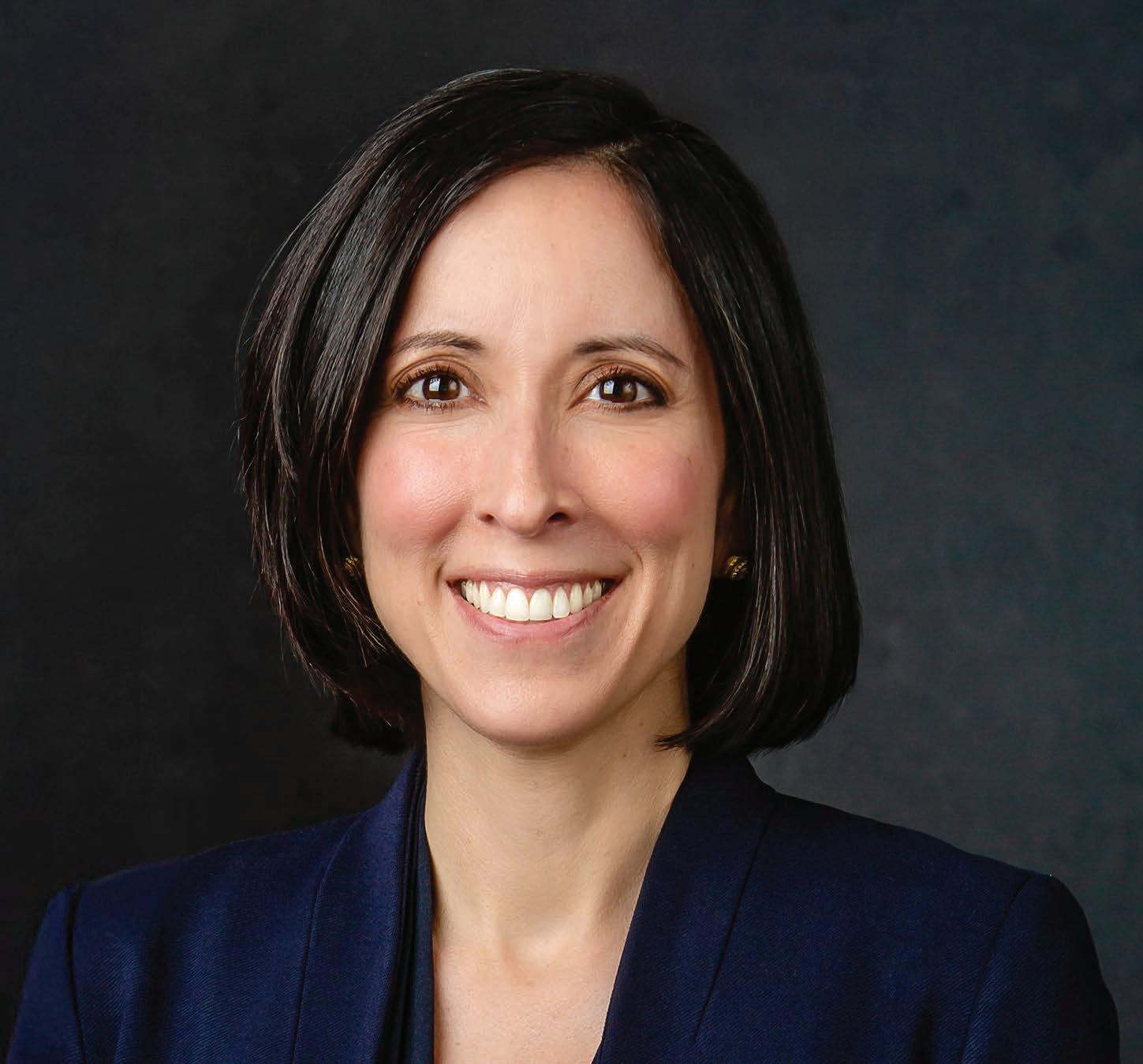
SARA BRONIN
SARA BRONIN JOINS THE LAW SCHOOL FROM Cornell University, where she served as a professor of city and regional planning and an associate member of the law school faculty. In 2023-24, she was on leave from her position at Cornell to serve as the Senate-confirmed chair of the U.S. Advisory Council on Historic Preservation, where she focused among other things on developing and implementing the first federal policy statement on climate change and historic preservation. Prior to joining the Cornell faculty, she was the Thomas F. Gallivan Endowed Chair in Real Property Law at the University of Connecticut, and she founded and directed the UConn Center for Energy and Environmental Law.
Bronin brings extensive expertise in property, land use, zoning, historic preservation, and renewable energy law to GW. Her latest book, Key to the City: How Zoning Shapes Our World, argues that zoning laws should be rewritten to improve our economy, access to opportunity, connectedness, and quality of life. She is the author of three other books, two treatises (including the land use volume of the Restatement of Property (Fourth)), and dozens of law review articles, and she founded the National Zoning Atlas, which is digitizing information about zoning conditions in over 33,000 jurisdictions across the country.
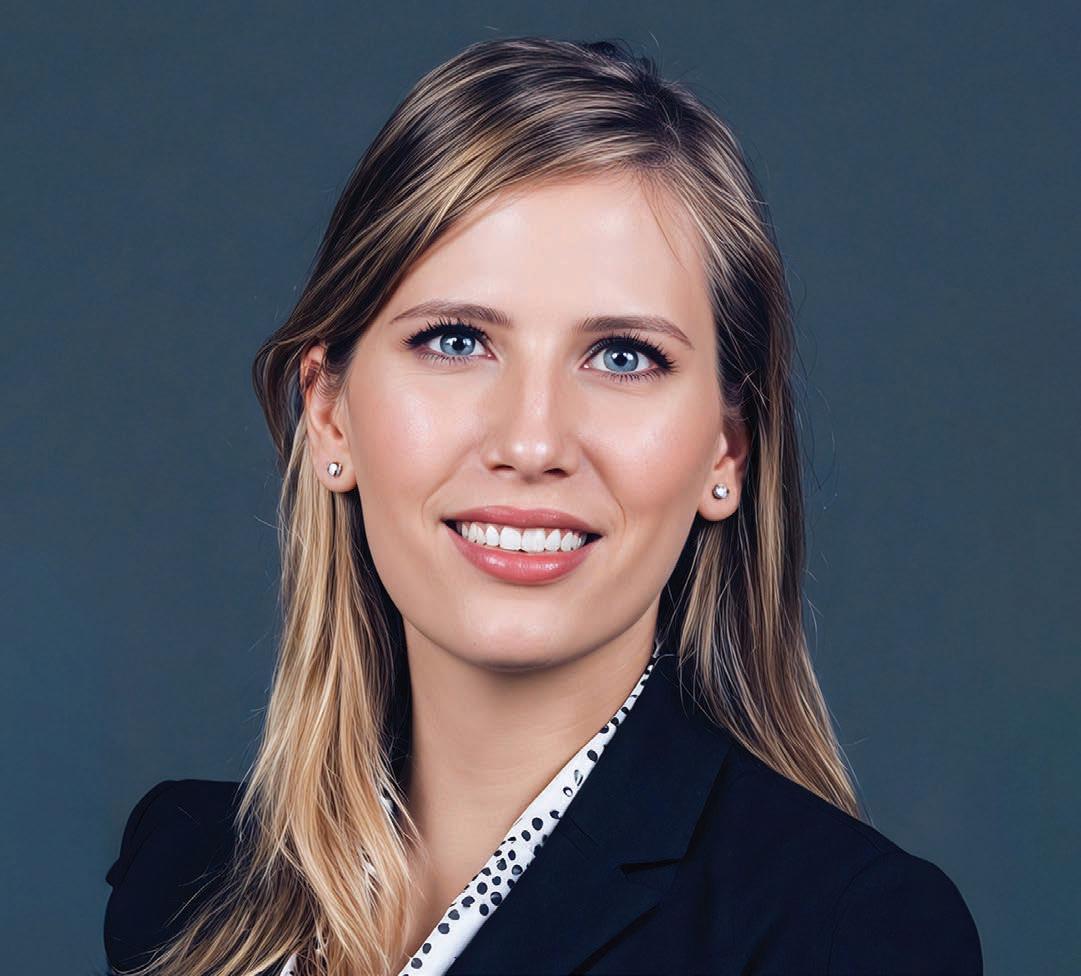
CAROLINE CECOT
CAROLINE CECOT JOINS GW LAW AS A FULL-TIME faculty member after serving as a visiting associate professor of law at GW for the 2024–25 academic year, during which she taught environmental law, torts, and a seminar on environmental law and economics. Before joining GW Law, she was a professor of law at the Antonin Scalia Law School at George Mason University.
Cecot’s scholarship focuses on environmental regulation, administrative law, and especially the use of cost-benefit analysis in rulemaking. She is the president of the Society for Benefit-Cost Analysis and a co-author of the casebook Environmental Law and Policy, 5th ed. (Foundation Press, 2024). Her work has been honored twice by the Environmental Law Reporter, including one article selected as a top 20 environmental law article of the year and another top 20 article that received Honorable Mention for the best environmental law article of the year.
She was recently appointed as a public member of the Administrative Conference of the United States in recognition of her contributions to administrative law. She also served on the U.S. Environmental Protection Agency’s Science Advisory Board panel reviewing the agency’s guidelines for economic analysis. Earlier in her career, she was a legal fellow at the Institute for Policy Integrity at NYU School of Law and clerked for the Hon. Raymond J. Lohier Jr. of the U.S. Court of Appeals for the Second Circuit.
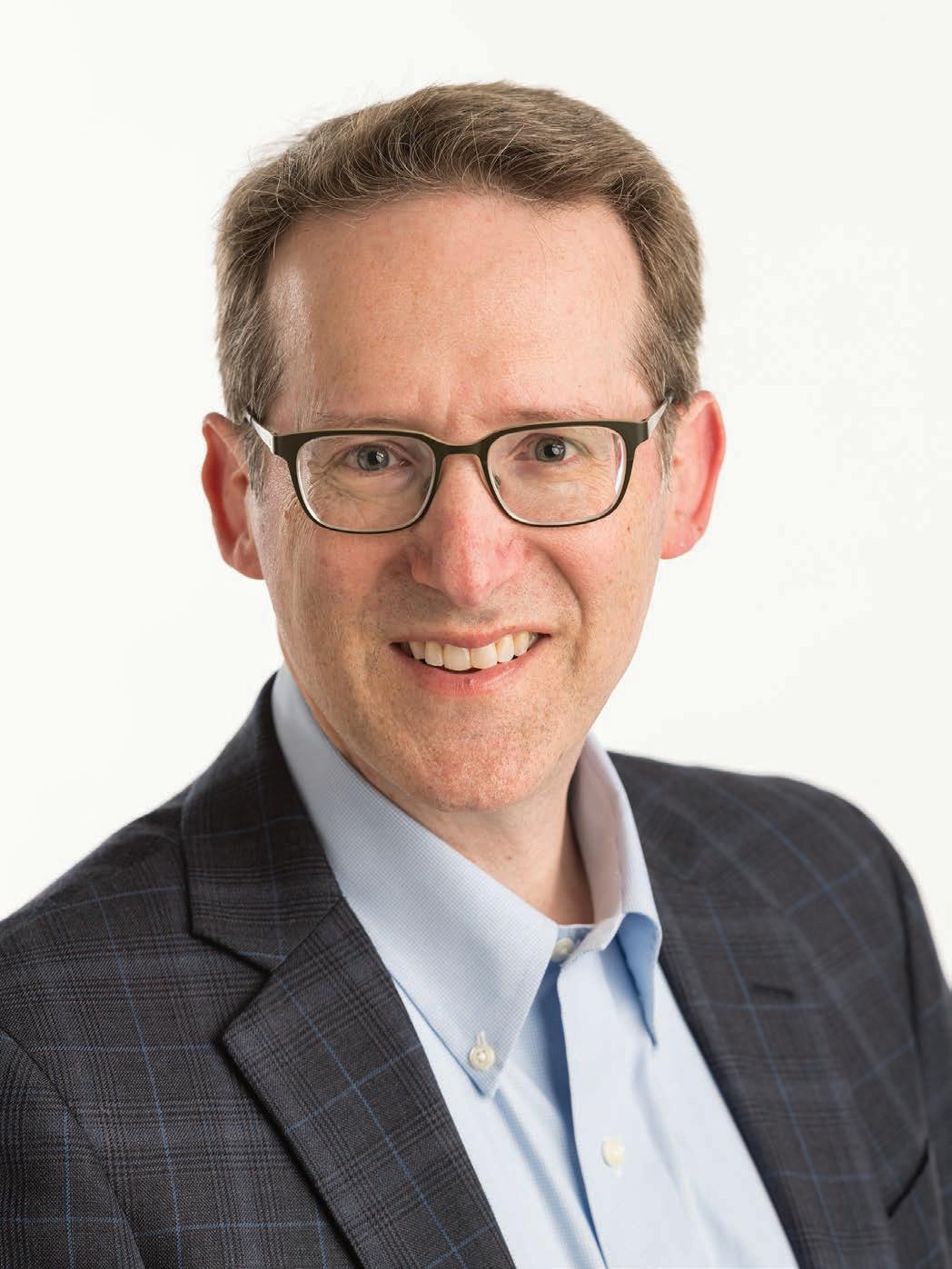
DAVID M. UHLMANN
DAVID M. UHLMANN WILL BE VISITING GW LAW FOR academic years 2025-26 and 2026-27. An internationally recognized expert on environmental law, he brings more than three decades of leadership experience solving some of the nation’s most prominent and challenging environmental enforcement issues.
From 2023 to 2024, Uhlmann served as the U.S. Environmental Protection Agency’s assistant administrator for enforcement and compliance assurance—the top enforcement official in the United States—under President Joseph R. Biden. From 2022 to 2023, he was deputy assistant administrator and senior advisor to the EPA administrator while awaiting Senate confirmation.
Prior to joining the Biden administration, Uhlmann served from 2007 to 2022 as the Jeffrey F. Liss Professor of Practice and director of the Environmental Law and Policy Program at the University of Michigan Law School, where he was also a distinguished faculty fellow in sustainability. During that time, he was counselor to the VW Compliance Monitor and Auditor appointed by the Justice Department and EPA after the VW diesel emission cheating scandal.
Earlier in his career, Uhlmann served in various high profile roles at the U.S. Department of Justice, including as chief of the Environmental Crimes Section, where he was the top environmental crimes prosecutor in the country. His office was responsible for the prosecution of environmental and wildlife crimes nationwide, and he chaired the Justice Department’s Environmental Crimes Policy Committee. His work as lead prosecutor in United States v. Elias, a knowing endangerment case that left a 20-year-old worker severely and permanently brain-damaged, is chronicled in The Cyanide Canary.
Uhlmann brings expertise in corporate crime, criminal and civil enforcement of environmental laws, and climate change and sustainability to GW Law.


FACULTY TACKLE ENVIRONMENTAL ISSUES HEAD ON W
HILE THE NEW ADDITIONS TO THE ENVIRONmental and Energy Law program’s faculty will advance the impact and prestige of the program, GW Law’s current program faculty have already made their mark on national environmental law and policy. Their efforts are part of GW Law’s mission to make an impact on the law through the leadership of our diverse faculty and staff.
Two professors in particular—Robert Glicksman and Emily Hammond—have dedicated much of their time over the past year to policy efforts in environmental law.
Glicksman, the J. B. and Maurice C. Shapiro Professor of Environmental Law, has sought to influence law and policy in his areas of expertise— administrative law, environmental law, and natural resources law—throughout his career. For 17 years, he served as a member of the board of directors of the Center for Progressive Reform, a non-profit research and advocacy organization that conducts independent scholarly research and policy analysis, and advocates for effective, collective solutions to our most pressing societal challenges.
“Working at GW Law gives me opportunities to provide input into the environmental policymaking process that would be hard to duplicate at other law schools,” Glicksman said. “Because GW Law is located in the nation’s capital, the predominant center of national policymaking, members of the press regard its professors as important sources of information on legal and policy issues in areas such as environmental law.”
During the Biden administration, the Council on Environmental Quality invited Glicksman to participate in its efforts to revise the
WORKING AT GW LAW GIVES ME OPPORTUNITIES TO PROVIDE INPUT INTO THE ENVIRONMENTAL POLICYMAKING PROCESS THAT WOULD BE HARD TO DUPLICATE AT OTHER LAW SCHOOLS.
- ROBERT GLICKSMAN


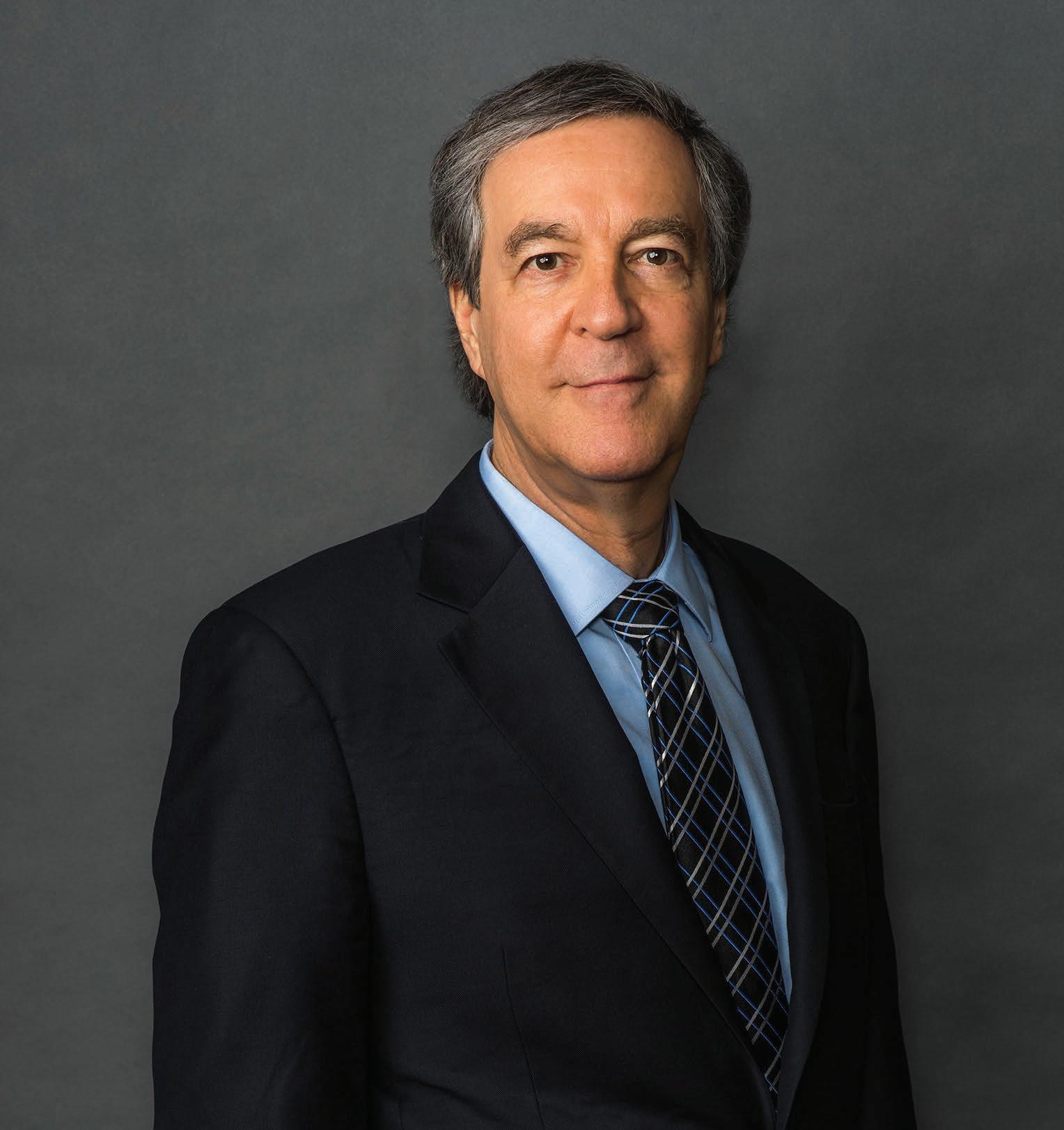
regulations that implement the National Environmental Policy Act. Most recently, Glicksman submitted comments to the D.C. Council on a proposed bill to change the standard of judicial review of agency decisions, which resulted in changes to the bill that he recommended.
Glicksman also consulted with federal administrative law judges in an effort to protect the independence of the agencies for which
WHEN GW LAW
FACULTY MEMBERS
ADVANCE POLICY PROPOSALS, OR CRITICIZE POLICY DECISIONS BY GOVERNMENT ENTITIES, IN PUBLIC FORUMS, THOSE ACTIVITIES REINFORCE THE PERCEPTION OF THE LAW SCHOOL AS A LEADER IN ENVIRONMENTAL LAW AND POLICY.
- ROBERT GLICKSMAN
they work. As a result, he received a Distinguished Service Award from the American Bar Association.
“When GW Law faculty members advance policy proposals, or criticize policy decisions by government entities, in public forums, those activities reinforce the perception of the law school as a leader in environmental law and policy,” Glicksman said. “Hiring multiple new faculty members with environmental law expertise this year will surely strengthen that reputation.”
Emily Hammond, the Glen Earl Reston Research Professor of Law, recently served as a presidential appointee for the U.S. Department of Energy, as deputy general counsel for litigation, regulation, and enforcement; and deputy general counsel for environment and litigation. They received the Secretary of Energy Achievement Award for their exemplary service.
Hammond is also a public member of the Administrative Conference for the United States and a member of the Department of Energy’s Appliance Standards and Rulemaking Federal Advisory Committee. They have testified before Congress many times in recent years on matters of administrative law, energy law, and environmental law, and they regularly contribute to amicus briefs and rulemaking comments.
Hammond also served as a member of the National Energy Agency Working Group on Nuclear Energy Law Curricula and the steering committee for the Environmental Law Institute’s Climate Judiciary Project’s Energy Transition curriculum. They are often quoted in news media, recently appearing in the New York Times, Washington Post, Scientific American, and Science
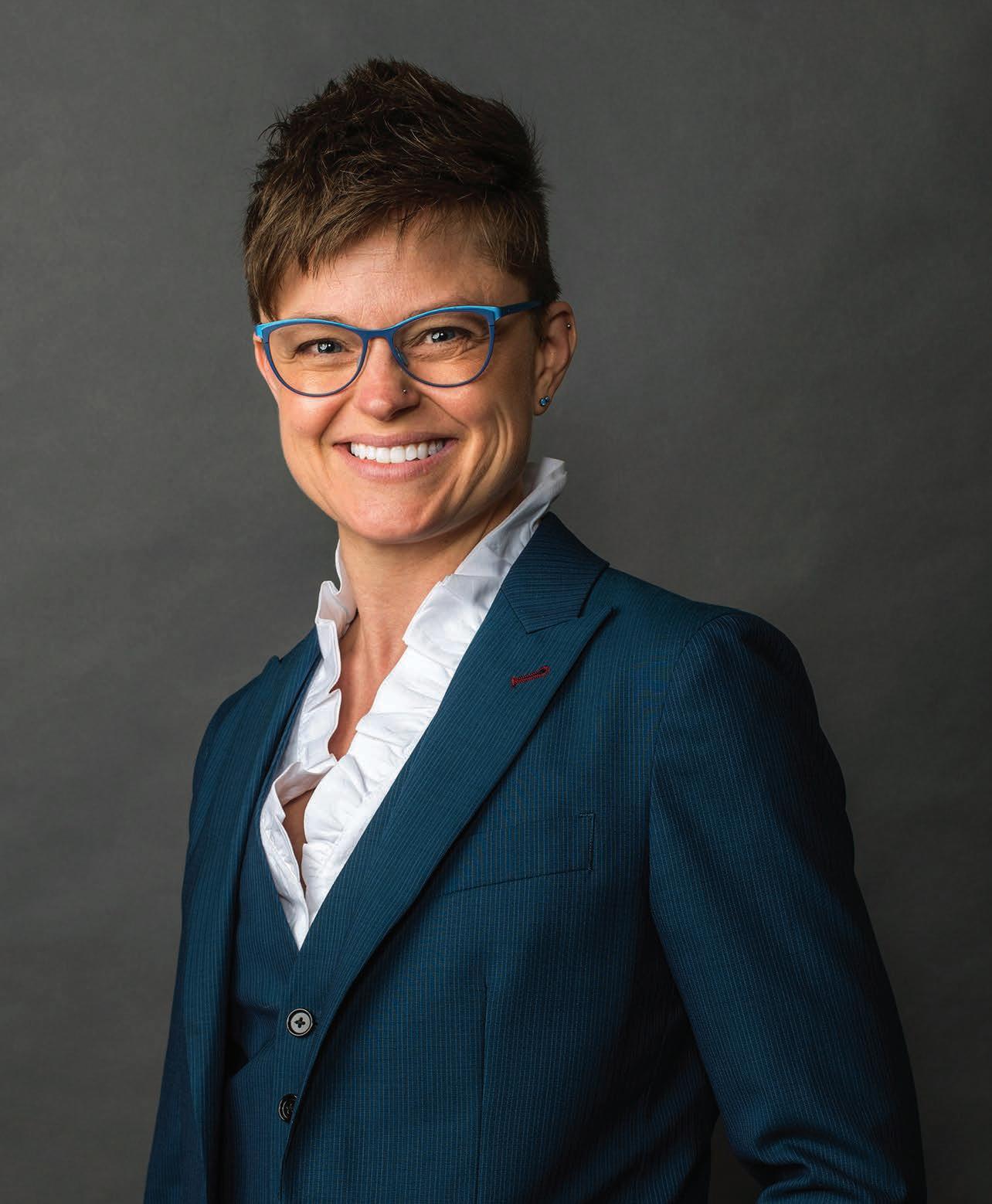
Robert Glicksman
Emily Hammond
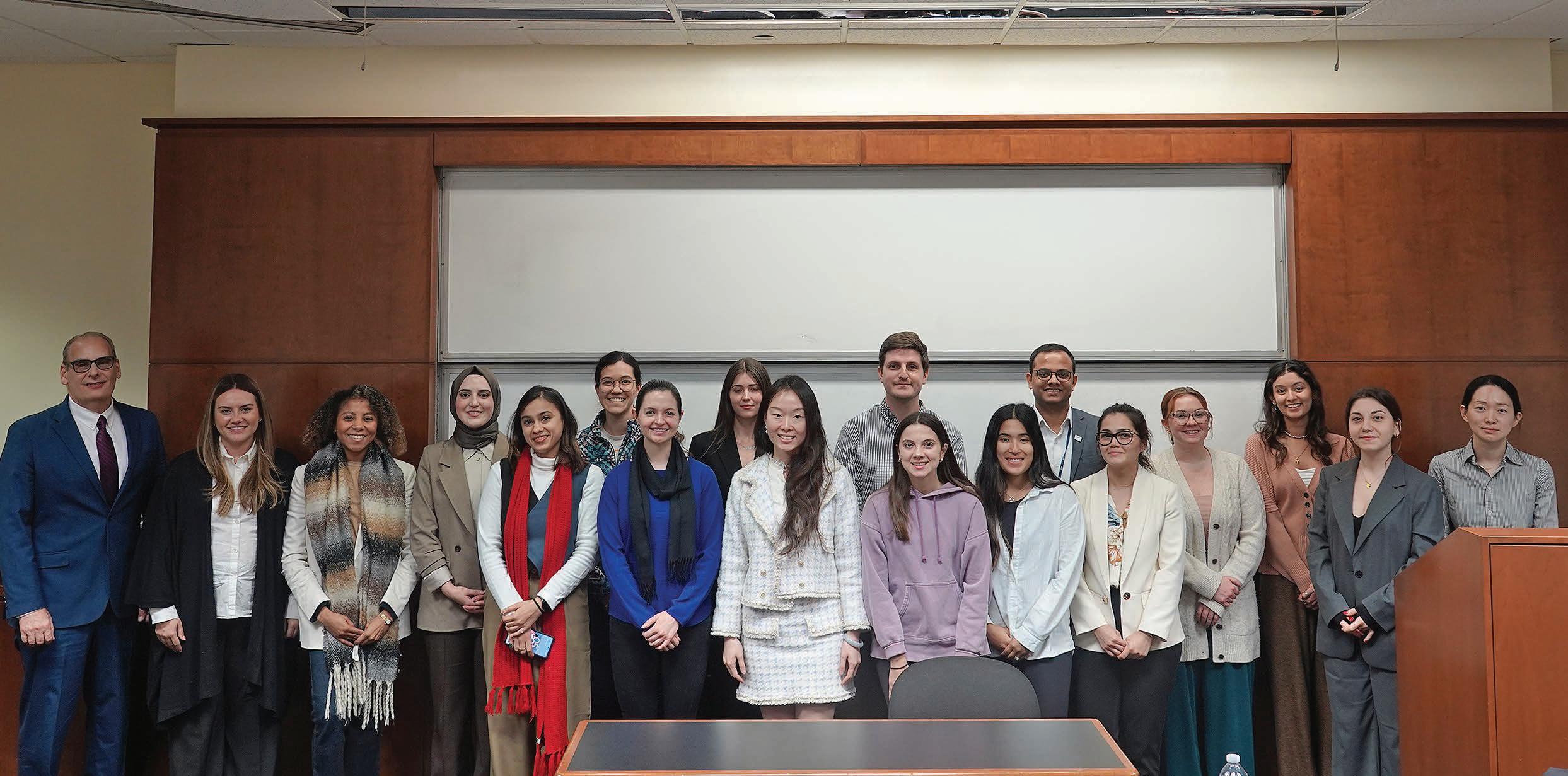
ELEVATING STUDENT SCHOLARSHIP
GWLAW PROFESSORS AREN’T THE ONLY members of the law school making an impact on environmental and energy law and policy. Thanks to the robust environmental law program headed by Assistant Dean Randall Abate, students are able to have their voices heard as well.
Within the past three years, Abate has mentored over 25 students in publishing environmental law papers in academic journals outside of GW Law. The students wrote and published the papers as part of seminar courses, independent research, and LLM thesis projects. They competed against law professors and attorneys from around the nation and world to be selected for publication in well-established and highly regarded journals, which include the Environmental Law Reporter, the Georgetown Environmental Law Review, the UCLA Journal of Environmental Law and Policy, the Villanova Environmental Law Journal, the Wake Forest Journal of Law and Policy, and the University of San Francisco Law Review
Several GW Law environmental law students have published more than one article during their time at GW Law. Aashini Choksi, JD ’24, for example, had four articles published while a student at GW Law.
“[Dean Abate] is an incredibly supportive mentor and helped me navigate the process of getting published, including how to strategize journal submissions, providing feedback on my written work, and inspiring me to aim high with multiple papers,” Choksi said. “He also invited me to co-author a paper with him and present our findings at a symposium, which was an invaluable experience. I hope to continue contributing to legal scholarship, and I credit a lot of my success to Dean Abate’s support.”
The student publications range in topics from climate change’s impact on U.S. Air Force facilities to deep-sea mining and efforts to protect rivers and species through Rights of Nature mechanisms. Some students were able to publish papers that advanced research and scholarship that was personal to them.
Juliette Jackson, LLM ’24, published a paper about her tribal community, the Klamath Tribes, titled, “Stop Killing the Klamath: Rights of Nature Protections with the National Historic
Preservation Act for a Tribe on the Front Lines of Climate Change,” which proposed an innovative legal solution to help save fish on the brink of extinction.
“My paper has been widely received by advocates and organizations in the Indigenous community in the U.S and abroad, and among environmental advocates and organizations,” Jackson said. Prior to the paper’s scheduled publication in June 2025, she presented her thesis findings to a variety of audiences, such as the GW Climate Health Institute, Women’s Earth Alliance, Bioneers Conference, Google, and at a Rights of Nature conference in Ecuador. “These opportunities allowed me to connect and grow my network and positioned me to retain future clients and job opportunities. Dean Abate made all of this possible by recruiting me for the LLM program and guiding me through the writing and publication process.”
The volume of published GW Law students is unique among law schools, Abate said. Many journals don’t allow student submissions, and it is tough competition to get published.
“Environmental law students at GW Law are getting published in law journals around the nation at an unprecedented rate that sets our program apart,” Abate said. “And the quality of the submissions is getting attention. In the 2023-24 academic year, two law journals revised their bylaws that previously prohibited consideration of student submissions to enable them to publish GW environmental law student submissions.”
GW Law is committed to providing students with an experiential education in which they make an impact on the legal field before graduating. All of Abate’s published students can say they’ve already done that.
“This level of success takes a village,” Abate said. “It starts with our remarkably talented students who learn legal research and writing skills from exceptional Fundamentals of Lawyering faculty and experienced experts on the reference librarian staff at GW Law. Those skills are enhanced when the students learn about environmental law from the outstanding full-time and part-time professors in our program.”
Assistant Dean Randall Abate with some of his 2025 environmental law students
Launching a Legacy of Giving
Double Impact: Alumni Gifts go Twice as Far
by Sarah Kellogg

PHILANTHROPY ISN’T ONLY about giving. It’s about vision, legacy, and an audacious hope to reshape the world. The right donation at the right time can topple barriers and fuel innovation. It’s a force, especially when matched and multiplied, that turns generosity into something far more powerful: lasting change.
In recent months, 10 generous alumni and supporters have leveraged GW Law’s 2024–2025 Scholarship Endowment Match to double the value of their donations. Thanks to $500,000 in dollar-fordollar matching funds, the transformative initiative has helped underwrite endowed scholarships for students with demonstrated financial need and academic merit.
“This is a remarkable moment to make a difference,” said Dean Dayna Bowen Matthew. “Through our 2024–2025 Scholarship Endowment Match, every contribution is amplified. Together, our donors are
expanding access to a world-class legal education for students of exceptional promise and need. By investing now, they are helping to unlock opportunity, fuel ambition, and shape the future of the legal profession.”
The match was available through June 30, 2025, or until all matching funds became fully committed, whichever came first. With the campaign, GW Law has sought to grow its scholarships for JD students and to ensure a quality education is within reach for those who have proven merit and need.
Among the donors who have committed to the matching program, each shares a dedication to GW Law and its mission. Yet, their motivations are diverse, ranging from a desire to give back and support impactful initiatives, to fostering the success of deserving students and establishing a lasting legacy that transcends their own professional journeys and personal lives.
FOR CYNTHIA M. PATTON, JD ’86, philanthropy is more than a tradition. It’s a legacy of impact rooted in gratitude, resilience, and a belief in the future. In a deeply personal tribute, she has chosen to endow and name a scholarship to honor her stepdaughter, who graduated this spring from GW Law.
“She’s brilliant, compassionate, and deeply committed to making a difference,” said Patton, who believes the Sarah B. Robinson Social Justice Scholarship will honor her beloved stepdaughter while also challenging the honoree to excel in her own legal career. “I’m hoping Sarah will contribute to this scholarship in her name as she advances and is more able to give.”
This act of naming is more than symbolic. It’s a celebration of family and the powerful ripple effects of education and opportunity. For Patton, giving to the law school is also a way of staying connected to the community that shaped her, while helping mold the leaders of tomorrow, especially those scholars who have tremendous need. Patton has committed $125,000 for the scholarship, which totals $250,000 with the match.
Patton’s journey through law school was transformative, shaping not only her career but her core values. “I wouldn’t be where I am without the support I received from GW,” said Patton, who is general counsel and secretary of Tessera, the biotech and healthcare company. “Giving

back is about lifting up the next generation, especially students who, like me, were the first in their families to attend law school.”
The scholarship is designed to support firstgeneration law students. “I had a full academic scholarship, and then took out loans to live on because my parents could not afford to pay for law school,” said Patton. “Naming the scholarship in my stepdaughter’s honor is a way to recognize her spirit and the shared values that connect us.”
Her giving isn’t just financial. Patton is deeply engaged in supporting young people throughout their legal journeys, both with her stepdaughter and the young attorneys who come to her company. Her vision for philanthropy is holistic, one that includes emotional investment, practical guidance, and creating a legacy that lives beyond a single donation.
Cynthia M. Patton
Leading by Example
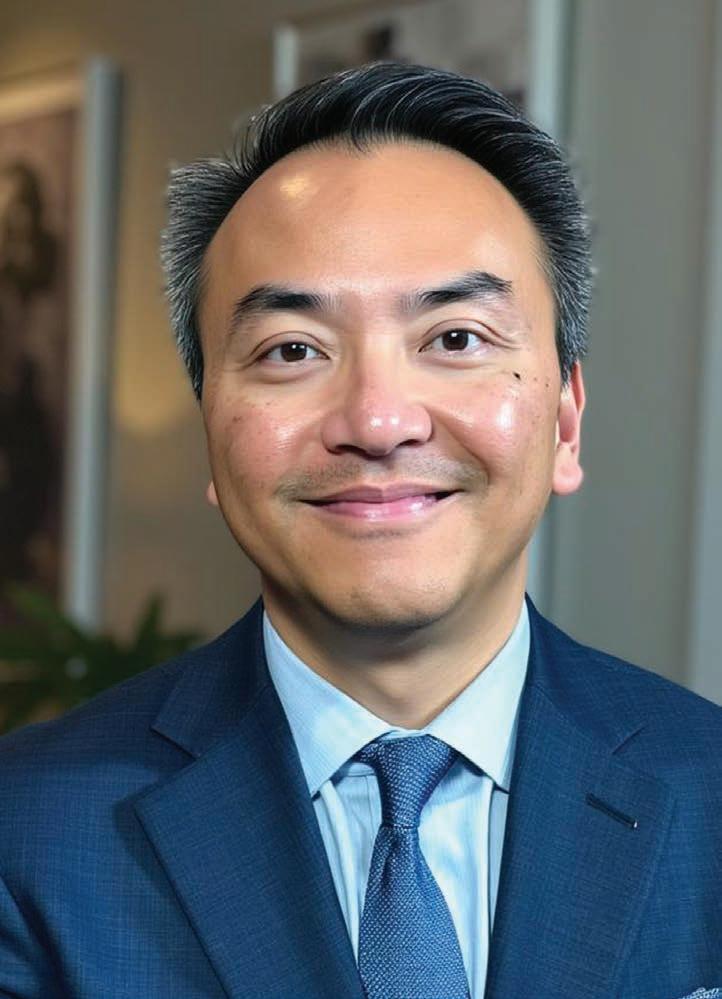
Joseph Chan
JOSEPH CHAN’S STORY begins, like many at GW Law, with ambition, curiosity, and a determination to succeed.
For Chan, JD ‘94, the school was a steppingstone to a legal career, and a transformative experience that shaped his professional path and personal values.
“GW gave me so much—an excellent education, critical opportunities, and a network that’s been vital throughout my life,” said Chan, senior counsel for Sidley Austin LLP, in the firm’s New York office.
“Giving back is a way of saying thank you.”
A successful corporate attorney and member of GW Law’s Business and Finance
Law Advisory Council, Chan committed to a gift of $50,000—totaling $100,000 with the match—to encourage others to support the school. His reason is simple and heartfelt: gratitude.
Chan sees his support, especially the scholarship endowment he helped fund, as a way to open doors for students who might not otherwise have access to a legal education. “I want bright, driven students to have the same opportunities I had, regardless of their financial background,” he explained. “I hope this inspires others to give back in whatever way they can.”
Chan recalls with fondness
Philanthropy as a Collective Endeavor
FOR MORE THAN 35 YEARS, Professor Stephen Saltzburg has called GW Law his home. His deep connection to the institution is reflected in his steadfast financial support, a commitment he shares with his wife, and his unerring commitment to the scholarship and academic life of the institution.
“I give money every year to the University of Pennsylvania, where I went to law school, and I give money every year to GW, because it’s been my home for 35 years now,” said Saltzburg, the Wallace and Beverley Woodbury University Professor of Law and co-director of the Litigation and Dispute Resolution Program. During this matching campaign, Saltzburg committed $50,000, totaling $100,000 with the match.
To Saltzburg, philanthropy isn’t an obligation. It is an act
of devotion and an investment in the future. “I love the institution, and I think that one of the ways that you show your affection is to donate, to give back something to an institution that’s done a lot for me,” he said, adding that he wants GW Law to continue to thrive and support future generations of students.
Saltzburg and his wife, Susan Lee, are deeply involved in charitable efforts, particularly at GW Law and the National Cathedral, where she serves on the Dean’s Council. This shared passion for giving reinforces the idea that philanthropy is a collective endeavor, one that strengthens institutions and builds lasting legacies. “My wife and I enjoy supporting the charitable organizations that we are associated with,” he says, emphasizing how important it is to approach giving as
a couple. “She’s very big at the National Cathedral... and I give my emphasis to GW.”
For those considering how they can make a difference, Saltzburg suggests that giving to something you care about and where you have a sense of belonging can be a good start. And, as he and his wife exemplify, doing so together makes the impact even greater.
His story is a testament to the power of giving and the importance of supporting institutions that have shaped one’s life. Through his contributions, Saltzburg helps ensure that GW Law remains a place of excellence for future students, faculty, and the broader legal community. His belief in giving as a couple further reinforces the idea that philanthropy is most powerful when it is a shared commitment.
his life in Washington, D.C., the cultural offerings, and the spirit of service embedded in the community. His own legal journey led him to Shanghai for Sidley Austin and a stint as chief legal officer at Yum China Holdings before returning to Sidley Austin’s New York office.
The matching gift program, in particular, reflects a desire to encourage a culture of giving among the law school’s alumni community. “Every gift, no matter the size, has the potential to change a student’s life,” he emphasized. “If we all contribute, we create a ripple effect, and hopefully see more scholarships, more resources, more opportunities.”

Stephen Saltzburg
Advancing Health Law
A Legacy of Learning and Giving
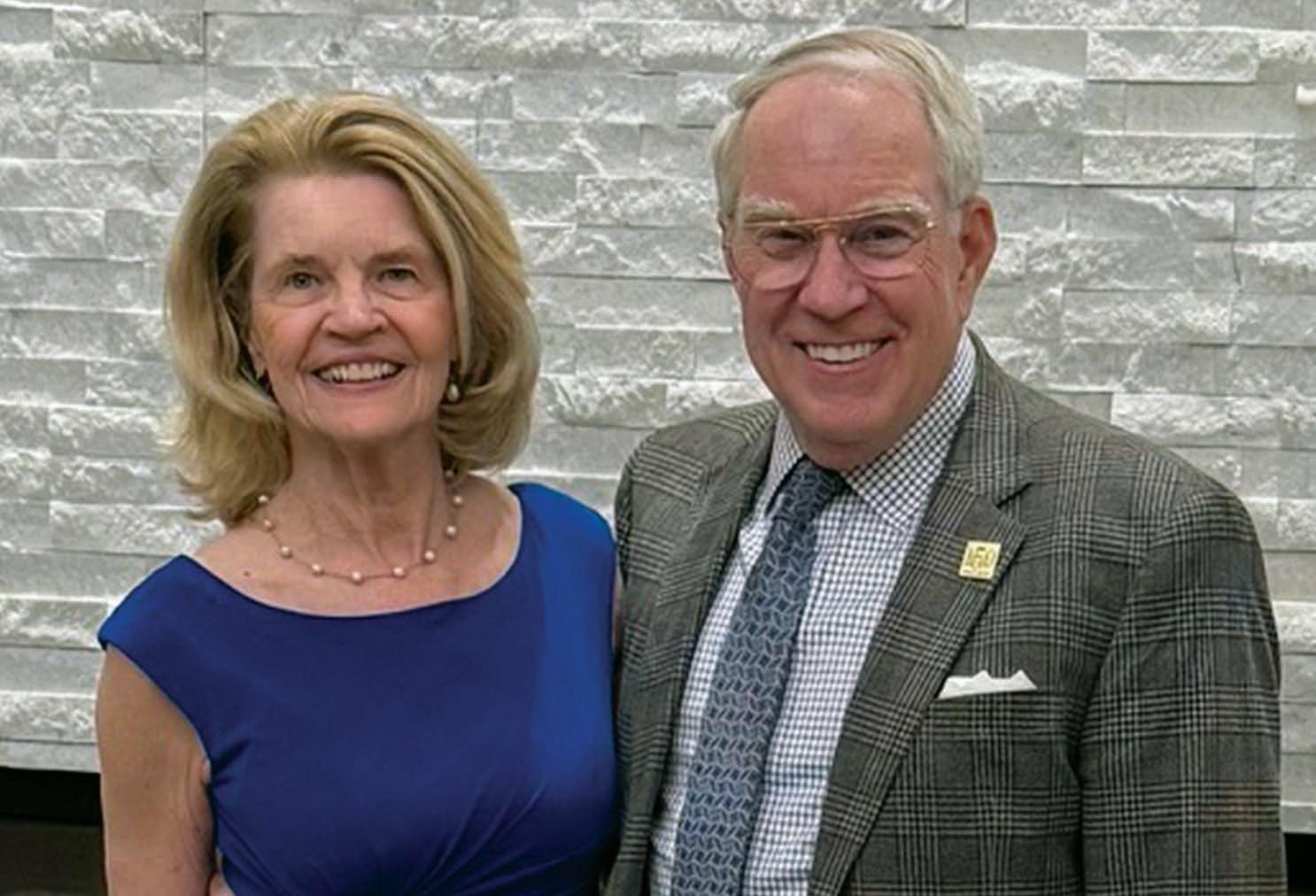
FOR WESTON D. “WES” Burnett, JD ’75, LLM ’83, giving back is not just a choice. It’s a family tradition. Born into a lineage of educators and public servants, he was raised with an unwavering belief in the transformative power of education.
His grandparents helped fund his and his siblings’ education, and he and his wife, Barbara, have carried the torch forward in their generation, already pre-funding the educations of their grandchildren. They donated $100,000 to the GW Law Scholarship Endowment Match campaign, boosted to $200,000 with the match.
That spirit of generational giving runs deep. Both his father and grandfather—Naval Academy graduates—sought out unfunded midshipmen and personally supported them. His grandfather even endowed the Naval Academy Library archives after authoring four naval history books. He recognized the importance of preserving institutional
knowledge without expecting federal support.
“My grandfather had a real passion for international affairs and shared that with me,” said Burnett, who is principal wealth manager for Creative Planning, a financial services firm. “Barbara and I have lived on three continents, and on both coasts here in the United States during our marriage.”
Following in his family’s footsteps, Burnett served 27 years in the U.S. Navy before retiring in 2000. Along the way, he married Barbara, just a week after her graduation from Vanderbilt University. With just enough savings to cover a year and a half of law school and a modest salary from her teaching, Burnett graduated from GW Law without debt, a feat he attributes to hard work and support from loved ones.
That debt-free start and the skillset he acquired at GW Law shaped his life. “From my perspective, the law school gave me the analytical tools to do a great job for the Navy for 27 years, and then to
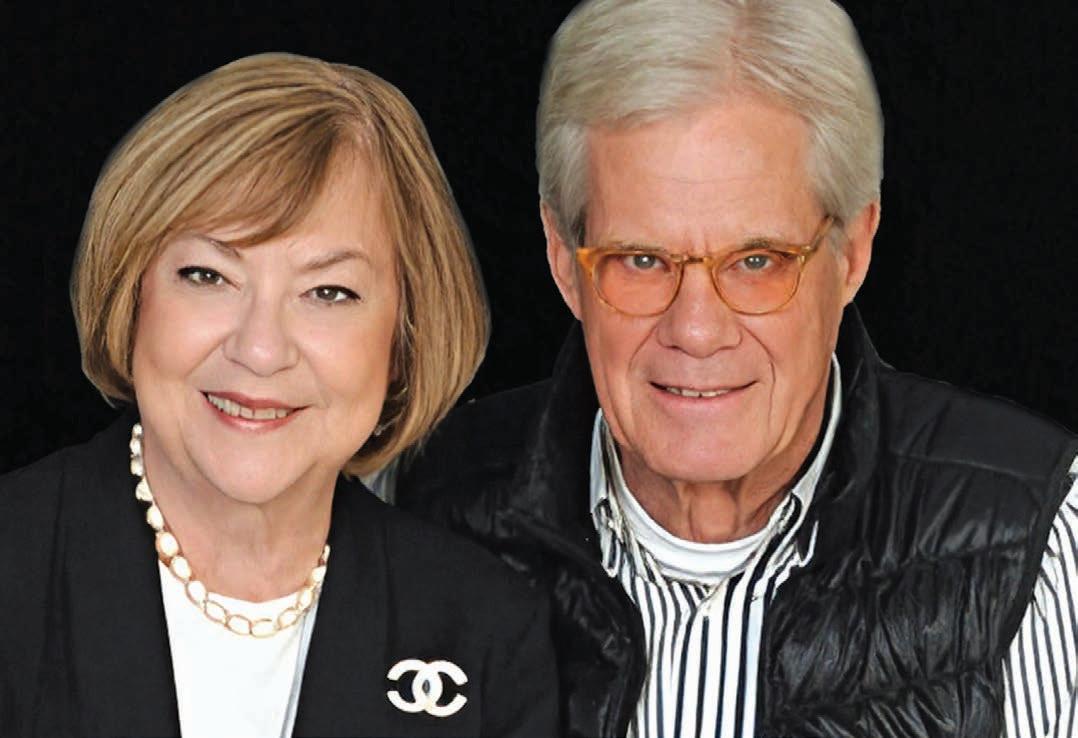
WHEN THOMAS AND ILONA Fox reflect on their journey, from young newlyweds scraping together law school tuition on a Fairfax County, Va., teacher’s salary (hers) to globetrotting professionals, they do so with pride, gratitude, and a desire to give back.
That commitment to giving has been made tangible through their generous support of GW Law’s Health Law Program. They helped plant the seeds for the program a decade ago and are now proudly nurturing it with an additional gift.
Thomas Fox, JD ‘66, built a distinguished legal career specializing in healthcare law—a field that barely existed when he began. After serving
start fresh at 50 and excel for another 20 years,” Burnett said.
After retiring from the Navy, he launched a law and financial services firm, offering interdisciplinary support in legal, tax, financial, and insurance matters. The business eventually merged with a larger company, which he still works with, capping off a second distinguished career.
Burnett sees his philanthropy to GW Law as both
in the U.S. Army during the Vietnam War, Fox returned to Washington, D.C., in 1970 to begin practicing law. Over the decades, he would help build a nationally recognized healthcare practice within his firm, ultimately retiring from Reed Smith after more than 40 years. His career spanned landmark developments in Medicare and Medicaid and later focused on the complexities of the Federal False Claims Act.
“My wife and I had known each other in college and became engaged,” said Fox. “And I said, ‘it might be a good idea to get married,‘ I said, because we can combine assets. And she said, ‘but you don’t have any assets.’ I told
repayment and investment. It’s a way to honor the values instilled in him by his family, education, service, and support for the next generation. Just as his family gave so he could thrive, the Burnetts are ensuring that future lawyers can do the same.
“We support things we think will be better because of it,” he said simply. “For us, that’s GW Law, which helped us both go so far.”
Ilona and Thomas Fox
Barbara and Wes Burnett
her not to worry, it would be a good bet in the long run.”
The Foxes’ commitment to GW Law is a shared passion. “We do this together,” Fox said of his wife, a former French teacher. She has been an enthusiastic partner in their philanthropic journey ever since the beginning. “I think I’ve paid back her investment in me,” said Fox, noting that his practice has taken them beyond Washington, D.C., to live in San Francisco and London. “It’s been a very good life.”
In 2015, the couple created the Thomas and Ilona Fox Health Law Scholarship with an initial gift of $50,000 and an additional $15,000 to get it off the ground. Their aim was simple: to encourage and support students passionate about healthcare law. The program’s momentum stalled during a period of leadership transitions at the law school, but that didn’t last long.
“Meeting Dean Matthew was a game changer,” said Fox, when she arrived at GW Law. “Her enthusiasm and commitment were magnetic.” In a clever twist on pandemicera connection, the new dean invited donors to a virtual “wine and cheese” gathering— and made sure that wine and cheese were hand-delivered to the Foxes’ home before the Zoom began. “It was that kind of thoughtfulness and energy that showed us she meant business,” he said.
Reinvigorated by her vision, the Foxes doubled down. They pledged another $50,000, which was matched by the law school, and now another $10,000 donation to be matched. “We wanted to support her mission—not just with words but with action,” Fox said. “If Dean Matthew called today and asked for help, we’d say ‘yes.’”
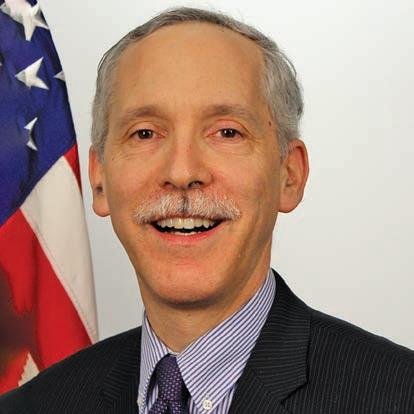
Matthew Blum, JD ’88
Blum Family Scholarship
$50,000 ($100,000 with match)

Thomas Fox, JD ’66, and Ilona Fox
Thomas and Ilona Fox Health Law Endowed Scholarship
$50,000 ($100,000 with match)
Joseph Chan, JD ’94
Joseph W. K. Chan Endowed Scholarship
$50,000 ($100,000 with match)
Professor Stephen Saltzburg
Susan Lee and Stephen A. Saltzburg Scholarship
$50,000 ($100,000 with match)
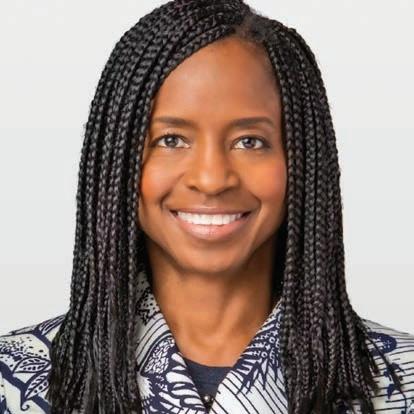
Cynthia M. Patton, JD ’86
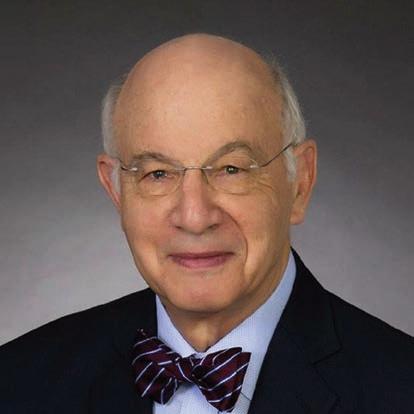
John Pachter, JD ’66 LLM ’70
John and Ilene Pachter Government Contracts Scholarship
$50,000 ($100,000 with match)
Sarah B. Robinson Social Justice Scholarship
$125,000 ($250,000 with match)
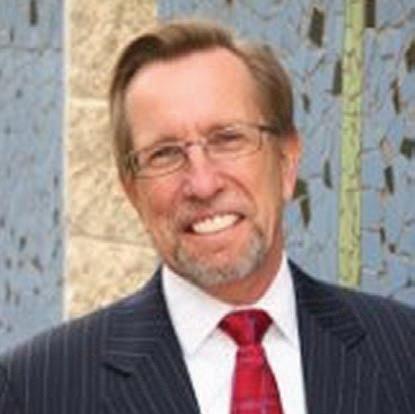
David Briggs, JD ’75
David Briggs Endowed Scholarship
$50,000 ($100,000 with match)
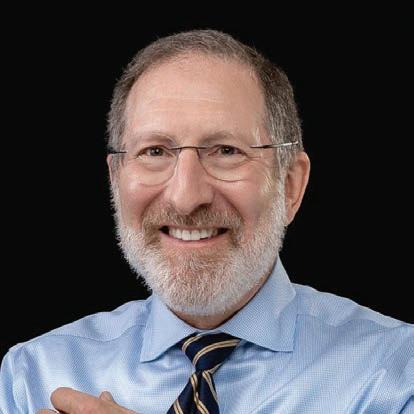
PRofessor Steven Schooner, LLM ‘89
Schooner Family Scholarship
$50,000 ($100,000 with match)
Weston D. “Wes” Burnett, JD ’75, LLM ’83, AND Barbara Burnett
Captain Weston D. Burnett, JAGC, USN (Ret), JD, LLM, and Barbara F. Burnett Endowed Law Scholarship
$100,000 ($200,000 with match)

Jeff Hessekiel, JD ’96
Heather Henson and Jeffrey Hessekiel Scholarship in Health Law and Policy
$50,000 ($100,000 with match)
class notes
ALUMNI NEWSMAKERS
1960s
Martin Weisfuse, JD ‘69, of Weisfuse & Weisfuse has been named one of the best personal injury lawyers of 2025 in Staten Island by Forbes.
1970s
Michael Heyman, JD ‘72, was appointed as the U.S. Attorney for the District of Alaska.
James Volling, JD ‘79, was honored by the American Bar Association with the Pro Bono Publico Award, the ABA’s highest pro bono recognition. He serves as senior counsel at Faegre Drinker.
1980s
Steven Anderson, JD ‘82, has joined Becker as shareholder. Eric Breslin, JD ‘82, a partner at Duane Morris, received the tenth annual Duane Morris Pro Bono Leadership Award.
Dorn McGrath III, JD ‘82, has joined the Washington, D.C., office of Dickinson Wright as a member. His practice focuses on government contracts.
William D. Addas, JD ‘84, was elected an independent member of the Rithm Capital Corp. board of directors.
Glenn A. Wood, LLM ’85, has joined Rubin and Rudman as chair of the firm’s environmental and land use group. Wood was also selected for inclusion on the 2025 Lawdragon 500 Leading Environmental Lawyers list.
Kivutha Kibwana, SJD ‘88, the former governor of Makueni County in Kenya, will direct the new Master of Laws Programme at Daystar University.
1990s
John Erly, JD ‘90, was appointed by Maryland Governor Wes Moore to serve as chair of the District 12 Trial Courts Judicial Nominating Commission. He is a partner at Cumberland & Erly, which he co-founded in 1995
Evan Koster, JD ‘90, has joined Baker Botts as a partner in the firm’s corporate practice and as head of its derivatives practice based in New York.
Janene M. Marasciullo, JD ‘90, has joined the Elisabeth Haub School of Law at Pace University as director of the Fairbridge Investor Rights Clinic and an adjunct professor.
Mark Bank, JD ‘91, of Bank Rifkin has been named one of the best divorce lawyers in Detroit by Forbes.
Tod Cohen, JD ’92, a leader in artificial intelligence, data protection and technologyrelated law, has joined Manatt, Phelps & Phillips as a partner in the firm’s San Francisco-based digital and technology group.
Dean Conway, JD ‘92, has joined Carlton Fields as a shareholder in the firm’s securities litigation and enforcement practice.
ALUMNI PROFILE
Interpreting the Halls of Power
IN A TOWN LIKE WASHINGTON, D.C., FULL OF TALKING POINTS and tight-lipped politicians, PAMELA BROWN, MSL ‘23, never was content to take anyone’s word at face value. As a long-time investigative journalist for CNN, she always knew how to ask the right questions.
But when the soundbites got more slippery and the stakes higher, she craved something sharper. So, in the middle of juggling her young children and a demanding job at CNN, she did the unimaginable: she went to law school.
“For professionals like journalists who need to understand the law to be better at their jobs,” said Brown, who is the daily co-host with Wolf Blitzer of The Situation Room on CNN, “a Masters of Studies in the Law was like a program that had been written just for me.”
The MSL gave Brown a new kind of journalistic strength. She dove deep into emerging issues like artificial intelligence (AI) and copyright, writing papers that would become eerily prescient as generative tech took center stage. Fraud and corruption classes taught her to untangle the legal labyrinths behind high-profile headlines about cryptocurrency and autonomous systems.
“It gave me confidence to not just ask questions, but to ask the right ones, and know when someone’s dodging the answer,” she said. “I know when they’re pretending to answer and when they’re just buying time. And I’ve learned how to press harder—smarter.”
GW’s faculty helped shape that edge. From courses on international corruption to sobering classes on national security and war crimes, Brown was able to translate legal nuance into journalistic
I REALLY LIKED BEING AT GW. THEY BUILT A PROGRAM FOR PEOPLE IN THE MIDDLE OF THEIR CAREERS WHO AREN’T LOOKING TO START OVER, BUT TO LEVEL UP.
— Pamela Brown
Michelle A. Johnson, JD ‘92, was appointed to serve as an administrative judge for the Queens’ (New York) Supreme Court, Criminal Term.
Ann Coffin, JD ‘93, a renowned expert in energy law, has joined Baker Botts as a partner in the firm’s global projects practice in Austin.
James E. Salitan, JD ‘93, has joined ConcertAI as general counsel.
Katayun Jaffari, JD ‘95, chair of the corporate governance and ESG practices and co-chair of the capital markets and securities practice at Cozen O’Connor, was installed as chancellor of the Philadelphia Bar Association.
Joshua M. Henderson, JD ‘96, a principal in the San Francisco office of Jackson Lewis, has been appointed leader of the firm’s national workplace safety and health group.

clarity. “I came away not just more informed, but more fluent,” she said.
But for all the firepower the MSL gave her, Brown is quick to credit the community around it. The flexibility of evening and online classes and the intentional design of the program made it not just possible but joyful. “I really liked being at GW,” she said. “They built a program for people in the middle of their careers who aren’t looking to start over, but to level up.”
Brown had the opportunity to feature one of her own professors on air, engaging Jessica Tillipman, associate dean for government procurement law studies and distinguished professorial lecturer in government contracts law, practice & policy, in a thoughtful discussion about Trump administration policies in February 2025.
Now, from the anchor desk, Brown wields her knowledge of the law to cut through confusion, legal spin, and political fog. She sees herself as sharing that understanding with viewers to help educate them and prepare them for the day.
“A simple part of my job is informing people about what’s happening in the world around them, and that’s a big responsibility,” said Brown. “The stakes are really high for me in making sure that we inform people with the facts and the truth.”
— Sarah Kellogg
of the firm’s energy and sustainability practice.
Scott M. Grossman, JD ‘99, was appointed to serve as chief judge of the U.S. Bankruptcy Court for the Southern District of Florida.
Piper F. McKeithen, JD ‘99, was appointed by Maryland Governor Wes Moore to serve on the Baltimore City Circuit Court.
2000s
Daanish Hamid, JD ‘00, has joined Potomac Law as a partner in the firm’s Washington, D.C., office.
Zachary Cunha, JD ‘01, has joined Nixon Peabody as a partner in the firm’s government investigations and white-collar defense practice. He is a former U.S. Attorney for the District of Rhode Island.
Charles Darr, JD ‘01, has joined the Cruise Lines International Association as president and chief executive officer.
Paul J. Cornoni, JD ’03, was named the 2025 Pro Bono Attorney of the Year by the District of Columbia Bar Association. He is a partner at Regan Zambri Long and an adjunct professor of trial advocacy at GW Law.
John R. Spagna, JD ‘03, has joined the New York firm Clayman Rosenberg Kirshner & Linder as a partner. He is the former chief of the New York State Attorney General Office’s real estate enforcement unit.
Kenneth English, JD ‘04, was sworn in as a Superior Court judge for Sonoma County, Calif., in January.
Col. James H. Kennedy III, LLM ‘04, has assumed the role of chief executive officer and dean of New England Law/ Boston. He previously served as the commandant of the Air Force Judge Advocate General’s School at Maxwell Air Force Base in Alabama.
Darren V. Roman, JD ‘96, has joined Dorsey & Whitney as of counsel in the firm’s finance and restructuring group in Phoenix.
Regine Thompson, JD ‘96, a district magistrate judge in Kansas, was re-elected to a second term as president of the Kansas District Magistrate Judges Association.
Julie Anna Potts, JD ‘97, CEO and president of the
Meat Institute, was named 2024 Most Impactful Woman of the Year by the Women’s Meat Industry Network.
Alex Vogel, JD ‘97, was appointed by Virginia Governor Glenn Youngkin to serve a six-year term on the board of directors of the Metropolitan Washington Airports Authority.
Luis Torres, JD ‘98, has joined Mintz Levin Cohn Ferris Glovsky & Popeo as a member
Jason M. Marks, JD ‘01, was appointed chief legal officer of Prilenia Therapeutics B.V., a clinical stage biotechnology company focused on developing novel therapeutics to slow the progression of neurodegenerative diseases and neurodevelopmental disorders.
Jeffrey P. MacHarg, JD ‘02, the managing partner of Fox Rothschild’s Charlotte office, was featured on North Carolina Lawyers Weekly’s Managing Partners to Watch list.
Vinu V. Pillai, JD ‘02, has joined Morris & Dickson as chief compliance and regulatory officer.
Shawnte M. Mitchell, JD ‘04, was appointed chief legal officer and corporate secretary of Olema Pharmaceuticals, Inc., a clinical-stage biopharmaceutical company.
Amy E. Moses, JD ‘04, was appointed to serve as a U.S. Magistrate Judge for the district of Rhode Island. She took the bench in May.
Katherine White, JD ‘04, was appointed deputy director of the Bureau of Consumer Protection at the Federal Trade Commission.
Piyush Gupta, LLM ‘05, was appointed head counsel of Etihad Airways in the United Arab Emirates.
Lesley Janzen, JD ‘05, has joined Cleary Gottlieb as
A Journey from Law to Sustainability
AS A COLLEGE STUDENT, ANDREW MAYOCK, JD ’95, SECURED an internship in the office of U.S. Representative Joe Kennedy. That formative experience planted the seeds of a career devoted to public service and ignited a passion for leveraging government policy as a catalyst for change.
That early introduction to the inner workings of Washington, D.C., while studying at the University of Illinois Urbana-Champaign, set Mayock on a trajectory that would carry him from GW Law to highlevel roles in the federal government and the White House. Over the course of his career, he would go on to serve under three U.S. presidents: Bill Clinton, Barack Obama, and Joseph Biden.
GW Law proved instrumental in making those ambitions a reality. Mayock chose the institution not only for its academic excellence but also for its unparalleled proximity and access to the epicenter of American politics. For him, law school functioned as both a rigorous education and a strategic launchpad.
“I had an internship at the National Economic Council,” said Mayock, who now serves as vice chancellor for sustainability at the University of Colorado Boulder. “I loved the internship and the people I was working with. In my third year, I’d take my classes in the morning, and then I would show up at the White House at noon and work until midnight. It was an extraordinarily fulfilling experience for a young professional.”
Over the next two decades, Mayock navigated a dynamic path in and out of government service. His roles included special assistant and senior advisor during the Clinton administration, executive secretary at the Department of the Treasury, and deputy director of management at the Obama-era Office of Management and Budget. Under President Biden, he held the post of chief sustainability officer
WHETHER I’M IN THE GOVERNMENT OR IN THE PRIVATE SECTOR OR HERE IN THE NONPROFIT UNIVERSITY SECTOR, LAW AND POLICY FEATURE PROMINENTLY IN EVERY ROLE.
— Andrew Mayock
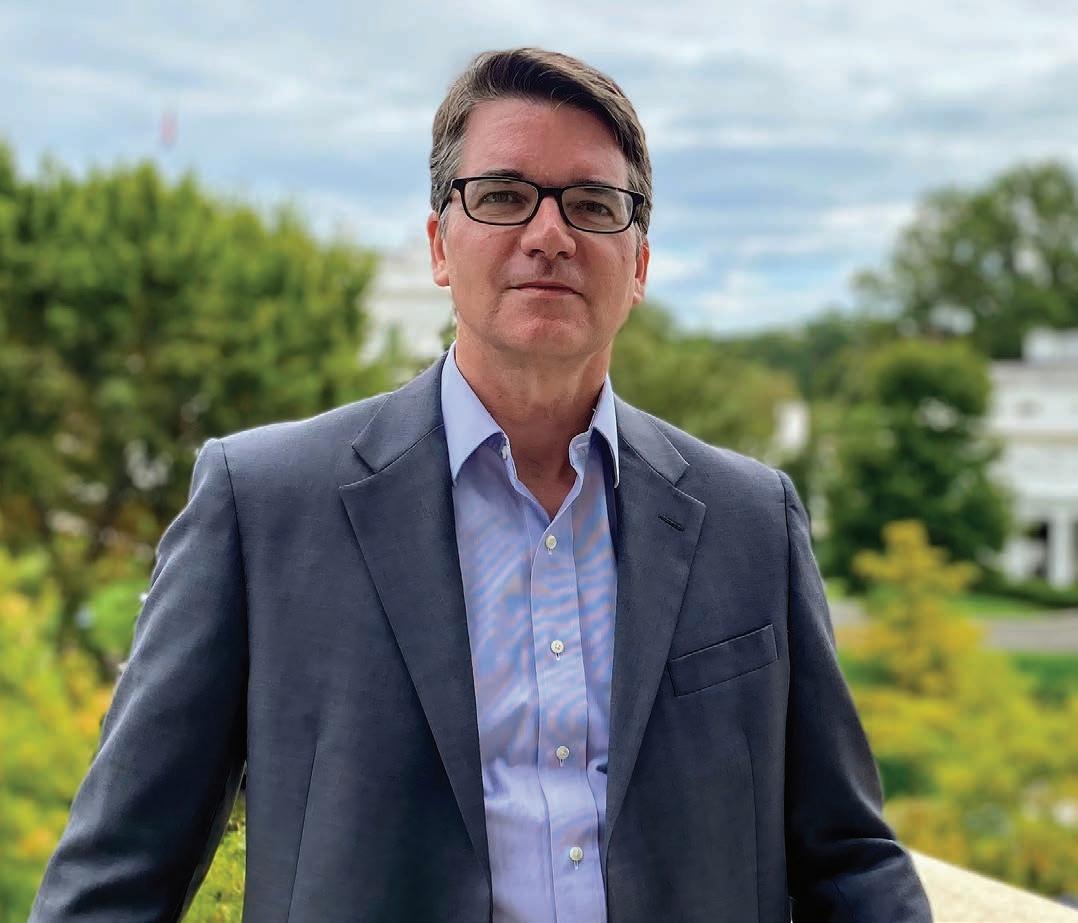
at the White House, among others. In the private sector, he brought his expertise to leading consulting firms McKinsey & Company and Booz Allen.
“I ended up working on a lot of Washington-centric issues, and I built a very Washington-centric career as a result,” said Mayock. “I was either in the Executive Branch in those three administrations or a management consultant in Booz Allen and McKinsey serving public sector clients. It really wasn’t until I moved to climate that my geographic opportunity set expanded.”
Mayock’s transition to climate and sustainability work felt like a natural evolution. Within the Biden administration, he turned his attention to environmentally conscious policymaking, blending his legal and economic acumen with an intensifying commitment to climate action. His work now reflects a deep recognition of the pressing need to safeguard the planet’s future.
Through it all, the foundation laid at GW Law remains a cornerstone. “Whether I’m in the government or in the private sector or here in the nonprofit university sector, law and policy feature prominently in every role,” said Mayock. “The legal landscape writ large how a bill becomes a law, how to read a law, how the regulatory system works, how litigation works, and how to be a strong partner with the general counsel feature prominently in all major activities.”
— Sarah Kellogg
a partner in the firm’s New York office, focusing on capital markets transactions.
Rahul Rao, JD ‘05, has joined White & Case’s Washington, D.C., office as a member of the antitrust team.
Taria Barron, JD ‘06, has joined the American Public Transportation Association as general counsel.
Jennifer Y. Chi, JD ‘06, founder of Live Good Inc., has been named a top “Innovator of the Year” by California’s Orange County Business Journal
Jason S. Gould, JD ‘06, has joined Lowenstein Sandler as a partner in the firm’s whitecollar defense and litigation practices. He most recently served as chief of the healthcare fraud unit at the U.S.
Attorney’s Office for the District of New Jersey.
Felix J. Kushnir, JD ‘06, has joined Fox Rothschild as a partner in the firm’s corporate department in Washington, D.C.
Adam Copeland, JD ‘07, has joined Wilkinson Barker Knauer as a partner in the firm’s Washington, D.C., office.
Patrick A. Fuller, JD ‘07, has joined Debevoise & Plimpton’s Washington, D.C., office as counsel in the firm’s banking group.
Zachary Sharpe, JD ‘07, has joined Lee & Ko as co-head of the international arbitration team.
ALUMNI PROFILE
From the Courtroom to the Sound Stage
SWAPPING THE STAID CORRIDORS OF A LAW FIRM FOR THE glitz and grit of Hollywood backlots was less of a leap of faith for litigation attorney BEN EVERARD, JD ‘09, and more of a planned evolution as he sought to combine his passion for the law with his affinity for entrepreneurship and storytelling.
After leaving GW Law, Everard worked as an associate at the Los Angeles office of litigation powerhouse Quinn Emanuel. There, he worked in part on entertainment matters, and soon was immersed in cases that dissected the fine print of creative ownership.
“I think I ultimately came out to L.A. with the intention of getting involved with entertainment in some capacity,” said Everard. “I just didn’t know exactly what that route would be.”
Exiting Quinn Emanuel, Everard immersed himself in the mechanics of film production, talent acquisition, and the labyrinthine business of financing movies. His legal background proved
THERE’S A LOT OF CROSSOVER BETWEEN LITIGATION AND MOVIE-MAKING. BOTH REQUIRE STRATEGY, UNDERSTANDING HUMAN NATURE, AND KNOWING WHEN TO PUSH AND WHEN TO PIVOT.
— Ben Everard
invaluable. He understood contracts better than most, knew where potential pitfalls lay, and had a sharp instinct for negotiations.
“I wasn’t coming in blind,” he said. “There’s a lot of crossover between litigation and movie-making. Both require strategy, understanding human nature, and knowing when to push and when to pivot.”
Everard also cultivated connections, bridging his legal network with industry insiders. His first production company partnership, Grey Matter Productions, quickly gained traction, bringing to life projects that merged his keen storytelling and screenwriting instincts with his unwavering attention to detail.
Michael Wise, JD ‘07, has joined Squire Patton Boggs. He will lead the firm’s U.S. antitrust practice.
Sheldon Gilbert, JD ‘08, was named president of The Federalist Society. He previously served as Walmart’s senior lead counsel for strategic initiatives.
Kyle Hepner, JD ‘08, was elected to partnership at
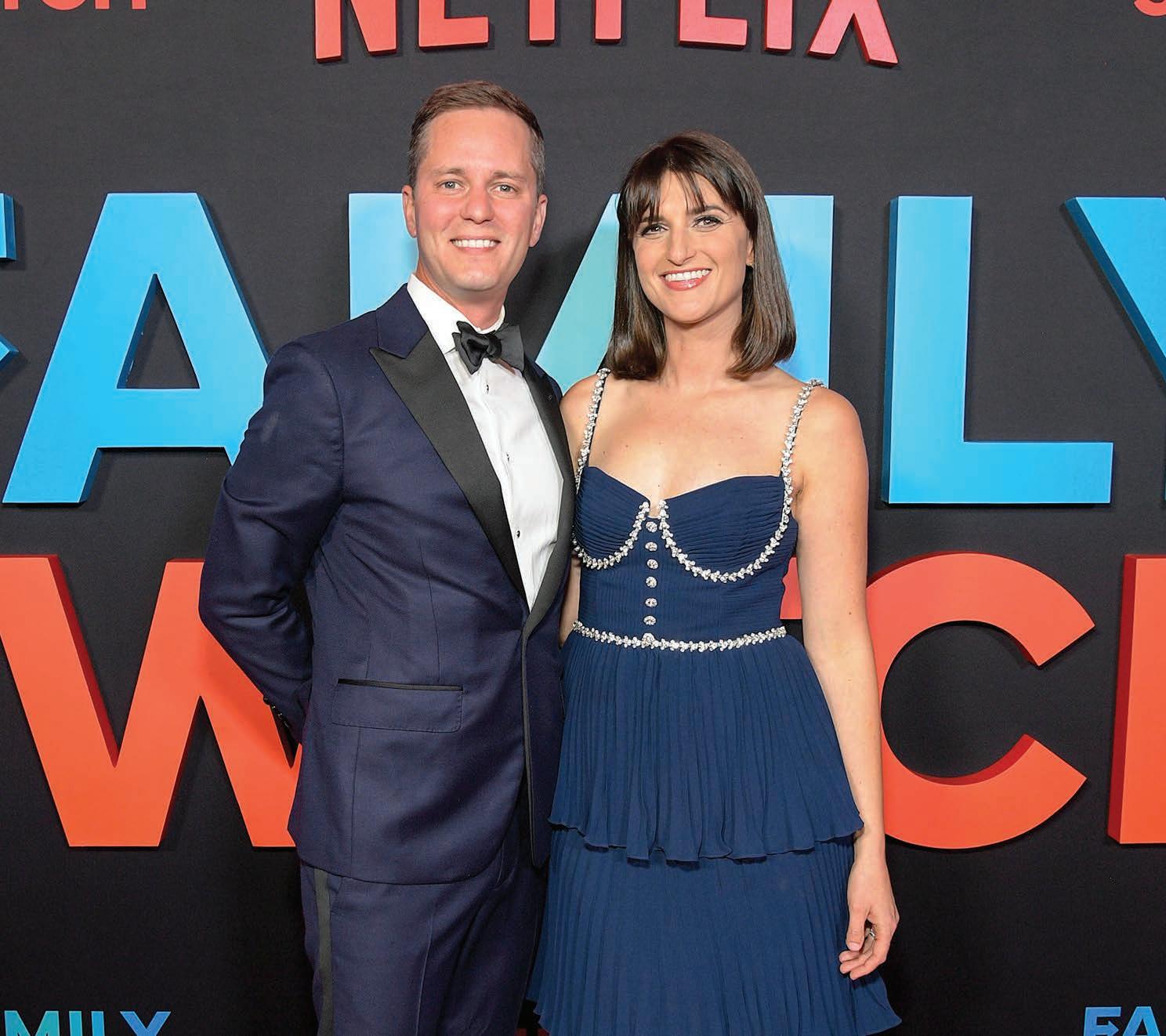
Today, he is a Hollywood film producer, and his company, Everard Entertainment, is working with the biggest names in the movie business, including actors Chris Pratt and Arnold Schwarzenegger. His latest major production is the Skydance/Apple film “Way of the Warrior Kid.”
Everard said one of his biggest challenges these days is navigating the ever-changing landscape of theatrical productions and streaming platforms, where artificial intelligence and digital disruption are redefining the film industry. He predicts cinemas will never disappear, despite the shrinking number, because it’s still too good a night out and for a decent cost compared to sports and music venues.
Yet, his ambitions extend beyond saving the silver screen. His goal? To open doors for the next generation of creatives, particularly those who, like him, may have started their careers on an entirely different path.
“Sometimes you have to trust that the skills you’ve developed will translate into new spaces,” he said. “Hollywood may seem worlds apart from litigation and the law, but at the end of the day, both industries are about understanding people and telling compelling stories.”
— Sarah Kellogg
Robinson Cole. He is a member of the firm’s intellectual property and technology group and the artificial intelligence team.
Seth Locke, JD ‘08, has joined WilmerHale, where he practices in the firm’s defense, national security, and government contracts group.
Revathi Raghavan, LLM ‘08, has joined Paul, Weiss, Rifkind,
Wharton & Garrison as a partner in the firm’s investment funds group, resident in London.
Stephen J. Snyder, JD ‘08, has joined Womble Bond Dickinson’s Washington, D.C., office as a partner in the firm’s business litigation practice group.
Kara M. Ward, JD ‘08, a former attorney and advisor with the
U.S. Department of the Treasury, has joined Baker Donelson as a shareholder in the firm’s Washington, D.C., office.
Scott Armstrong, JD ‘09, has joined McGovern Weems as a principal in the firm’s Washington, D.C., office.
Ian Barlow, JD ‘09, has joined Wiley Rein as counsel. He previously served for nearly a decade
Ben and Mary Everard at the L.A. premier of “Family Switch”
as a Federal Trade Commission official, including a year as deputy director of the FTC’s Office of Policy.
Dohm Chankong, JD ‘09, was elected a director of Sterne, Kessler, Goldstein & Fox. He is a member of the firm’s electronics practice group.
Kristen Donaldson, LLM ‘09, has joined the National Association of Broadcasters as vice president of public policy.
Ricardo J. Pineres, JD ‘09, has joined the United States Senate Federal Credit Union as chief risk officer.
Michael Williams, JD ‘09, serves as the solicitor general of West Virginia, where he represents the state in strategic litigation and appeals. Before joining the Attorney General’s Office, he co-led Bush Seyferth’s complexbriefing and appeals group.
2010s
Ryan Keating, JD ‘10, has been elected to the partnership at Morris James, where he is a member of the medical malpractice group.
Tiana Bey, JD ‘11, was selected for inclusion in Marquis Who’s Who. She is an attorney and principal at TAB PC in Washington, D.C.
Kristen W. Broz, JD ‘11, co-chair of Fox Rothschild’s antitrust practice group, was recognized as a Washington, D.C., Rising Star by The National Law Journal
Louis C. Formisano, JD ‘11, was promoted to special counsel at Duane Morris. He practices in the areas of environmental and real estate law.
Ian Moss, JD ‘11, the former deputy coordinator for counterterrorism at the U.S. Department of State, has joined Jenner & Block’s Washington, D.C., office.
ALUMNI NEWSMAKERS
Meghan O’Kane, JD ‘11, was elected to partnership at Swerdlow Florence Sanchez Swerdlow & Wimmer, a leading Los Angeles-based labor and employment law firm.
John M. Robert, JD ‘11, has joined Polsinelli PC as a shareholder in the firm’s tax group.
Rushab Sanghvi, JD ‘11, was named general counsel of the American Federation of Government Employees.
Charles C. Calloway, Jr., JD ‘12, has joined Greenberg Traurig as a shareholder in the firm’s Chicago office.
Nathaniel Cohen, JD ‘12, has been promoted to counsel at Manatt. He represents some of the country’s largest managed care organizations and health insurers in complex litigation matters in federal and state courts.
Will Friedman, JD ‘12, was inducted into the Brandeis University Hall of Fame. He was a member of the university’s men’s fencing team.
Jaclyn Goldberg, JD ‘12, was elected to partnership at Morrison Foerster. She is a member of the firm’s transactions department and tax group, based in Washington, D.C.
Arthur Prystowsky, JD ‘12, was promoted to partner at Simmons Hanly Conroy, where he focuses his practice on assisting individuals and families affected by mesothelioma.
Aaron Bowling, JD ‘13, was elected to partnership at Arnold & Porter. He is a member of the firm’s intellectual property and technology practice, resident in the Chicago office.
H. Thomas Felix III, JD ‘13, has joined Morrison Foerster as a partner in the firm’s capital markets group.
ALUMNI PROFILE
A Bold Business Venture
WHEN MOST PEOPLE THINK OF A FEDERAL PROSECUTOR, THEY don’t envision someone crafting berry-infused cider, fashioning cider-tasting flights, or guiding cider tours across Europe. For LARA WORM, JD ’07, founder and CEO of Bivouac Ciderworks, the journey from prosecuting homicides to pressing cider has been anything but ordinary.
From the outside, Worm’s shift seems dramatic. But in reality, she said she accesses her legal training daily, whether negotiating contracts, navigating regulatory hurdles, analyzing risk, or simply understanding how people think.
“I use my lawyer brain every single day,” she said. “And I think it gives me a competitive edge.”
Her reinvention as a cider master has been powered by the skills and mindset gained during her time at GW Law. “My personal superpower is storytelling,” said Worm. “That’s what I did as a trial lawyer, and that’s what I do now as a brand builder.”
When Worm was a prosecutor, she never expected to return to her family’s roots in the hospitality industry. After all, she went to law school to escape the restaurant world. Yet today, she produces
MY PERSONAL SUPERPOWER IS STORYTELLING. THAT’S WHAT I DID AS A TRIAL LAWYER, AND THAT’S WHAT I DO NOW AS A BRAND BUILDER.
— Lara Worm
creative cider brands, with a taproom and restaurant that doubles as a community center, education hub, and adventure-themed gathering space.
People always ask Worm if she’s living her dream. “This is actually my worst nightmare,” she laughed. “The one thing I specifically planned not to do was find myself running a restaurant.”
What began as a small regional operation has grown into a fullfledged brand, complete with local distribution, international press, and speaking invitations at industry conventions. She’s on a mission to educate American consumers that cider is “as approachable as beer and as nuanced as wine.” She’s now preparing for the next
Nathan Vogler, JD ‘13, was elected to partnership at Morrison Foerster. He is a member of the firm’s transactions department and patent group, based in Boston.
Virginia Lenahan, JD ‘13, was named chief international trade counsel on the Senate Finance Committee majority staff.
Leah Socash, JD ‘13, was elected to partnership at Milbank where she is a member of the trusts, estates, and exempt organizations group.
Max Bonici, JD ‘14, has joined Davis Wright as a partner in the firm’s financial services practice in Washington, D.C.
ALUMNI NEWSMAKERS
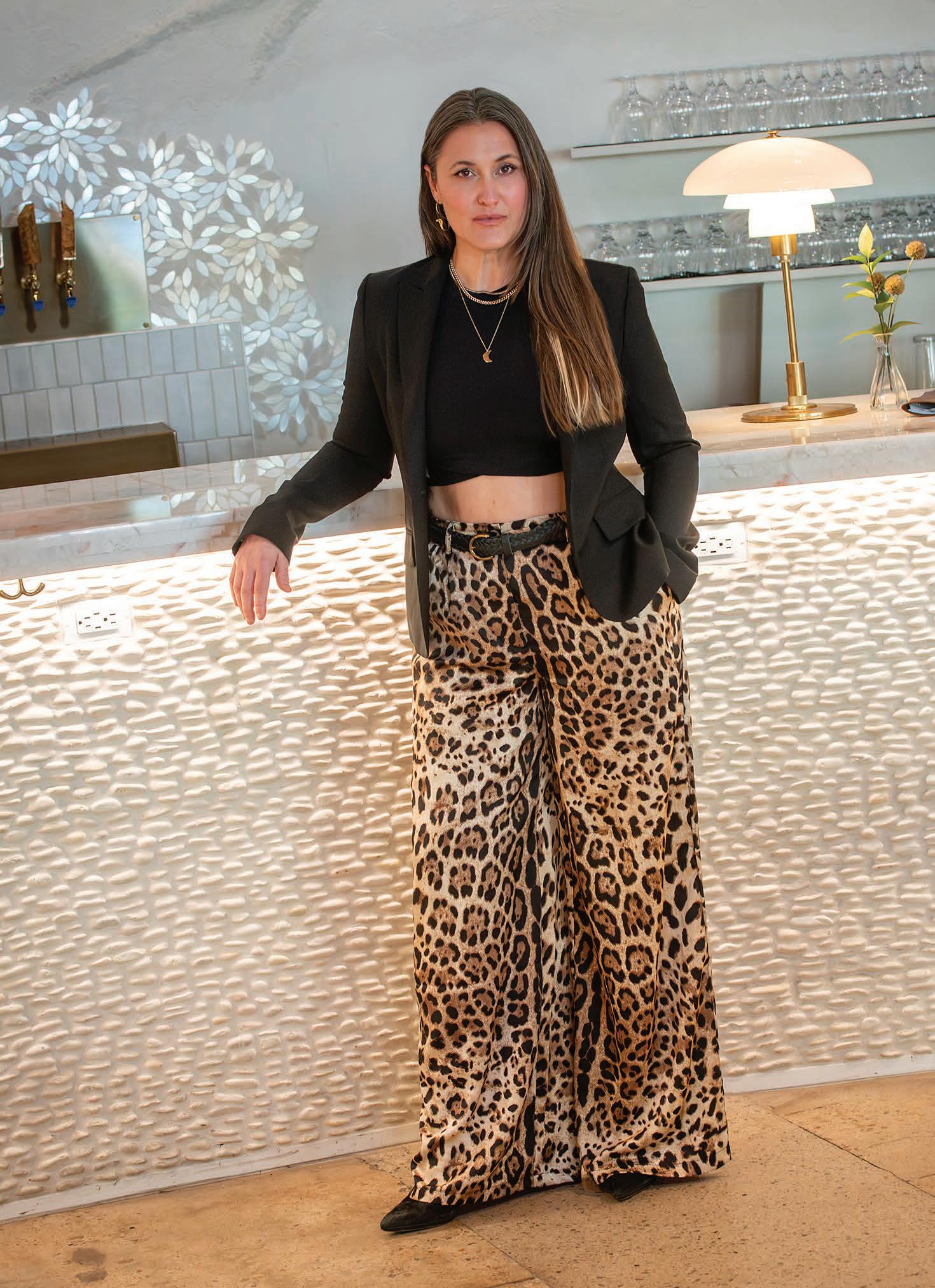
phase: scaling the business, raising capital, and potentially becoming the “United States’ cider queen.”
“Having established a strong foothold in San Diego’s hospitality scene, we are now poised for the next stage of expansion,” she said. “To realize this vision, the company is selectively seeking strategic investors who share my passion and ambition and can help scale operations, expand distribution, and bring Bivouac’s distinctive ciders to a wider market.”
In a world where law degrees often lead to predictable paths, Worm stands out as a reminder that legal training can be the foundation for something entirely unexpected. “I loved being a lawyer,” she said, “but building this business lets me use my entire brain. And that’s powerful.”
— Sarah Kellogg
Gil Ben-Ezra, JD ‘15, was elected to partnership at Meland Budwick. He is a member of the firm’s commercial litigation and financial fraud practice groups.
Irene Lee, JD ‘15, has joined McEntee Law Group in Chicago as senior attorney.
Zach Pilchen, LLM ‘15, has joined Holland & Knight as senior counsel in the firm’s public policy and regulation group in Washington, D.C. He previously served as senior legal counsel for the U.S. Environmental Protection Agency’s Office of General Counsel.
Michael Selig, JD ‘15, has joined the U.S. Securities and Exchange Commission as chief counsel of a new task force dedicated to transforming the agency’s approach toward the cryptocurrency industry. Selig is a former partner at Willkie Farr & Gallagher.
Kesete Taye, LLM ‘15, has been selected for inclusion in Marquis Who’s Who. Taye serves as a trial attorney at Harmon Linder & Rogowsky.
Haider Andazola, JD ‘16, has joined Manatt, Phelps & Phillips as counsel. He focuses his practice on strategic regulatory and public policy across the health care industry.
Aleksandra Rybicki, JD ‘16, was promoted to partner at the Washington, D.C., litigation firm Hollingsworth.
Daniel Sitter, JD ‘16, was promoted to partner at Cohen Milstein Sellers & Toll. He is a member of the firm’s employee benefits/ERISA practice.
Kristin Elia, JD ‘17, was promoted to counsel at Venable. She focuses her practice on commercial real estate matters.
Brandon Flick, JD ‘17, was appointed to serve as administrative law judge for the Federal Energy Regulatory Commission.
Kevin Sayles, JD ‘17, was elected to partnership at Bousquet Holstein, where he is a member of the firm’s tax practice group.
Paul Seidu Tanye-Kulono, LLM ‘17, was appointed the acting director-general of the Ghana Ports and Harbors Authority.
Alexander Somodevilla, JD ‘17, LLM ‘20, has joined Manatt, Phelps & Phillips. He focuses his practice on health care and life sciences.
Benjamin Christoff, LLM ‘14, was promoted to principal at Fish & Richardson.
Kirsten Nelson, JD ‘14, has joined Quinn Emanuel Urquhart & Sullivan as an associate. Nelson is a former assistant federal public defender and training attorney in Miami.
Lisa Mays, JD ‘15, was promoted to partner at Sheppard, Mullin, Richter & Hampton. She is a member of the firm’s governmental practice group, where she advises on international trade compliance and investigations.
Margaret Beasley, JD ‘15, was promoted to senior counsel at Bracewell.
Liliana Di Nola-Baron, JD ‘16, has joined the intellectual property law firm Panitch Schwarze Belisario & Nadel as counsel.
Matthew J. Michaels, JD ‘16, has returned to Barnes & Thornburg as a member of the firm’s corporate department in Los Angeles.
Nathan Richardson, JD ‘16, has joined Honigman as a partner in the firm’s litigation department in Washington, D.C.
Erica Wible, JD ‘17, has been elected a member of McNees Malamut Law. Wible is president of the board of directors of the Pennsylvania Association of Bond Lawyers.
Ryan Chowdhury, JD ‘18, was promoted to principal at Fish & Richardson.
Sacred Huff, JD ‘19, was promoted to senior associate at Kalijarvi, Chuzi, Newman & Fitch in Washington, D.C. She focuses her practice on employment law.
Matthew Knabel, JD ‘19, was promoted to principal at Fish
ALUMNI NEWSMAKERS
ALUMNI PROFILE
A Voice for the Voiceless
IN A WORLD WHERE THE POWERLESS AND THE WEAK OFTEN GO unheard, KITTY BLOCK, JD ‘90, has spent her life ensuring that the most silent of beings, domesticated and wild animals, have a resolute advocate in their corner.
“I wanted to be a lawyer for the animals,” said Block, president and CEO of Humane World for Animals, formerly Humane Society of the United States and the Humane Society International. “I knew a law degree would give me the tools I needed.”
From the moment she stepped on the GW Law campus, she had a singular purpose in mind: wield her law degree not just as a credential, but as a finely tuned instrument for change on behalf of animals. Block immersed herself in environmental and international law, joining one of the school’s first animal law groups. It was an era when animal rights were largely seen as sentimental rather than substantial.
After graduation, she joined the then Humane Society of the United States as a legal investigator and never looked back. Over the decades, she spearheaded the global expansion of Humane Society International, advocating for whales, endangered species, and farm animals on international stages. The Humane Society’s legal team has taken on government agencies, led ballot initiatives, and argued before the Supreme Court. Most recently, it defended a landmark California law banning the cruel confinement of farm animals.
“Animal issues aren’t a fringe cause,” said Block. “They are interwoven with public health, climate change, and human welfare.”
Despite leading a global organization, Block said she remains grounded in her legal training. “It’s not just about emotion,” she noted. “It’s about building the argument, doing the science, polling
ANIMAL ISSUES AREN’T A FRINGE CAUSE. THEY ARE INTERWOVEN WITH PUBLIC HEALTH, CLIMATE CHANGE, AND HUMAN WELFARE.
— Kitty Block

the public—making the case.” That mindset has helped turn oncemarginal issues into matters debated at the highest courts.
She’s a long way from her childhood in Nahant, Mass., where she was surrounded by stray animals and songbirds and growing an early sense for justice for animals. With her mother’s guidance, she made her first legislative phone calls as a child in support of the Animal Welfare Act.
Block said her life is a lesson for law students today who may wonder if it’s possible to feel deeply about a cause and still excel in the law. “If I think about my little girl self or even who I was in law school, this is not who I’d imagined I would become,” said Block, who has been with Humane World for Animals for 33 years. “It wouldn’t even be believable.”
— Sarah Kellogg
& Richardson. He concentrates his practice on patent prosecution and strategy in the life sciences sector.
Anthony Patrone, JD ‘19, was appointed legal advisor in the Office of the Chairman of the Federal Communications Commission.
2020s
Ali Bazzi, JD ‘20, has joined the Varnum law firm as a member of the firm’s corporate practice team in the Birmingham office.
Briana Imran, JD ‘20, an employment and civil rights attorney, has joined Washington, D.C.-based Kalijarvi, Chuzi, Newman & Fi.
Jaylla Brown, JD ‘22, has joined Larson as an associate in the firm’s D.C. office.
Preston O. Eagan, JD ‘23, has joined Chamberlain Hrdlicka’s Atlanta office as a member of the firm’s tax controversy and litigation practice.
John Darby, JD ‘24, has joined Bradley Arant Boult Cummings’ corporate and securities
practice group in the firm’s Birmingham office.
Alexandra E. Patterson, JD ‘24, has joined the Washington, D.C.-based litigation firm Hollingsworth as an associate.
Joseph Sinopoli, JD ‘24, has joined Fish and Richardson as an associate in the firm’s intellectual property practice, where he focuses on patent litigation.
Jaden Taylor, JD ‘24, has joined Bradley Arant Boult Cummings’ corporate and securities practice group in the firm’s Nashville office.
ALUMNI NEWSMAKERS
in memoriam
The Hon. Joyce Hens Green, JD ‘51, Oct. 10, 2024
Martin Kirsch, JD ‘51, Nov. 24, 2024
Roy T. Englert, LLM ‘53, Dec. 11, 2024
Harry F. Manbeck, JD ‘53, Feb. 19, 2025
Sheldon Witcoff, JD ‘53, Feb. 21, 2025
Walter Bernkopf, JD ‘57, March 24, 2025
Theodore Pedas, JD ‘57, March 21, 2025
George O. Saile, JD ‘59, Oct. 25, 2024
Gordon Christenson, JD ‘61, March 13, 2025
Charles F. Geschickter, Jr., JD ‘61, Sept. 19, 2024
William S. Hochman, JD ‘62, Sept. 30, 2024
Ronald Natalie, JD ‘62, Feb. 7, 2025
Hal Cooper, JD ‘63, Feb. 25, 2025
Thomas Lampe, JD ‘63, Nov. 9, 2024
Douglas V. Rigler, JD ‘63, Aug. 22, 2024
Patrick Henry James, JD ‘64, Oct. 25, 2024
Raymond F. Altman, JD ‘66, Oct. 12, 2024
Gary Glasgow, JD ‘66, Feb. 28, 2025
Mary Anita Nordale, JD ‘66, Dec. 22, 2024
Thomas Currier, JD ‘67, Feb. 05, 2025
Leonard J. Suchanek, LLM ‘67, Oct. 5, 2024
Hon. Donald Haddock, LLM ‘68, Dec. 23, 2024
Henry Nickel, JD ‘68, March 20, 2025
Marshall Kresman, JD ‘69, Dec. 11, 2024
Robert L. Chase, LLM ‘70, Jan. 19, 2025
Richard A. Killworth, JD ‘70, LLM ‘72, Oct. 18, 2024
James R. Kruse, JD ‘70, Jan. 28, 2025
Robert David Bustard, JD ‘71, Dec. 20, 2024
Lorin Luchs, JD ‘71, March 17, 2025
Robert A. Rowland III, JD ‘72, Oct. 15, 2024
Donald G. Smith, JD ‘72, Sept. 27, 2024
Fred Wolf III, JD ‘72, Dec. 23, 2024
Ronald S. Frankel, LLM ‘73, Oct. 3, 2024
Alice T. Petizon, JD ‘73, Oct. 3, 2024
Daniel Ray Ferry, LLM ‘74, Nov. 12, 2024
Charles Fitzgerald Stuart, Jr., JD ‘78, Jan. 2, 2025
Dana Frances Arnold, JD ‘81, Jan. 3, 2025
Mary Krug, JD ‘82, Nov. 1, 2024
Kenneth Johnson, JD ‘84, Dec. 20, 2024
Walton Garrett Liu, LLM ‘85, Nov. 5, 2024
Leslie Lehnert, JD ‘88, Sept. 20, 2024
Ronald Krasnow, JD ‘90, March 20, 2025
Mark Toohey, JD ‘95, Nov. 23, 2024
Faculty
Professor Steve Charnowitz, March 23, 2025
alumni bookshelf
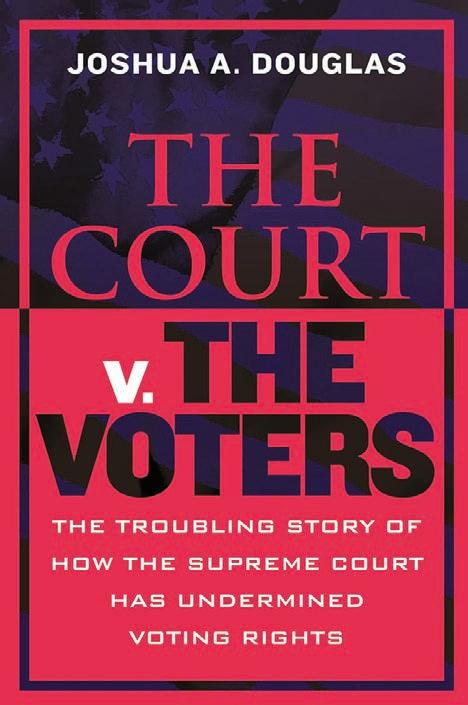
The Court v. The Voters: The Troubling Story of How the Supreme Court Has Undermined Voting Rights
JOSHUA DOUGLAS, JD ’07, provides a powerful reminder of the tangible, real-world effects of the Court’s voting rights decisions in his new book, The Court v. The Voters: The Troubling Story of How the Supreme Court Has Undermined Voting Rights
A University of Kentucky law professor, Douglas takes us behind the scenes of significant cases in voting rights—some surprising and unknown, some familiar—to investigate the historic crossroads that have irrevocably changed our elections and the nation. The book provides an urgent and gripping look at the erosion of voting rights and its implications for democracy, told through the stories of nine Supreme Court decisions—and the next looming case.
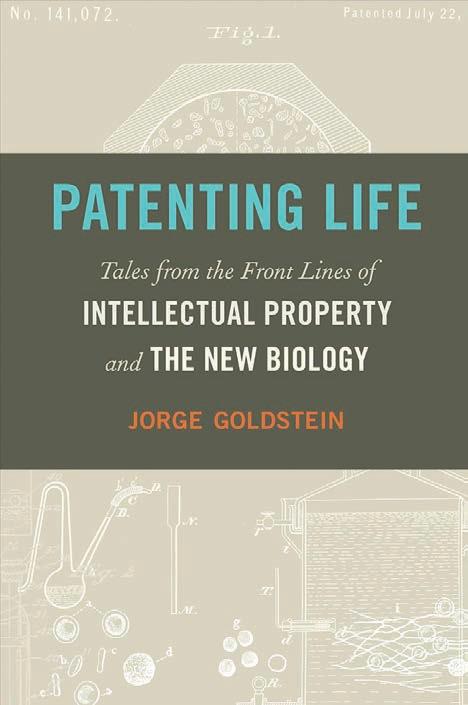
Patenting Life: Tales from the Front Lines of Intellectual Property and the New Biology
JORGE GOLDSTEIN, JD ’82, one of the world’s leading biotech lawyers, tells the story of the commercialization of biology and the legal issues raised in the field of biotechnology patenting, in his new book, Patenting Life: Tales from the Front Lines of Intellectual Property and the New Biology. Covering the early days of recombinant DNA science to the present, Goldstein shares patent cases from his own career and those of others involving blockbuster biological drugs, aseptic mosquitoes, genetically engineered cows, and CRISPR, the modern gene-editing technology that promises to vanquish congenital diseases such as sickle cell anemia. Goldstein is a founder and senior director of Sterne, Kessler, Goldstein & Fox, a prominent intellectual property law firm in Washington, D.C.

More Than Play: How Law, Policy, and Politics Shape American Youth Sport
Tens of millions of children in the United States participate in youth sports, yet most are driven to quit by the time they enter adolescence, and many more are sidelined by the high financial burden. In More Than Play: How Law, Policy, and Politics Shape American Youth Sport, leading sports law scholar DIONNE KOLLER, JD ’93, examines the understudied area of American youth sport governance and the problems that plague it, and presents realistic and achievable solutions. Koller is a professor of law and director of the Center for Sport and the Law at the University of Baltimore.

Yours,
Eventually: A Novel
In her debut novel, NURA MAZNAVI, JD ’03, tells the story of a Pakistani-American
Muslim-centered romance within a tight-knit California community. Yours, Eventually centers on a successful young woman doctor who gets an unexpected second chance at love with her college sweetheart. A fresh take on love and self-discovery, the book is about finding the courage to follow your heart and coming to the realization that living your life according to what other people think is no life at all. Maznavi is a writer, lawyer, and editor of the groundbreaking anthologies Love, InshAllah: The Secret Love Lives of American Muslim Women and Salaam, Love: American Muslim Men on Love, Sex & Intimacy.
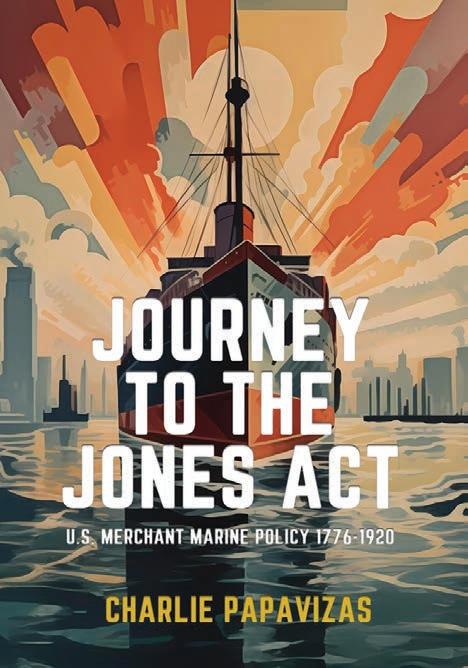
Journey to the Jones ACT: U.S. Merchant Marine Policy 1776-1920
In in his new book, Journey to the Jones Act, accomplished national maritime lawyer CHARLIE PAPAVIZAS, JD ‘84, captures the rich history of the Jones Act—a far-reaching U.S. maritime policy law enacted in 1920 that restricts water transportation of cargo between U.S. ports to ships that are U.S.-owned, U.S.-crewed, U.S.registered, and U.S.-built. The book traces the history leading up to the passage of the Jones Act—telling the story of America’s emergence as a maritime power and the people, politics, and events that shaped it over the past 250 years. Papavizas is chair of Winston & Strawn’s topranked maritime and admiralty practice, where he has served as a partner since 1995
CONGRATS, CLASS OF 2025!
On May 18th, GW Law celebrated the achievements of the Class of 2025 at the law school’s 158th Commencement.
“Perhaps now more than ever the world needs lawyers who are dedicated to advancing the rule of law, protecting democracy, and creating a more just society,” said Dean Dayna Bowen Matthew in her charge to the graduates.
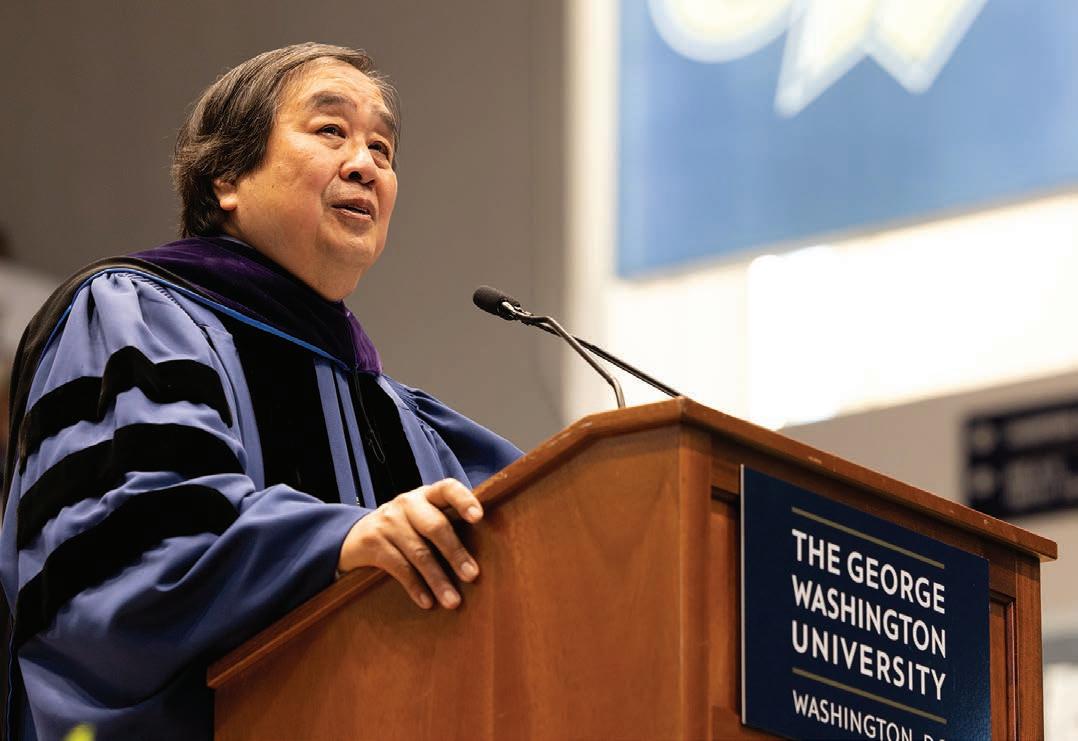

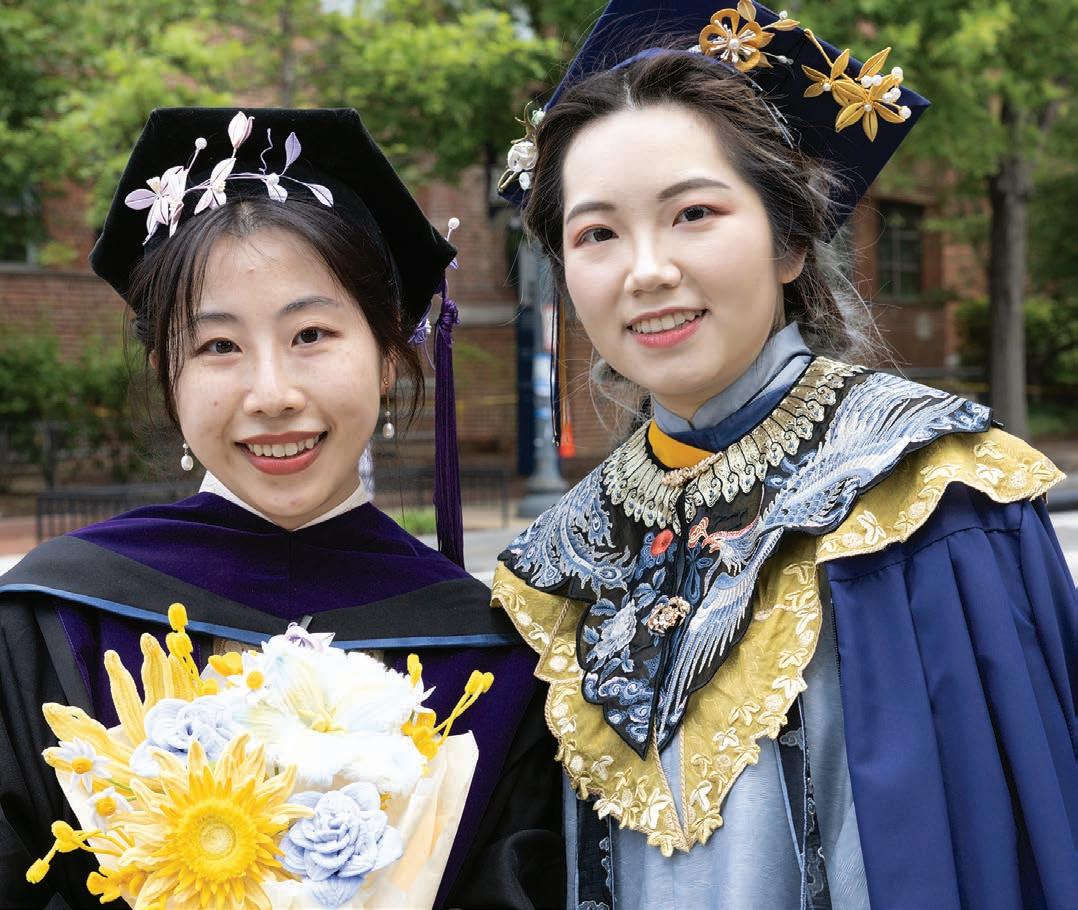
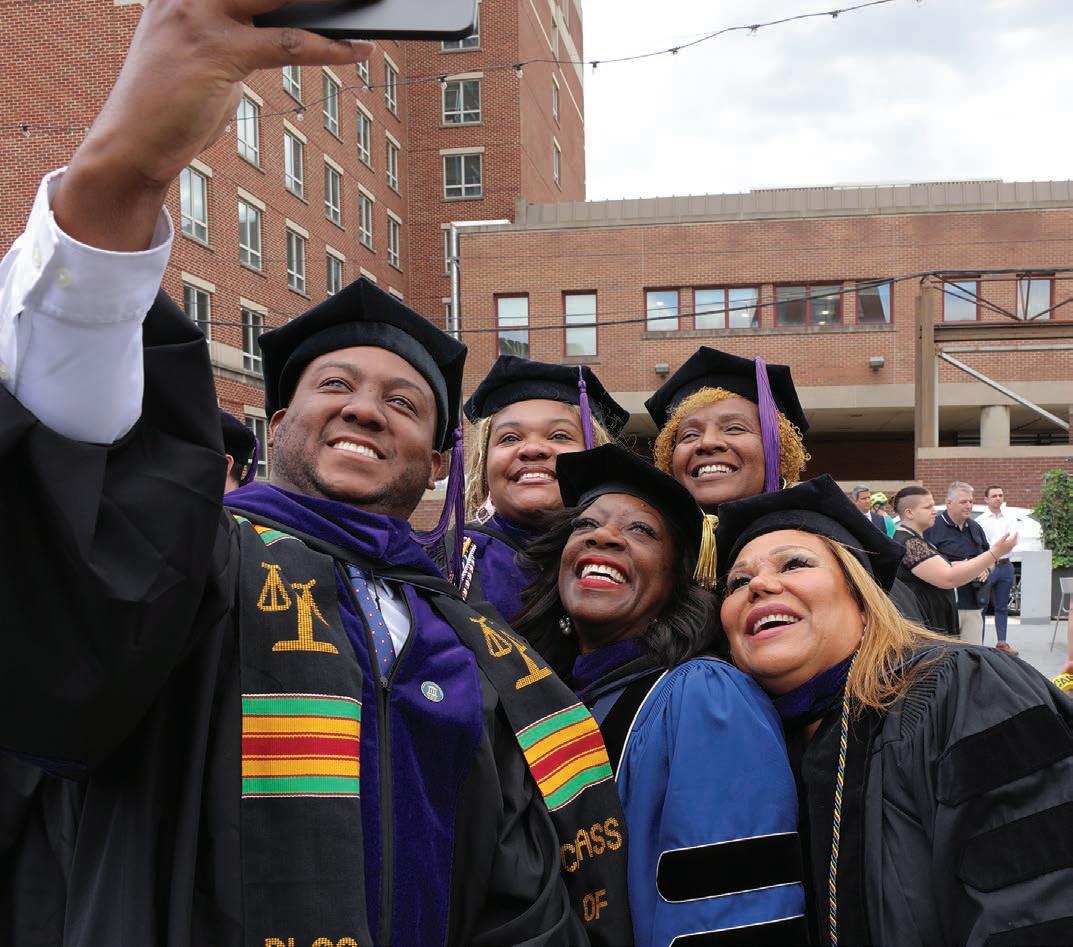
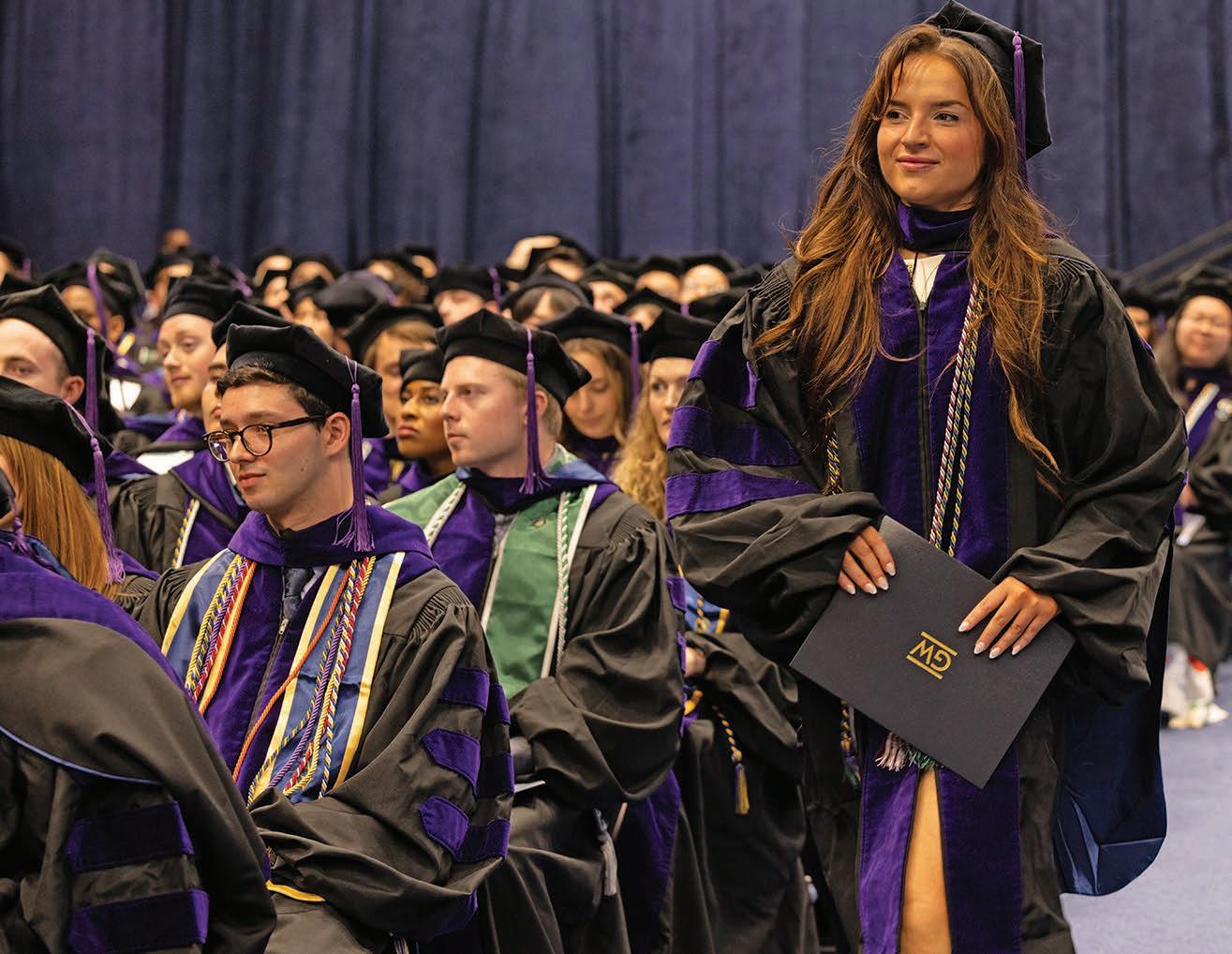
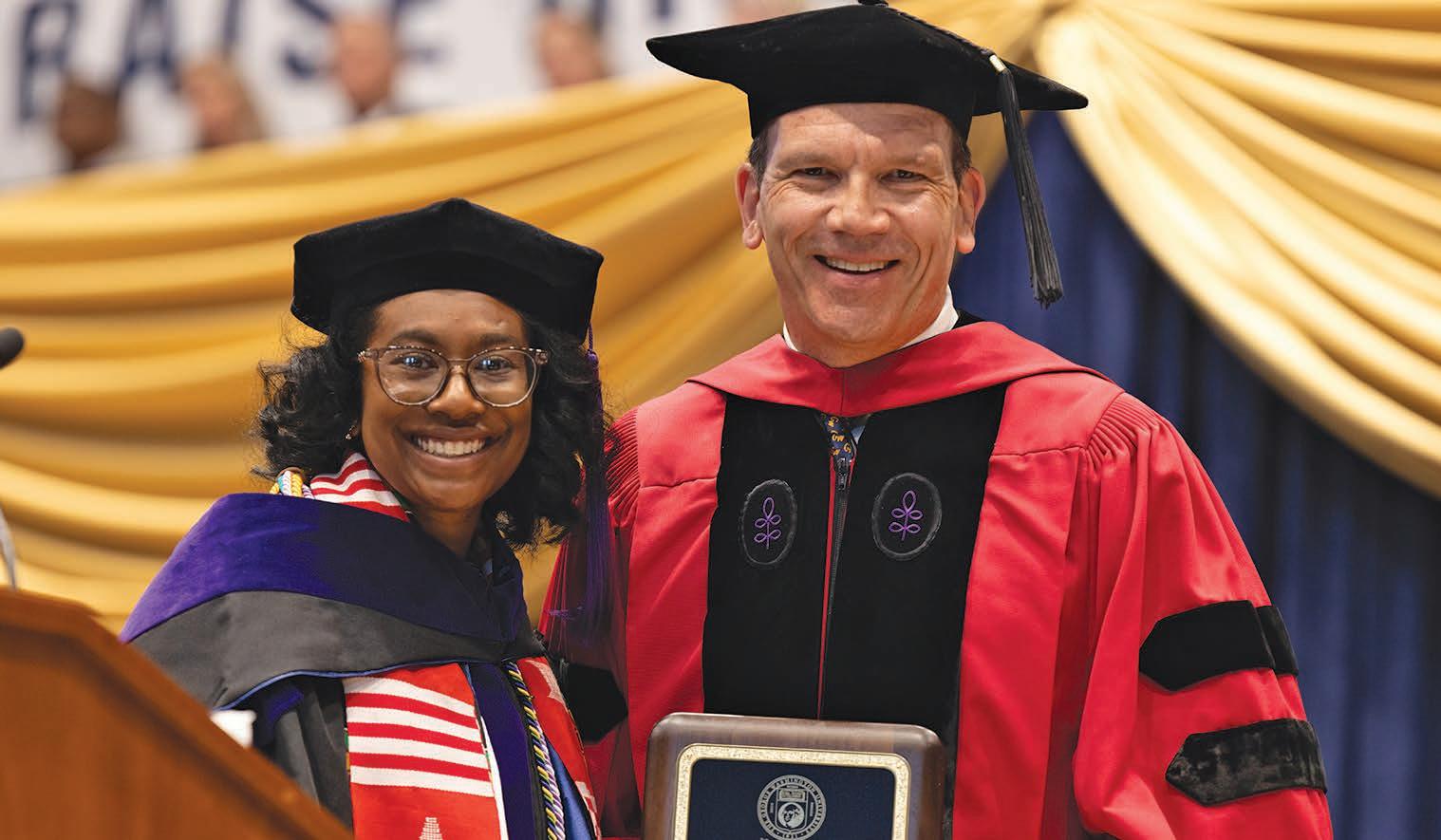
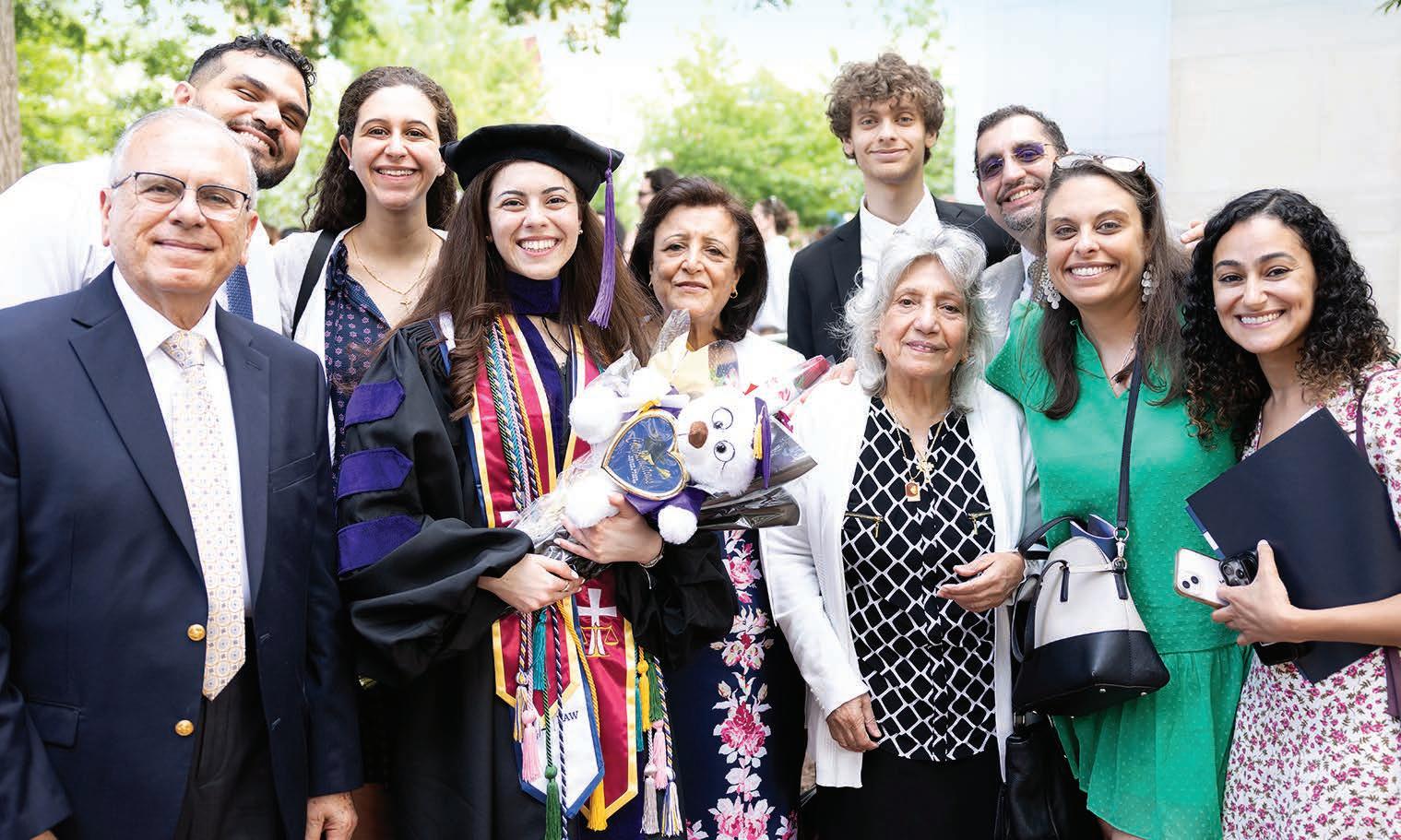
“We need you to help solve the world’s most pressing challenges.” — Dean Dayna Bowen Matthew
“Courage is contagious,” said Commencement speaker Harold Hongju Koh in his keynote address.
CELEBRATING 1966, 1971, 1976,1981, 1986, 1991 , 1996,2001, 2006, 2011, 2016, AND 2021.

JUNE 5-6, 2026
